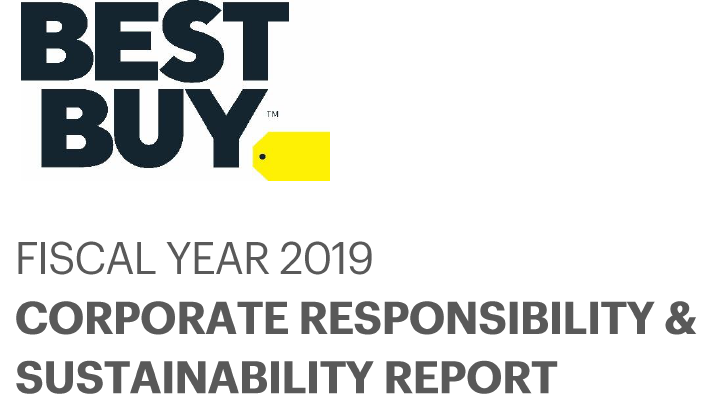
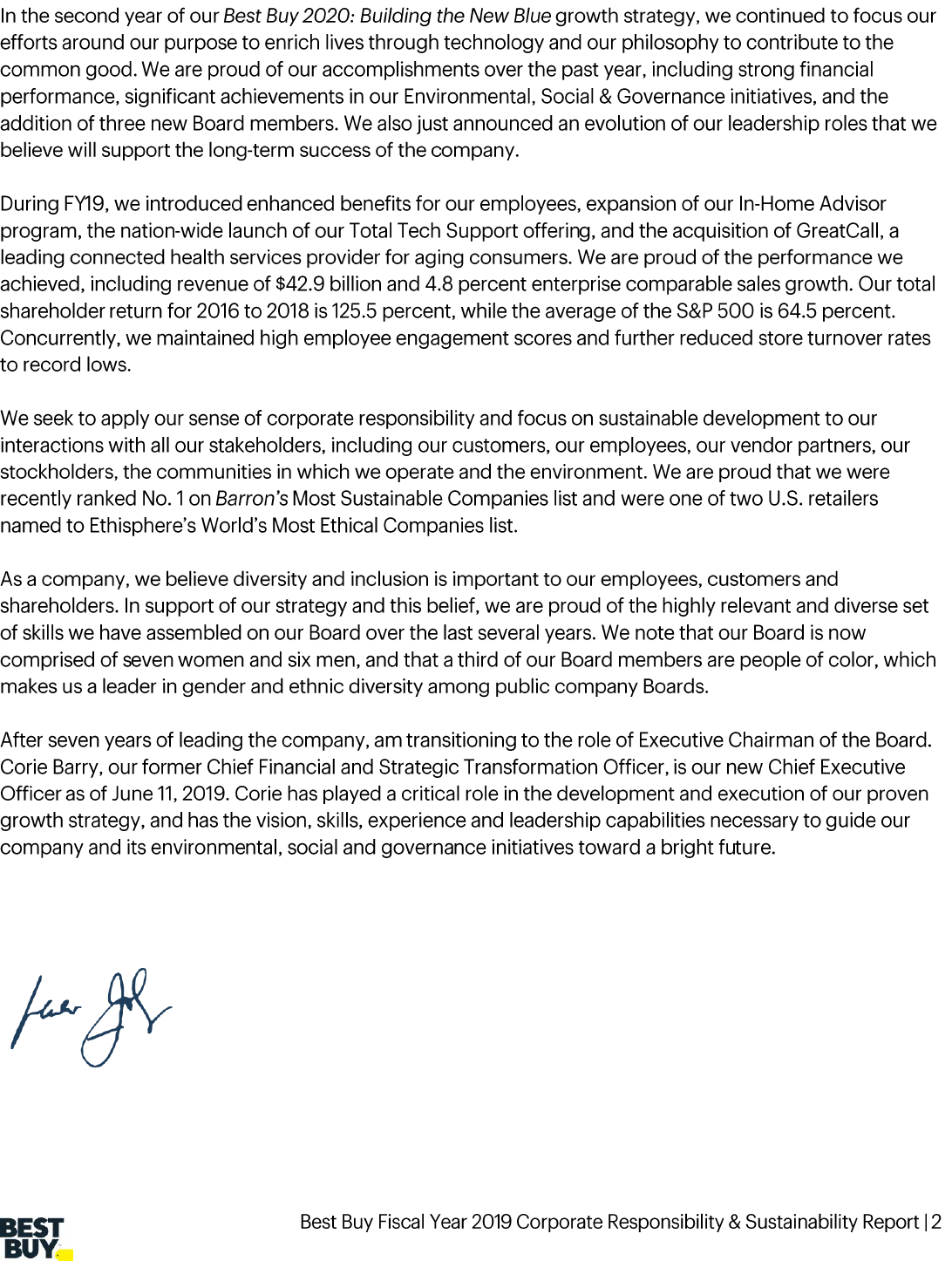
Respectfully,
Hubert Joly
Executive Chairman
Best Buy Co., Inc.
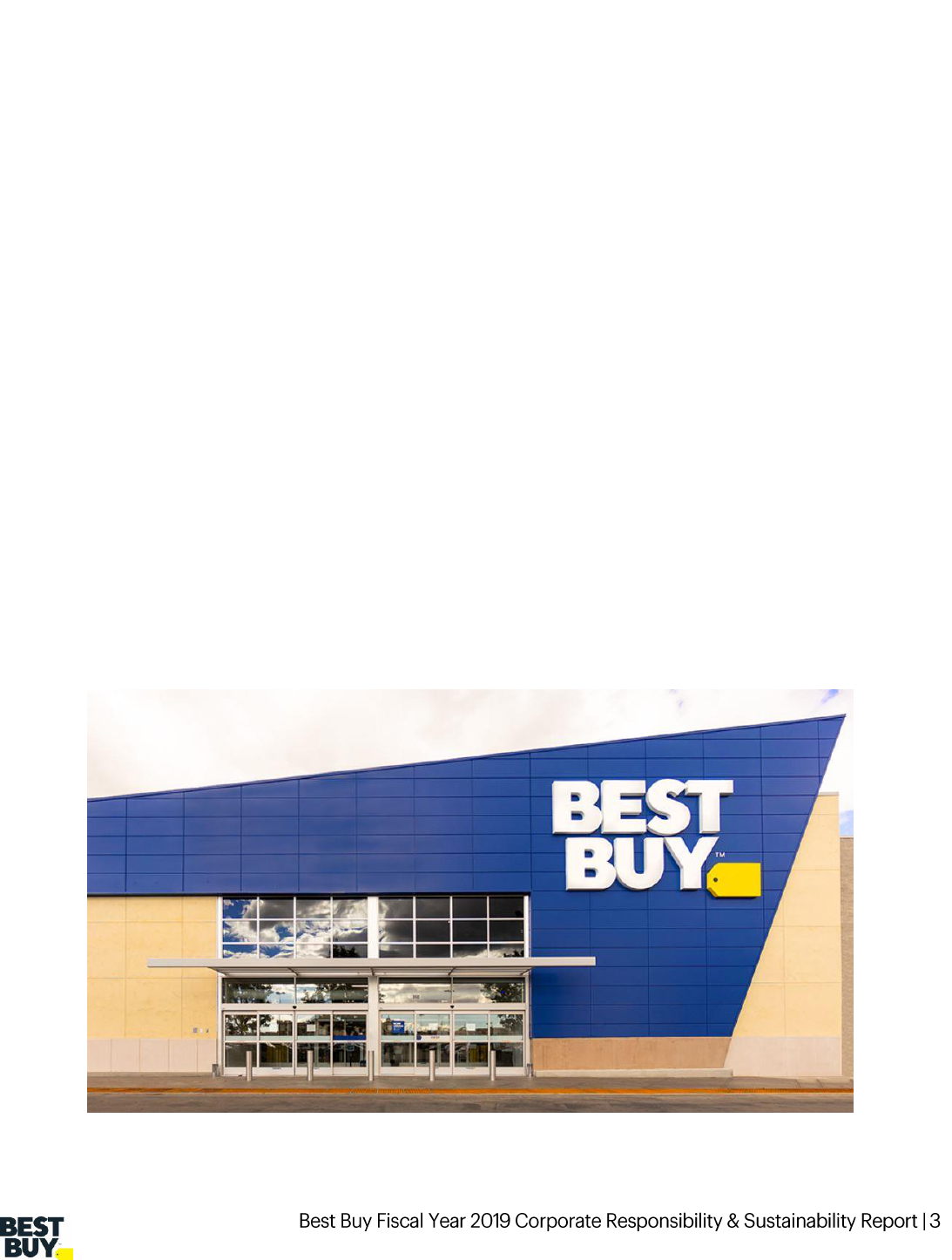
About Best Buy.
We at Best Buy work hard every day to enrich the lives of consumers through technology, whether they
come to us online, visit our stores or invite us into their homes. We do this by solving technology problems
and addressing key human needs across a range of areas, including productivity, communication, security
and health.
The company has operations in the U.S., where more than 70 percent of the population lives within 15
minutes of a Best Buy store, as well as in Canada and Mexico, where Best Buy has a physical and online
presence.
Headquartered in Richfield, Minnesota, Best Buy was founded by Richard Schulze in 1966. It was called
Sound of Music (incorporated in Minnesota as Sound of Music, Inc.) before the name changed to Best Buy
in 1983.
Today, Best Buy has more than 1,000 large-format stores across North America. During FY19, the company
employed approximately 125,000 people and generated $42.9 billion in revenue.
In the U.S., our operations consist of Best Buy and BestBuy.com, Best Buy Business, Best Buy Express, Geek
Squad, Magnolia Home Theater, and Pacific Kitchen & Home.
The International segment is composed of all operations in Canada and Mexico under the brand names
Best Buy, Best Buy Express, Best Buy Mobile and Geek Squad and the domain names BestBuy.ca and
BestBuy.com.mx.
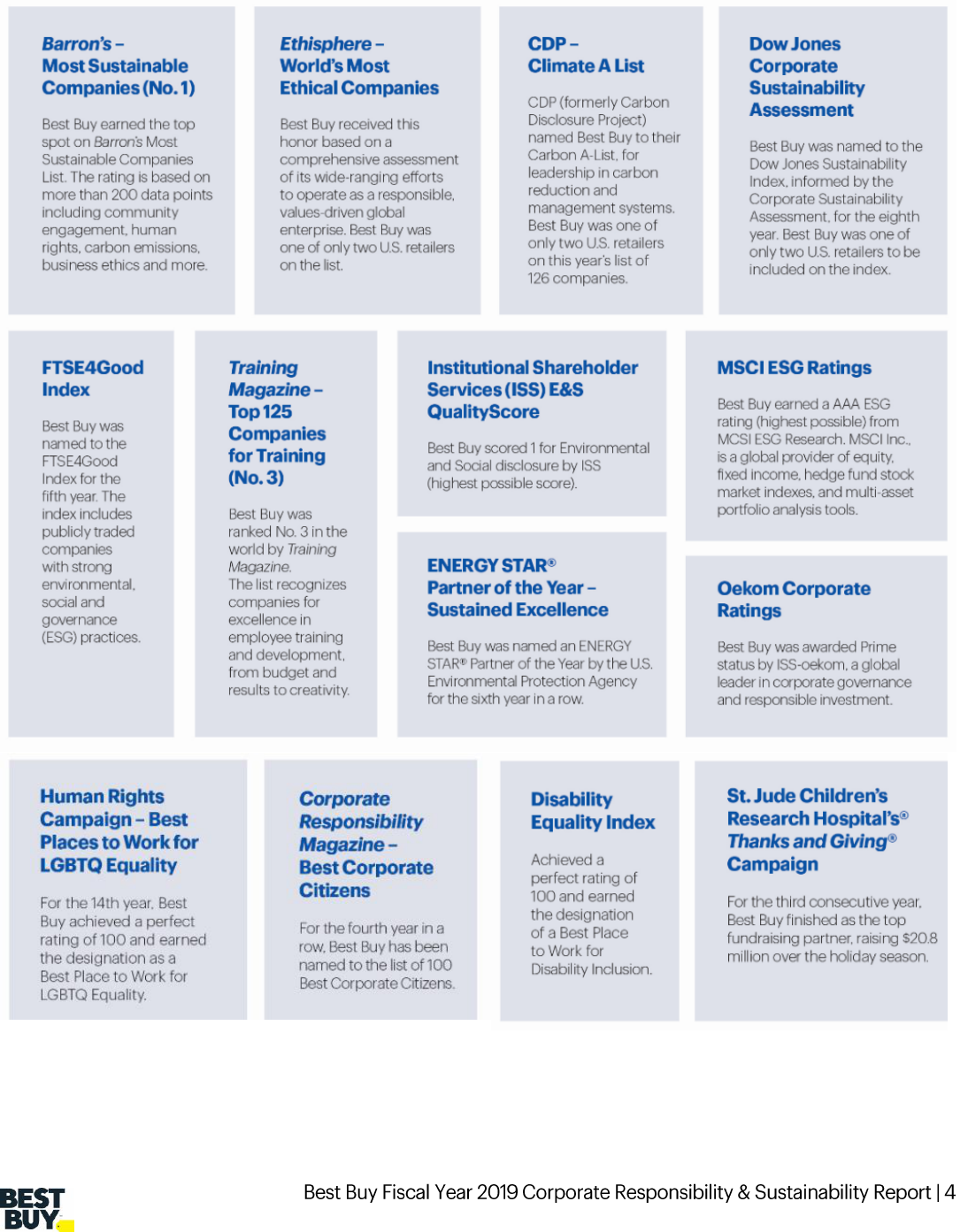
Awards and recognition.

Strategy.
In FY19, we made significant progress in implementing our Best Buy 2020 strategy to enrich lives through
technology and further develop our competitive differentiation by expanding what we do for our
customers and how we interact with them.
The first example is the launch of our Total Tech Support program. Having a service that provides members
unlimited Geek Squad support for all their technology no matter where or when they bought it, is a
compelling value proposition for our members. We also expanded our In-Home Advisor program from 300
advisors to about 530 advisors and provided more than 175,000 free, in-home consultations to customers
across the nation. In health, we acquired a leading connected health services provider for aging
consumers, GreatCall, and took a tangible step forward in our strategy to help seniors live longer in their
homes with the help of technology. We continued to elevate the customer experience around product
fulfillment, enabled by the advancement of our supply chain transformation.
In parallel to the customer experience work, we continued to drive efficiencies and reduce costs in order to
fund investments and offset pressures. During FY19, we achieved $265 million in annualized cost
reductions and efficiencies, bringing the cumulative total to $500 million towards our current goal set in
the second quarter of FY18 to reach $600 million by the end of FY21.
In addition to these accomplishments, we are proud of our progress in advancing our Corporate
Responsibility and Sustainability efforts. In fact, we were just named number one on Barron’s annual 100
Most Sustainable Companies list.
Looking ahead, we are focused on pursuing the opportunities in front of us to enrich lives through
technology and provide services and solutions that solve real customer needs and build deeper customer
relationships, and the related value creation opportunities that this entails.
In FY20, our priorities include increasing our Total Tech Support member base, growing our Health
business and continuing to expand our In-Home Advisor program. We will also continue to innovate and
design multi-channel experiences across our website, app and other channels in ways that enhance the
experience across online and physical shopping and continue with our supply chain transformation,
including using automation and process improvements to expand fulfillment options, increase delivery
speed and improve delivery and installation. In addition, as has been our brand over the last several years,
we will keep driving cost reductions and efficiencies throughout the business.

Impacts, risks and opportunities.
Best Buy is committed to being a responsible corporation. As a retailer and a contract manufacturer of
private-label products (which we call Exclusive Brands), we recognize that social, environmental and
economic impacts occur throughout our product value chain. As such, our responsibility extends from the
responsible sourcing of raw materials to the reuse and proper recycling of materials after the product life
has ended.
We believe the largest impact we make as an employer is providing jobs in local communities in the U.S.,
Canada and Mexico.
The most relevant sustainability risk, as stated in our FY19 Annual Report on form 10-K, relates to natural
disasters and changes in the climate. The risk or actual occurrence of various catastrophic events could
materially adversely affect our financial performance. Such events could be caused by, for example,
natural disasters or extreme weather. These events can negatively impact our workforce, prevent
employees and customers from reaching our stores and properties, and disrupt or disable portions of our
supply chain and distribution network. Because of these catastrophic events, we might endure interruption
to our operations or losses of property, equipment or inventory, which would adversely affect our revenue
and profitability.
Among our sustainability priorites and opportunities is supporting customers through the life of their
products. Our Geek Squad Agents extend the life of products through repair services. We provide a
second useful life through the Best Buy Trade-In Program. And we continue to operate the most
comprehensive consumer electronics recycling program in the U.S. Providing these convenient options to
customers creates a competitive opportunity for Best Buy. Additionally, carbon reduction is another key
sustainability priority and opportunity.
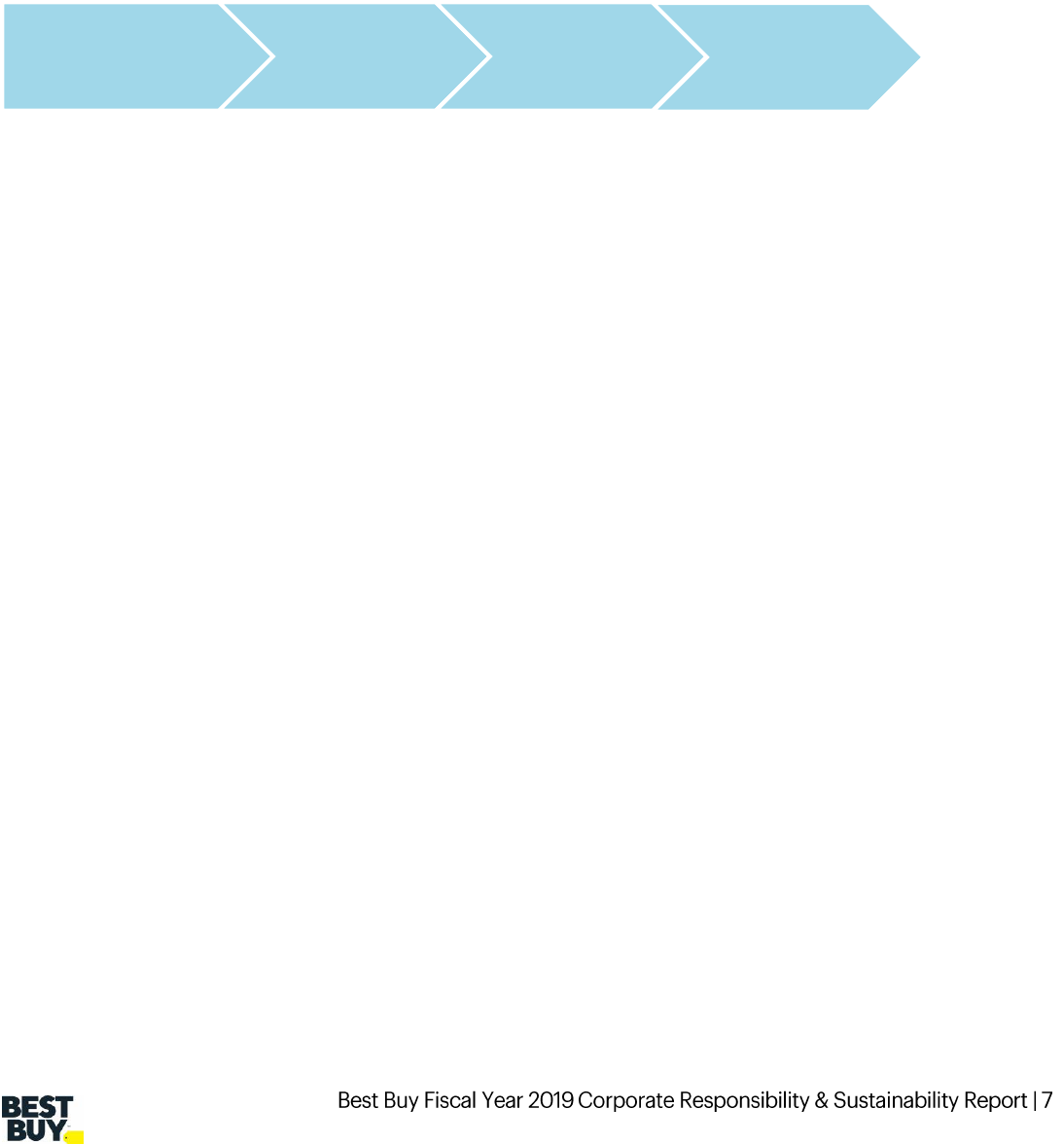
Focus on priority issues.
Utilizing internal and external points of view, in FY17 and FY18 we partnered with Corporate Citizenship to
conduct a sustainability materiality assessment. By following the steps outlined below, we set out to find
the intersection of the areas in which stakeholders presented opportunities where Best Buy could lead and
significantly affect our business. We will revisit our material issues in FY20 to take into consideration our
new acquisitions and our increasing focus on health.
Identification
The first step in our materiality process is identifying potential issues. Our universe of issues draws from
several inputs that include past materiality assessments, activist communication, shareholder proposals,
industry trends, peer benchmarking, and laws and regulations.
Prioritization
The second step is prioritizing issues based on significant economic, environmental and social impacts as
shared by our stakeholders.
We elicited feedback by interviewing our executives and surveying leaders within the organization
including members of the following teams: Compliance, Consumer Insights, Exclusive Brands, Human
Resources, Legal, Marketing, Merchandising, Public Affairs, Real Estate, Services, Sourcing and Supply
Chain.
We also surveyed external stakeholders to gain an understanding of how our sustainability efforts are
perceived, and on which issues they believe Best Buy should focus. In addition to a survey, select external
stakeholders were interviewed for a deeper understanding of their point of view.
Validation
In this step, the Corporate Responsibility & Sustainability team reviews the results and sets the priority
issues.
Review
The final step in our materiality cycle is reviewing the Corporate Responsibility Report with leaders and
asking for feedback from internal and external stakeholders. The report is presented to the Best Buy Board
of Directors upon completion each June. We look forward to experiencing continuous improvement of our
report through the review process.
Identification
Prioritization
Validation
Review
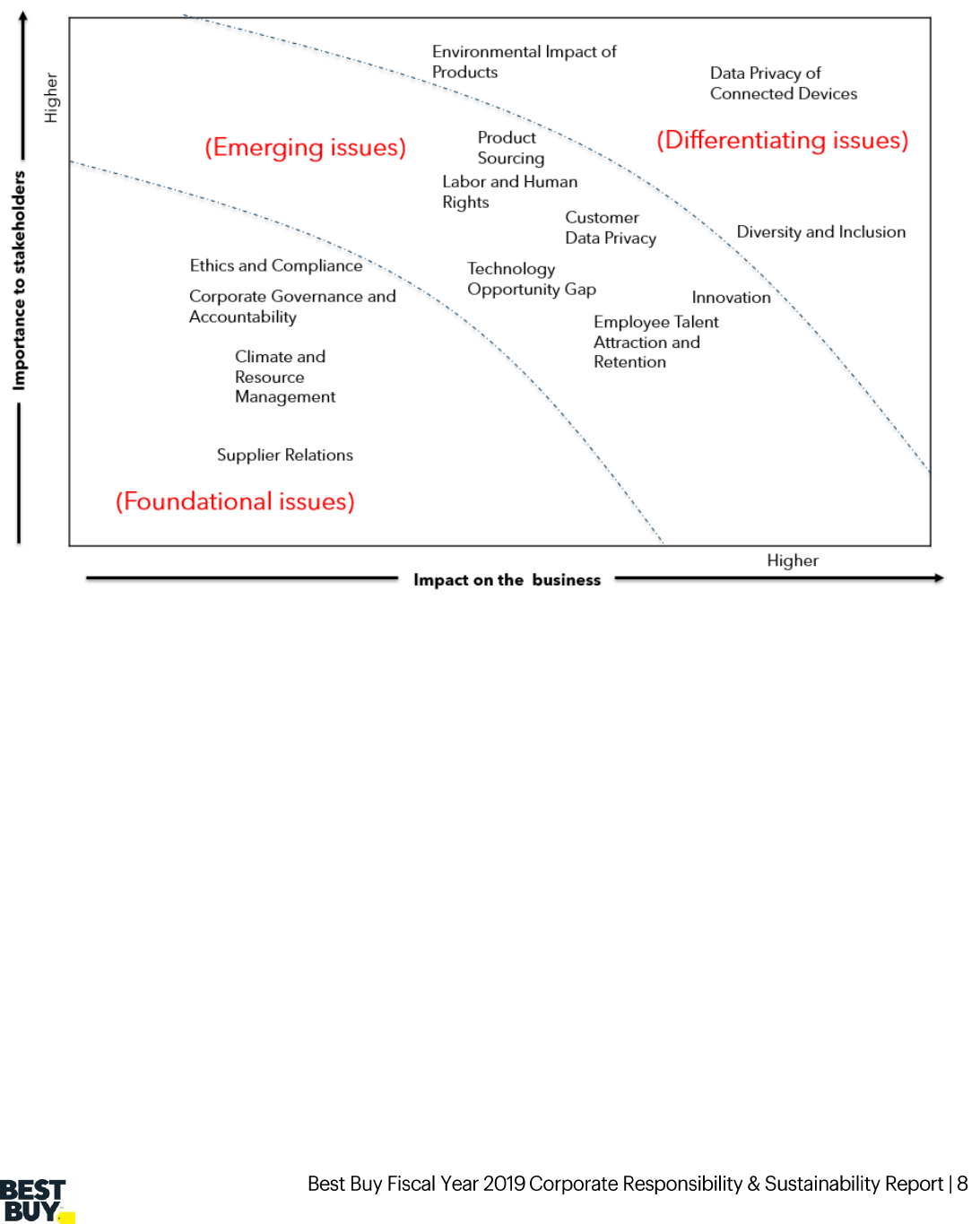
Issues matrix.
Based on the surveys and interviews, the issues were plotted on a matrix based on a five-year outlook. All of
the issues listed are of high importance to both external stakeholders and our business, however, the
issues were categorized by the degree to which internal and external stakeholders believe we should
intensify our efforts to grow our business.
o
o
o
o
o Adds emphasis on the differentiating issues
o Ensure working groups are established
o Set goals/measurement for differentiating issues
o Leverage to push work forward
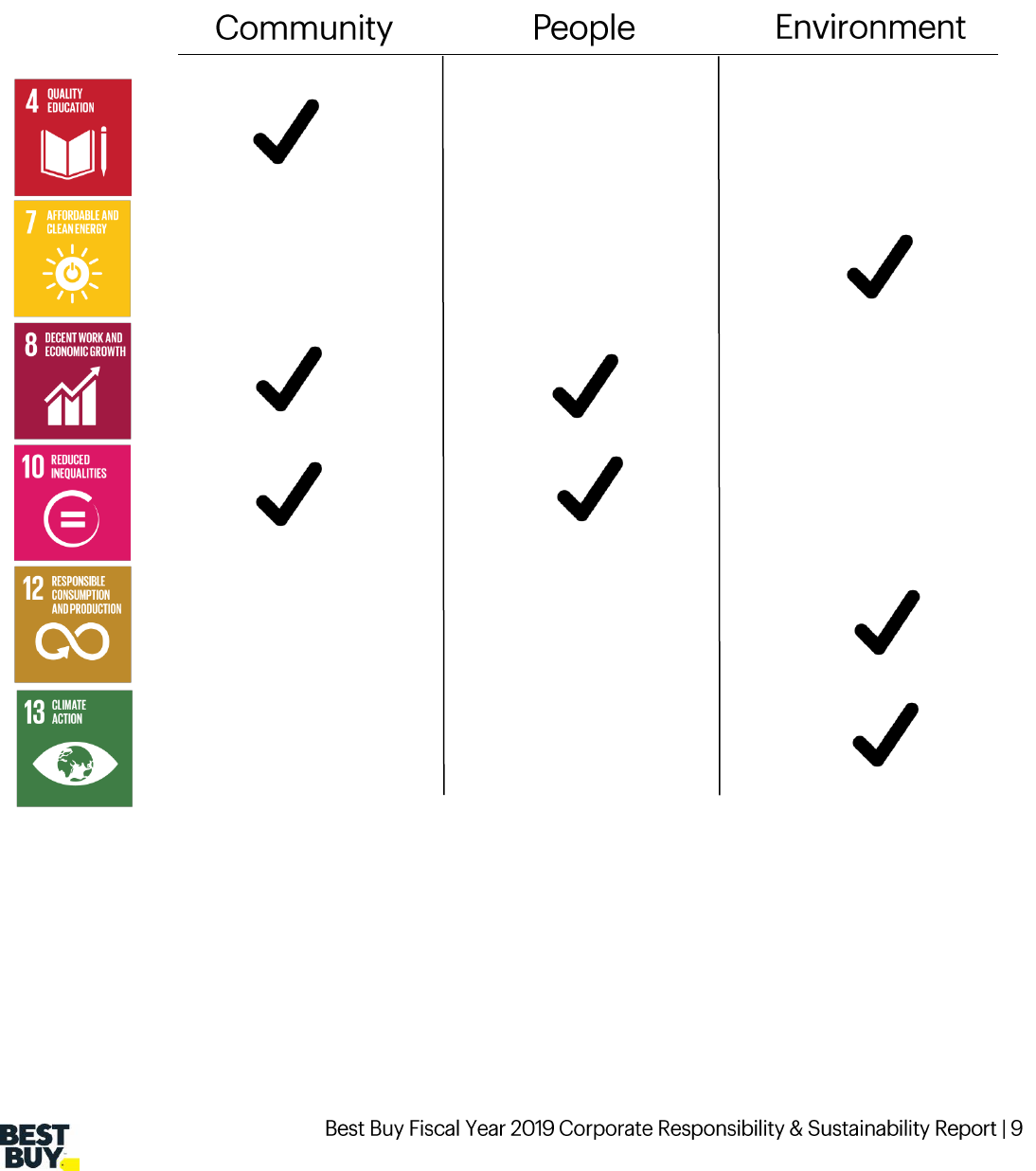
Aligning with Sustainable Development Goals.
The United Nations Sustainable Development Goals have been widely accepted as collective aspirational
goals. While Best Buy is not currently a member of the United Nations Global Compact, we embrace the
objectives and many of our programs directly support the goals as shown below.

Stakeholder engagement.
We form relationships with the many people and organizations that have a collective stake in what we do.
We interact daily and in a variety of ways with our employees, our customers and our communities. We also
actively engage in dialogue with external organizations that provide valuable insights and challenge us to
grow.
Our sustainability stakeholder engagement strategy continues to evolve as we concentrate on building
relationships within our three priority areas: Community, People and Environment.
• Best Buy employees participate in a formal engagement survey every year, supplemented by
regular performance reviews and an interactive internal communication site called The Employee
Hub;
• In addition to our direct customer conversations, we regularly survey our customers and individuals
who chose to not purchase from us in order to elicit feedback relating to their overall satisfaction
with Best Buy;
• We have regular interaction with elected officials and staff at the local, state and federal levels,
government agencies and associations on issues that affect our business;
• We have ongoing contact with our investors through calls and meetings, stakeholder councils and
analyst surveys where we are able to disclose specific sustainability information;
• We maintain relationships with non-governmental organizations (NGOs), such as industry
organizations, activists and community nonprofits, to advance the progress in our focus areas; and
• We partner with our product vendors and manufacturing suppliers to innovate and bring additional
business value.

Association memberships.
Aspen Institute
Business for Social Responsibility (BSR)
Business Renewables Center
Business Roundtable
Carbon Disclosure Project (CDP) Reporter Services
Ceres
Consumer Technology Association (CTA)
Council of State Retail Associations
Environmental Initiative – Minnesota Sustainable Growth Coalition
Ethics & Compliance Initiative (ECI)
Ethisphere
Future of Privacy Forum
GreenBiz Executive Network Member
Green Chemistry and Commerce Council (GC3) – Retail Leadership Council
International Association of Privacy Professionals (IAPP)
International Consumer Product Health and Safety Organization
Issues Management Council
National Association of Environmental Managers (NAEM)
National Center for Electronics Recycling
Net Impact – Corporate Advisory Council
Public Affairs Council – Board of Directors
Responsible Business Alliance – Board of Directors
Responsible Labor Initiative
Responsible Minerals Initiative – Chair, Steering Committee
Retail Industry Leaders Association (RILA) – Board of Directors and several working groups
Society of Corporate Secretaries and Governance Professionals
Sustainable Brands
World Resources Institute – Customer Consultative Group and Clean Power Council

About this report.
Store Development.
We had 1,187 large-format and 51 small-format stores throughout our Domestic and International segments
at the end of FY19. Our stores are a vital component of our multi-channel strategy and we believe they are
an important competitive advantage. We have the ability to ship from all of our Best Buy stores in the U.S.
and all of our large-format stores in Canada. Customers may also elect to pick up orders initiated online in
any of our stores. Beginning in 2013, we opened vendor store within-a-store concepts to enable closer
vendor partnerships and a higher quality customer experience. In FY20 and beyond, we will continue to
look for opportunities to optimize our store space, renegotiate leases and selectively open or close
locations to support our operations.
On March 1, 2018, we announced our intent to close all of our 257 remaining Best Buy Mobile stand-alone
stores in the U.S., and all remaining stores were closed during the second quarter of FY19. The mobile
stores comprised only 1 percent of square footage and generated less than 1 percent of revenue.
Report Timing.
Best Buy publishes a yearly Corporate Responsibility & Sustainability Report. This report covers FY19 (Feb.
4, 2018 – Feb. 2, 2019). Our previous report covering FY18 was released in June 2018.
Verification.
An independent third-party organization (POINT380) verifies 100 percent of our Scope 1, 2 and 3 carbon
emissions using the ISO14064-3 standard.
Boundaries.
This report includes 99 percent of our operations in the U.S., Canada and Mexico.
The Responsible Sourcing section of this report includes our non-U.S. Exclusive Brands contracted
suppliers.
On October 1, 2018, we acquired all of the outstanding shares of GreatCall, Inc. ("GreatCall"), a leading
connected health services provider for aging consumers that offers easy-to-use mobile products and
connected devices.
For more information and full financial disclosures, please see the Best Buy FY19 Annual Report on Form
10-K at Investors.BestBuy.com.
This report has been prepared in accordance with the GRI Standards: Core option. Feedback about this
report is welcome at CorporateResponsibility@BestBuy.com.
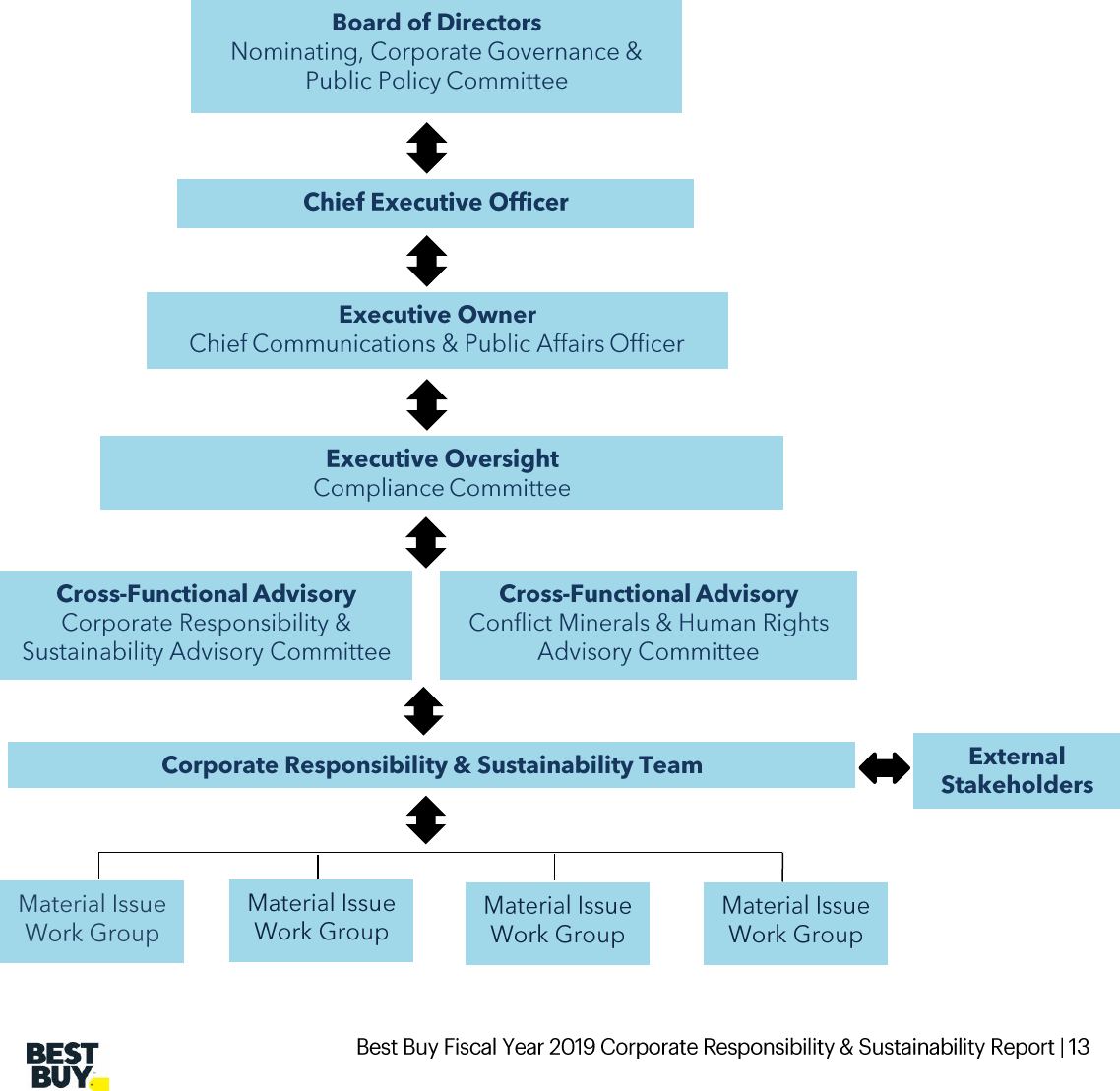
Corporate Responsibility & Sustainability governance.
Strong governance practices are critical enablers of a company’s success. Our corporate responsibility
governance structure starts at the highest levels of our company. The independent Nominating, Corporate
Governance & Public Policy Committee of our Board of Directors oversees Corporate Responsibility &
Sustainability (CR&S). The Committee annually reviews our CR&S program and discusses with
management any relevant strategies and risks. In addition, we have leaders from across the company who
advise our CR&S programs and initiatives, support integration and assist in setting goals and measuring
results.
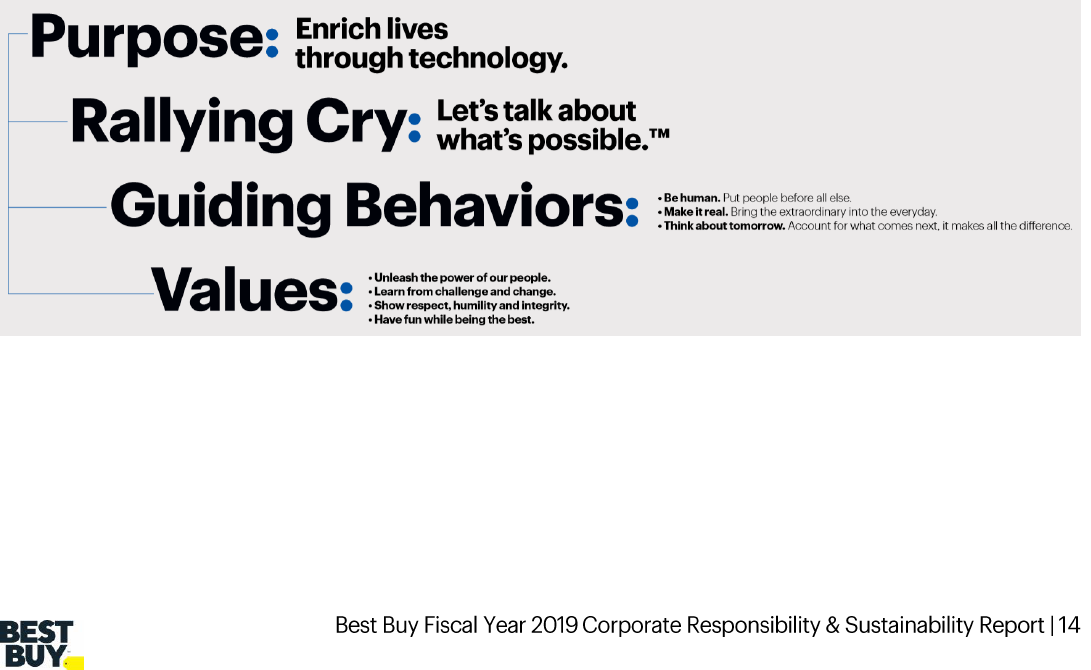
Ethics.
We know that each of our stakeholders expect that we operate in an entirely ethical manner. Ethics is a
critical foundation for every company. It is about doing the right thing.
Our Code of Ethics (located at BestBuyEthics.com) is a resource, which details the fundamental beliefs,
principles and expectations of all of us at Best Buy. We also expect our suppliers, vendors and third-party
business partners to uphold the same high standards of business conduct as we do. The specific
requirements that they must meet are outlined in our Supplier Code of Conduct located on our partner
portal (Partners.BestBuy.com).
We expect everyone, at every level of the company to:
• Live Best Buy’s purpose, guiding behaviors and values. It all begins with that.
• Use good judgement and act with integrity and honesty. We cannot – and will not – emphasize
performance at the expense of our integrity.
• Follow all policies and laws. Complete all trainings assigned – that’s the best way to learn.
• Speak up if misconduct or unethical behavior is suspected. It’s always the right thing to do.
We do well by doing good. In every decision. Every day.

Political activity.
Best Buy engages in the political process by developing and advocating public policy positions that
directly impact our business, employees, customers, shareholders and communities. In line with its
commitment to transparency, Best Buy discloses our efforts, priorities and any use of corporate funds for
political purposes.
In 2018, public policy priorities for Best Buy included:
Trade: Support trade policies that address trade barriers disproportionally challenging to businesses but
responses to those unfair trade barriers should seek to minimize impacts to American consumers so as not
to increase costs of tech products.
State E-fairness: Support passage of state e-fairness legislation, which would allow retailers to compete on
a level playing field while serving customers across all selling channels.
Workforce Issues: Support policies that provide employers the flexibility to attract and retain talent by
offering competitive wages, benefits and flexible scheduling.
Financial Services: Protect critical credit offerings and continue to reform debit and credit interchange
system to reduce expenses and increase competition in payments market.
Cybersecurity, Data Privacy & Internet of Things: Committed to safeguarding customer data and
ensuring a relationship with customers that better understands and serves their needs and interests.
Supply Chain & Infrastructure: Support investments to the nation’s multi-modal infrastructure and the
free flow of commerce while promoting a safe and secure supply chain.
Energy & Environment: Promote the responsible recycling of electronic waste and policies that encourage
energy efficient design and innovation.
Emerging Technologies & Innovation: Support policies that allow for the emergence of new, innovative
technologies and products that improve consumers’ lives.

Political contributions.
Best Buy did not make any political contributions directly to candidates in 2018. The organizations below
received funding totaling $180,000. All contributions of more than $5,000 are reviewed and approved by
the Best Buy Contributions Steering Committee.
• Democratic Governors Association
• Republican Governors Association
• Democratic Legislative Campaign Committee
• Republican Legislative Campaign Committee
• Democratic Attorneys General Association
• Republican Attorneys General Association
Best Buy maintains an employee-funded political action committee (“Best Buy Employee Political Forum”),
and its activity can be viewed at www.fec.gov. Please see the Best Buy Political Activity & Government
Affairs Policy and the Best Buy 2018 Political Activity Report on Corporate.BestBuy.com/Advocacy for
additional information.
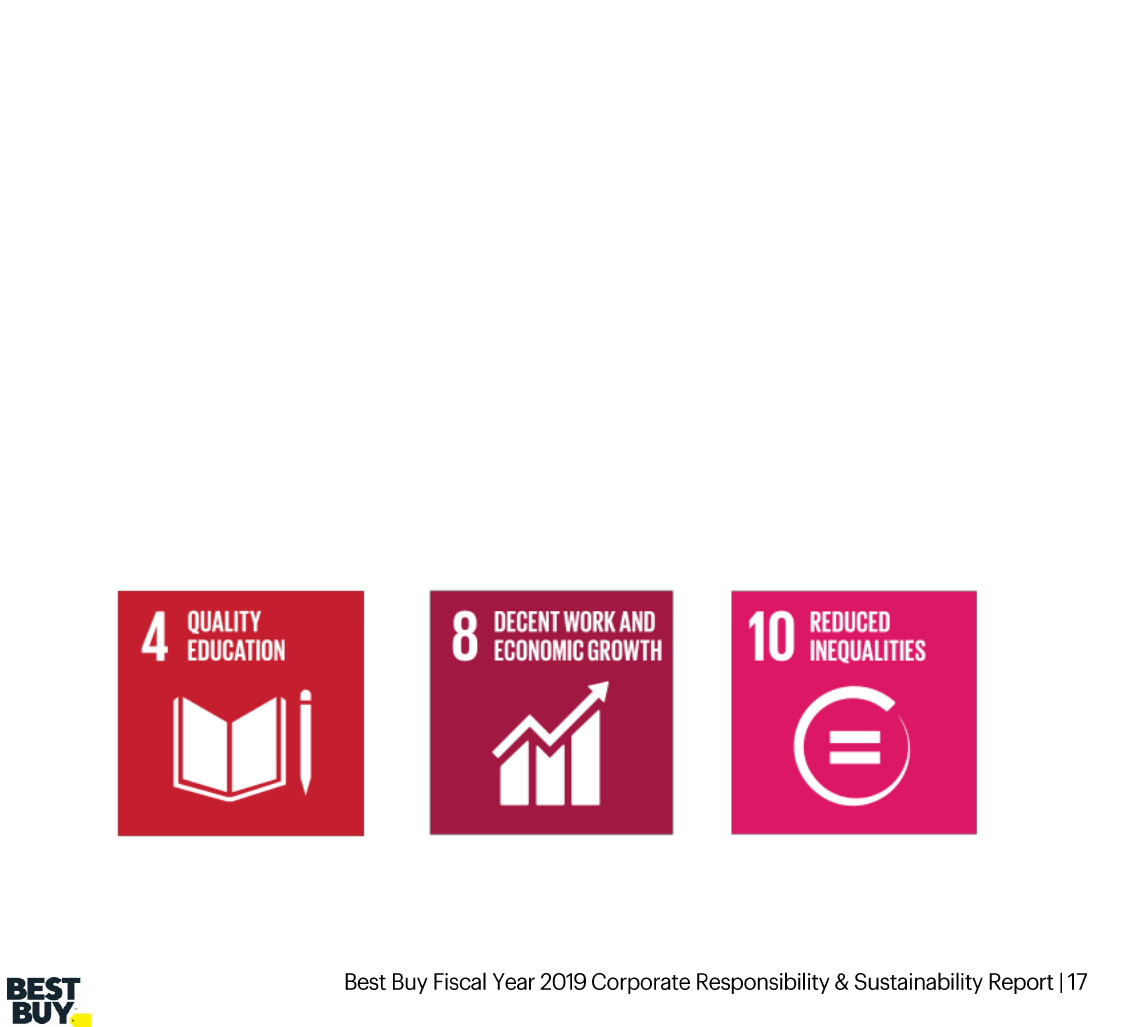
COMMUNITY
We are unleashing the limitless possibilities of
technology, ensuring young people have an opportunity
to pursue their dreams.

Addressing key issues: tech education gap.
Technology know-how is crucial for young people preparing to enter the job market. However, 50 percent
of public school students are living in underserved communities where there is little access to technology.
In addition, only 23 percent of low-income students starting high school are prepared adequately for
college by graduation.
Together with our partners, we are preparing youth from underserved communities for the careers of the
future, and helping to unlock their potential. Because talent is equally distributed, but opportunity is not.
Driving collective impact.
To address these challenges, we take a collective impact approach, working with key stakeholders and like-
minded companies, philanthropies, nonprofits and leaders in communities nationwide. Together, we are
working to ensure youth have the opportunity to thrive.
Thank you to our partners for their support!
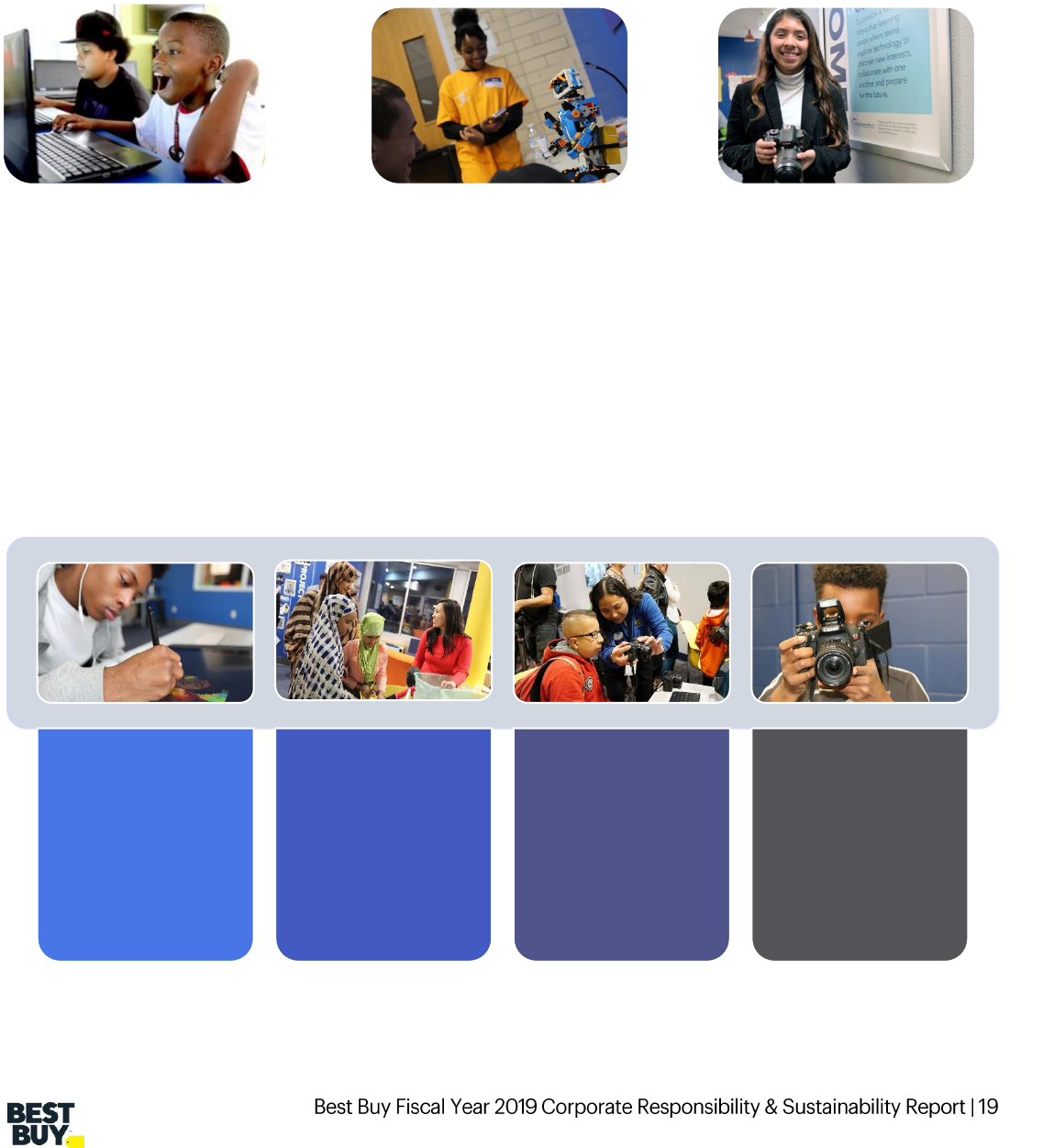
Signature programs.
Our pathway of programs connects young people with resources to realize their potential and channel
their talent, energy and ideas into bright futures.
Program hallmarks.
Tech tools,
education and
training
that ignite
curiosity and
broaden horizons
Career programs
that provide a
bridge to
opportunity and
future success
Employee
engagement
channeled toward
tech education
A collective
impact coalition
dedicated to
building brighter
futures for young
people around
the country
Geek Squad Academy
Ages 12-14
Introduction to tech through a
series of high-energy,
interactive classes run by Best
Buy employees.
Teen Tech Centers
Ages 13-21
Engagement with professional-
level tech training and
mentorship in a creative,
supported out-of-school-time
environment.
Career Pathways
Ages 17-21
Year-long technical training
program focused on high-
demand fields such as cyber
security, programming and
digital media.
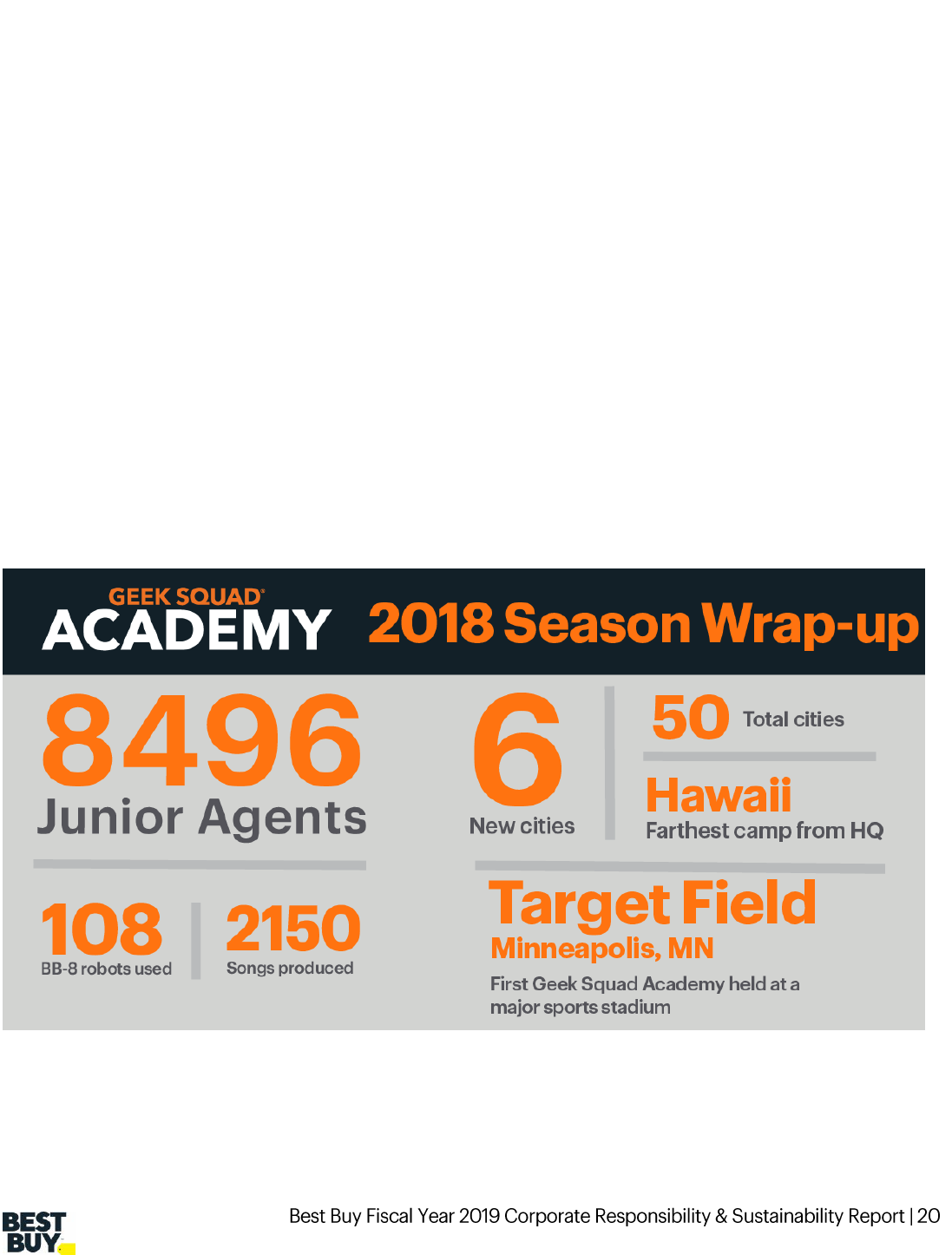
Geek Squad Academy.
Geek Squad Academy (GSA) is an immersive education experience that introduces students from
underserved communities to the latest technology through fun, interactive workshops. Best Buy partners
with local nonprofits and other organizations to provide these experiences to students ages 12 to 14
through two-day camps and one-day experiences. Classes include robotics, circuits and logic, 3D design,
HTML and web design and internet security.
Since its inception in 2007, GSA has inspired more than 40,000 youth from underserved communities to
become the next generation of engineers, entrepreneurs, designers and leaders. In FY19, we held GSA
events in 50 cities across the country.
All of our GSA classes are taught by the true tech experts — our local Blue Shirts and Geek Squad Agents.
Each year, more than 1,000 employees engage with GSA. It’s their passion and energy that makes GSA
such a unique experience.
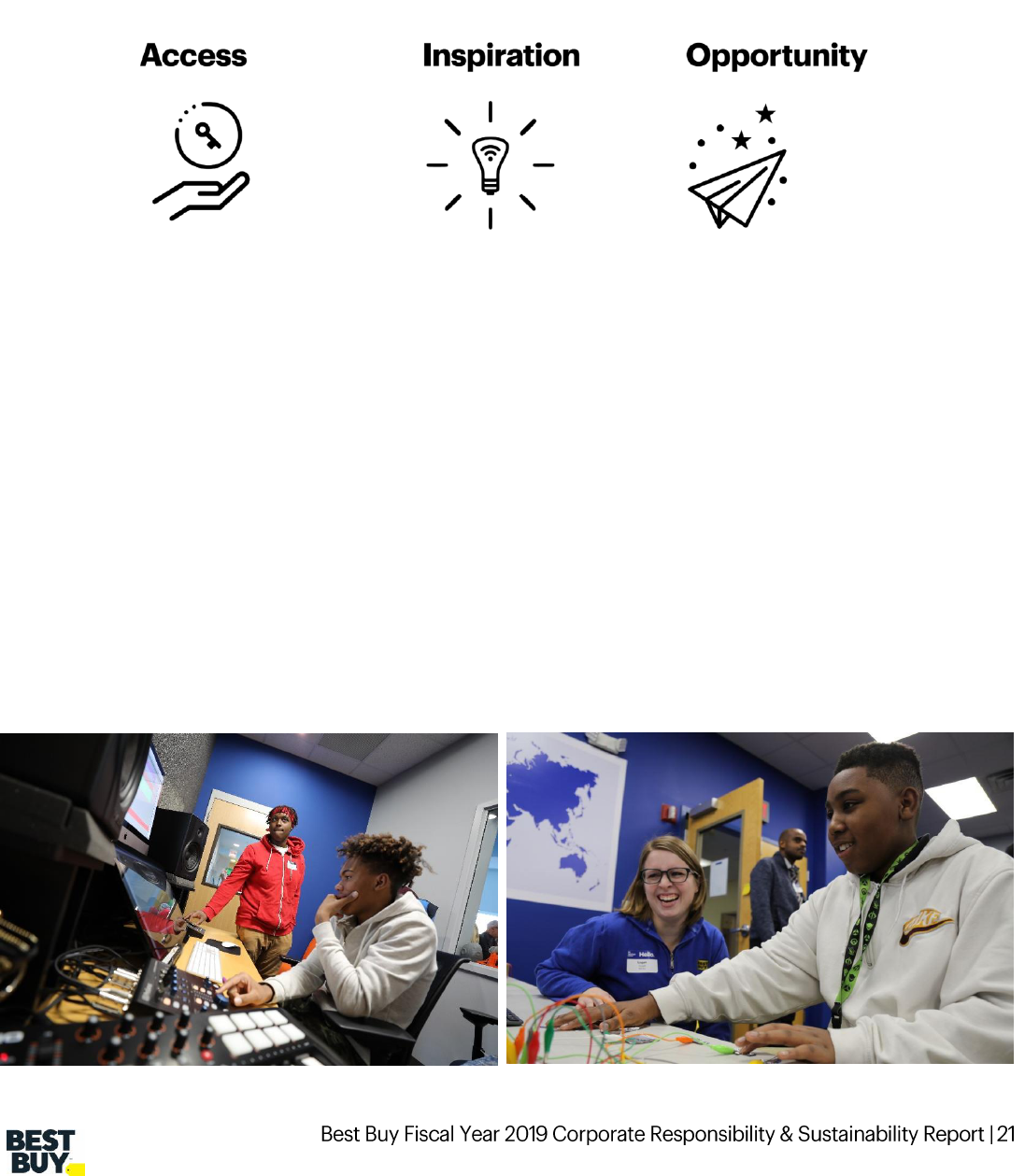
Best Buy Teen Tech Centers.
Teen Tech Centers are safe, after-school learning environments equipped with cutting-edge technology where
youth learn new skills, stay on-track with school, benefit from positive adult and peer relationships, and explore
career interests. Our local employees are engaged with our Teen Tech Centers as volunteer mentors and tech
educators.
In collaboration with a national nonprofit, The Clubhouse Network, and modeled after MIT’s Media Lab, our
proven learning approach bridges the gap between the classroom and the real world. We meet youth
where they are and put them in the driver’s seat of their learning journey.
Encouraging makers and doers.
Youth are actively engaged in designing, creating and innovating.
Fostering collaboration.
Our Teen Tech Centers foster a collaborative environment across cultures and backgrounds to facilitate
peer-to-peer learning.
Supporting self-agency.
With the guidance of adult mentors, youth are encouraged to experiment, take risks and make mistakes in
order to learn and innovate.
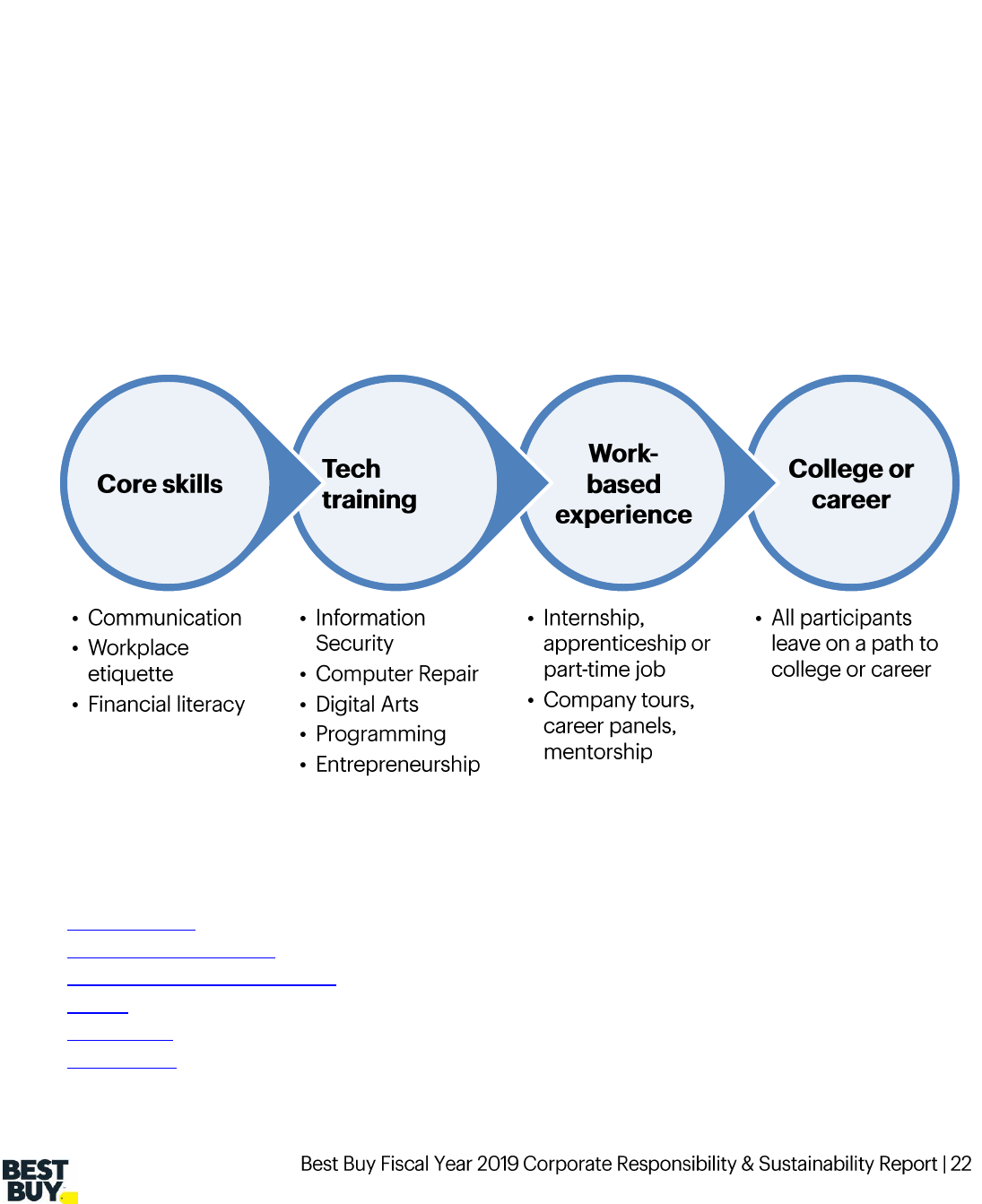
Career Pathways.
Within Best Buy Teen Tech Centers, we are not only bridging a tech education gap, but also helping build a
talent pipeline for Best Buy and other partner organizations. Our newest program, Career Pathways, is
designed to facilitate technology training and skills development in high-demand fields such as cyber
security, coding and IT support. The yearlong program combines core technical skill development with
work-based experience resulting in a path to college or a career. We partner with businesses to design
curriculum and create meaningful placements so teens are prepared for successful careers.
New to the Career Pathways program is a career track specific to building a Best Buy retail employee
pipeline.
We work with several organizations to bring the Career Pathways program to life, including:
• Cyber Seniors
• The GRAMMY Museum
• Hispanic Heritage Foundation
• Mouse
• Per Scholas
• Youth Radio

Best Buy Teen Tech Center locations (as of May 1, 2019):
ARIZONA
Boys & Girls Clubs of Metro Phoenix, Jerry
Colangelo Branch
CALIFORNIA
P.F. Bresee Foundation – Los Angeles
Alternatives In Action – Oakland
Boys & Girls Clubs – San Marcos
COLORADO
Gold Crown Enrichment – Lakewood
CONNECTICUT
YMCA – Wilson-Gray Branch – Hartford
FLORIDA
HANDY (Helping Advance and Nurture the
Development of Youth) – Fort Lauderdale
ILLINOIS
Little Black Pearl – Chicago
INDIANA
Martin Luther King Community Center –
Indianapolis
LOUISIANA
New Orleans Public Library
MASSACHUSETTS
The Clubhouse Network – Boston
MICHIGAN
Detroit Hispanic Development Corporation
MINNESOTA
Brian Coyle Center – Minneapolis
Hennepin County Library – Minneapolis
Hope Community – Minneapolis
Keystone Community – St. Paul
St. Paul Downtown YMCA
MISSOURI
Boys & Girls Clubs of Greater St. Louis – Herbert
Hoover Club
NEVADA
Clark County Library – Las Vegas
NEW JERSEY
Boys & Girls Clubs of Hudson County – Jersey City
NEW YORK
Brooklyn Public Library – Kings Highway Branch
OHIO
Cleveland Public Library – Rockport Branch
PENNSYLVANIA
Phase 4 Learning Center, Inc. – Pittsburgh
TEXAS
Juanita J. Craft Recreation Center – Dallas
Family Services Association, The Neighborhood
Place – San Antonio
Boys & Girls Clubs of Greater Houston – Morefield
Club
WASHINGTON
Boys & Girls Clubs – Bellevue
WASHINGTON, D.C.
FBR Club @THEARC – Boys & Girls Clubs of
Greater Washington
WISCONSIN
Boys & Girls Clubs of Greater Milwaukee – Mary
Ryan Branch
We are almost halfway to our goal of
60 Teen Tech Centers by 2020!
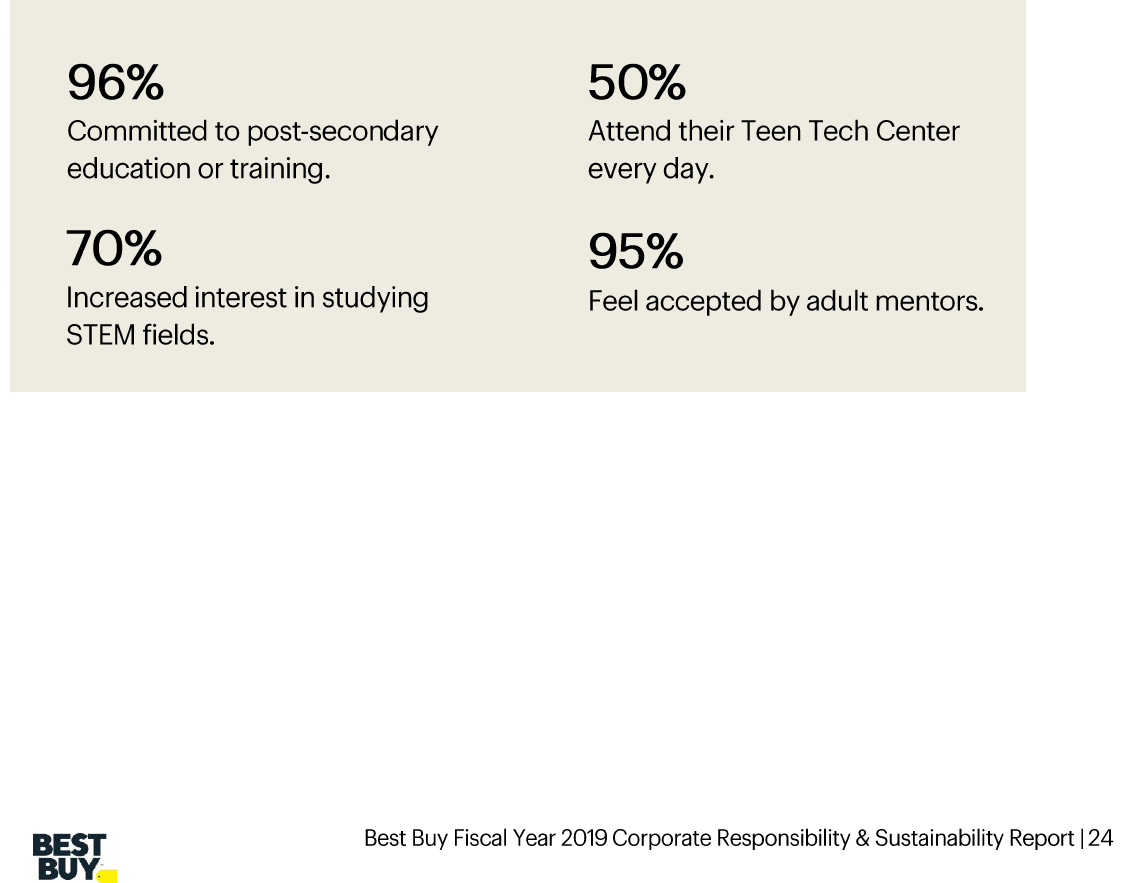
Defining success.
Measuring results is key to ensuring we are making a difference. After participating in our programs, teens
will achieve: a degree or credential with real value in the current labor market; obtain employment with self-
supporting wages; and/or have opportunities for further education and career advancement.
We are measuring the long-term impact of our programs. We will specifically track the youth who have
participated in our programs by first measuring their interest and tech skills, and then their future
education and career successes.
Impact on youth.
More than 500 members of our Teen Tech Centers shared their experiences by participating in an impact
survey through The Clubhouse Network. We are thrilled with the results:

Partnering in local communities.
Our philanthropy aligns with our commitment to help teens build their tech skills and prepare for college
and future careers. Since 1999, Best Buy and the Best Buy Foundation have donated more than $366
million to our communities. The Best Buy Foundation is governed by a Board of Directors consisting of
leaders from across the company who make all funding decisions.
Community Grants.
Our Community Grants program supports local organizations with programs focused on teens and
technology. Our store employees review the applications from their own communities and choose awards
based on their knowledge of local needs.
As we serve customers in more than 1,000 stores across North America, it’s important that we play a key
role in helping these communities thrive. In FY19, the average Community Grant amount was $5,000, with
a total of more than $2 million awarded.
Twin Cities Fund.
The Best Buy Foundation funds nonprofit organizations that add to the vibrancy and increase the vitality of
our home town. The Twin Cities Fund provides support for teens and technology, arts and culture, and
career pathway programs, in addition to capital grants.
Seattle Fund.
In FY19, the Best Buy Foundation launched the Seattle Fund to support organizations near our Seattle
technology development center. The Seattle Fund was formed to provide grants to nonprofits in the King
County metro area that offer career pathways in technology for teens from underserved communities.
Disaster Relief.
Several devastating natural disasters struck in FY19, including hurricanes and wildfires. Best Buy employs
thousands of people in the areas affected, and our first concern was the safety of our employees.
Emergency aid was distributed to employees and their families through the Richard M. Schulze Family
Foundation Employee Disaster Relief Fund. We also partnered with nonprofits, such as The Salvation Army,
to distribute phone chargers and batteries, as well as set up internet cafes and entertainment rooms in
temporary shelters.
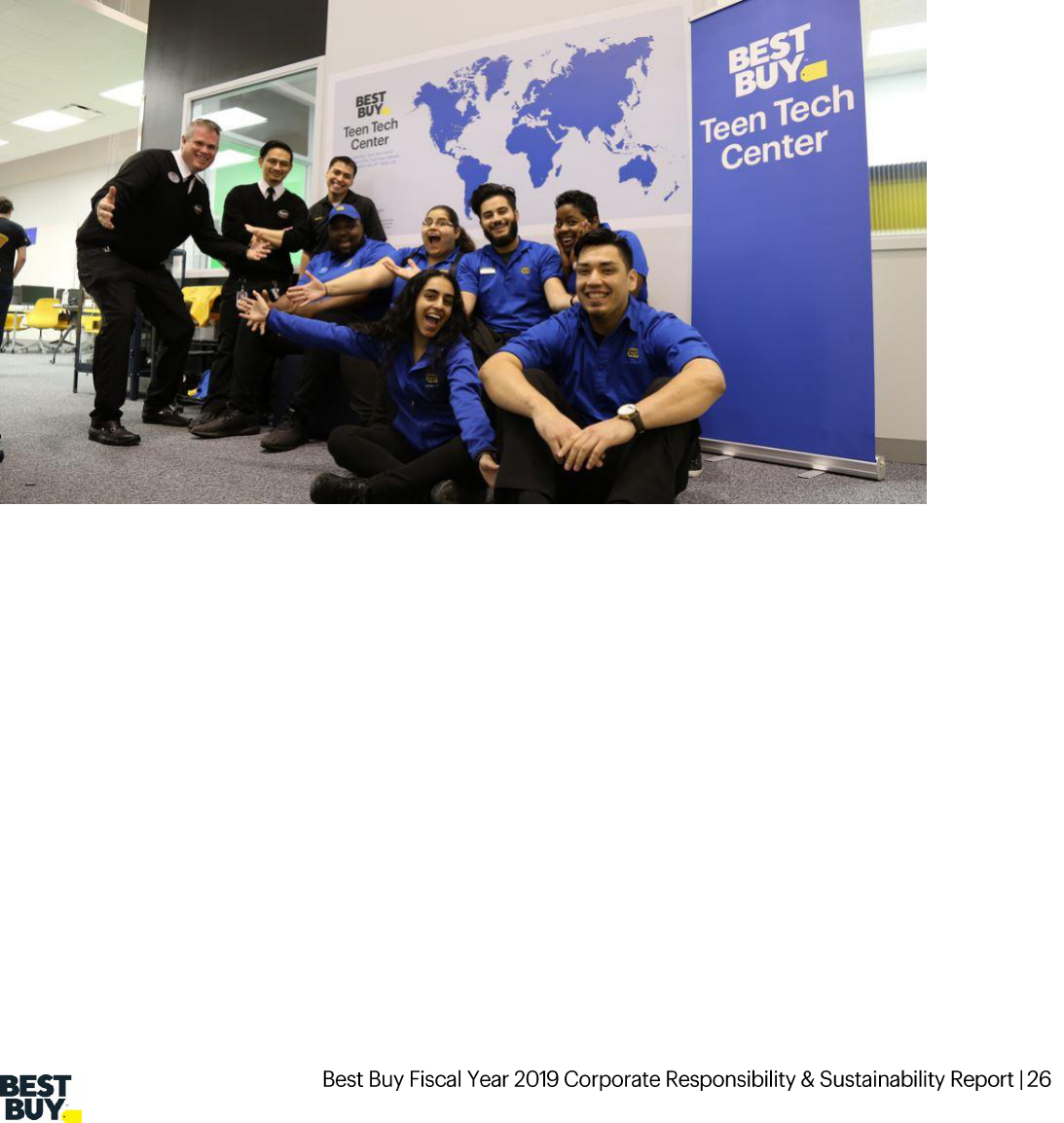
Employees spent 100,000 hours volunteering.
Our employees generously share their time and expertise volunteering with local organizations and are
essential to how we support our communities. We create opportunities for employees to participate in
everything from leading technology workshops for youth to responding in times of disaster. Employees are
encouraged to support causes that are personally rewarding, and we recognize their involvement through
the TagTeam Award program, which awards monetary donations to nonprofit organizations where groups
of employees volunteer their time.
Our employees in Asia participate in two mentoring programs, Youth for Environmental Sustainability (YES)
and Organic Garden, both of which educate students on the importance of being environmentally aware
and, in turn, being responsible citizens. YES and Organic Garden are initiatives created by Shanghai Roots
& Shoots, a nonprofit organization that was founded by primatologist Dr. Jane Goodall in 1991 to teach
young people about environmental issues and humanitarian values through group interactions. Best Buy
employees conduct “eco action” projects at local schools, where they shed new light on environmental
issues through drawings, poetry, music and drama.
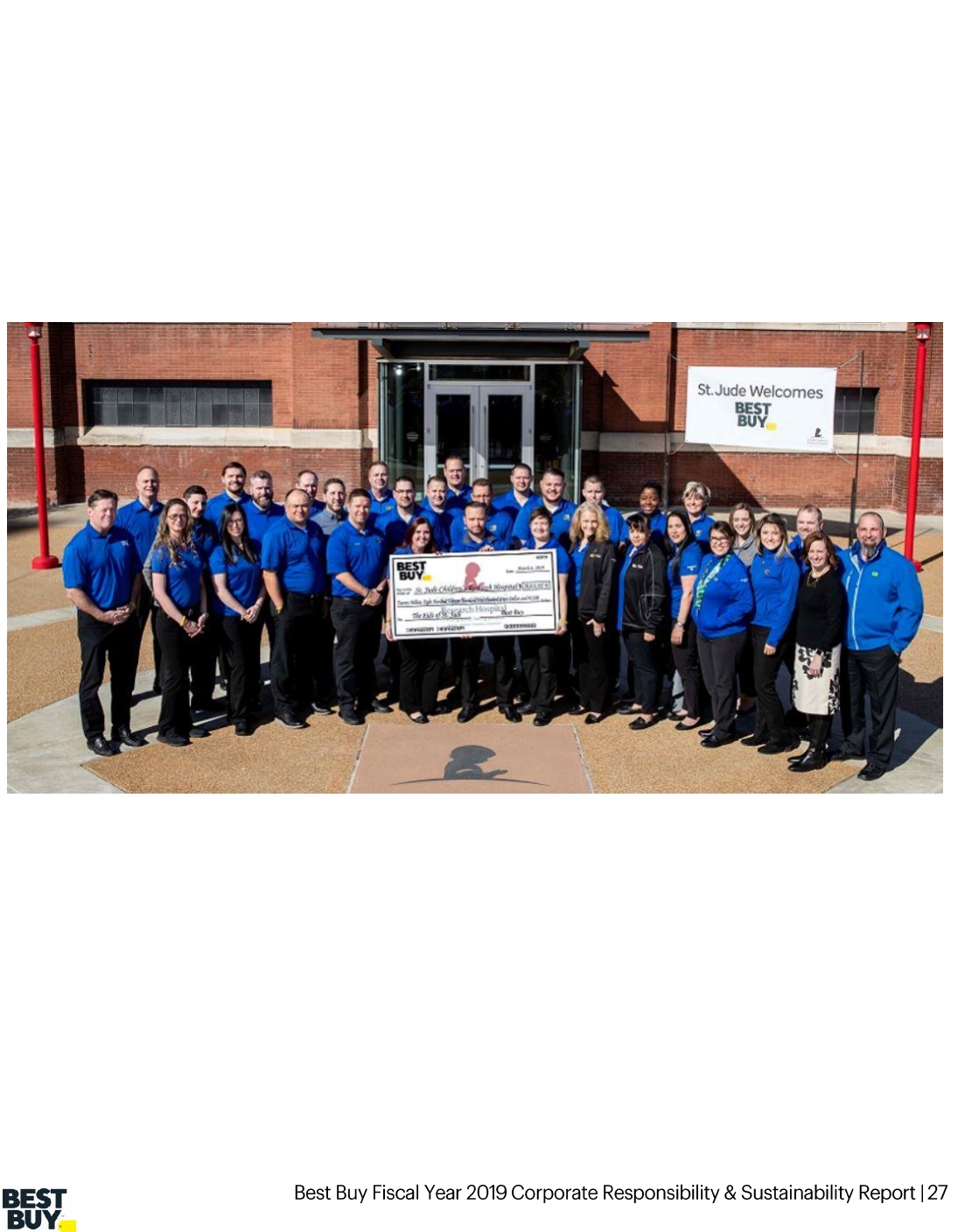
Best Buy customers and employees raised more than $20 million for St. Jude.
Thanks to our generous customers, Best Buy is proud to have presented $20.8 million to St. Jude Children’s
Research Hospital
®
in 2018, and we finished as the largest St. Jude Thanks and Giving
®
campaign donor for
the third-consecutive holiday season. To date, Best Buy has raised more than $80 million for St. Jude,
becoming one of the largest sponsors in the hospital’s history.
We have participated in the Thanks and Giving campaign since 2013. The funds donated support the life-
saving work of St. Jude, which freely shares breakthroughs and treatments with doctors around the world,
and ensures families never receive a bill for treatment, travel, housing or food.
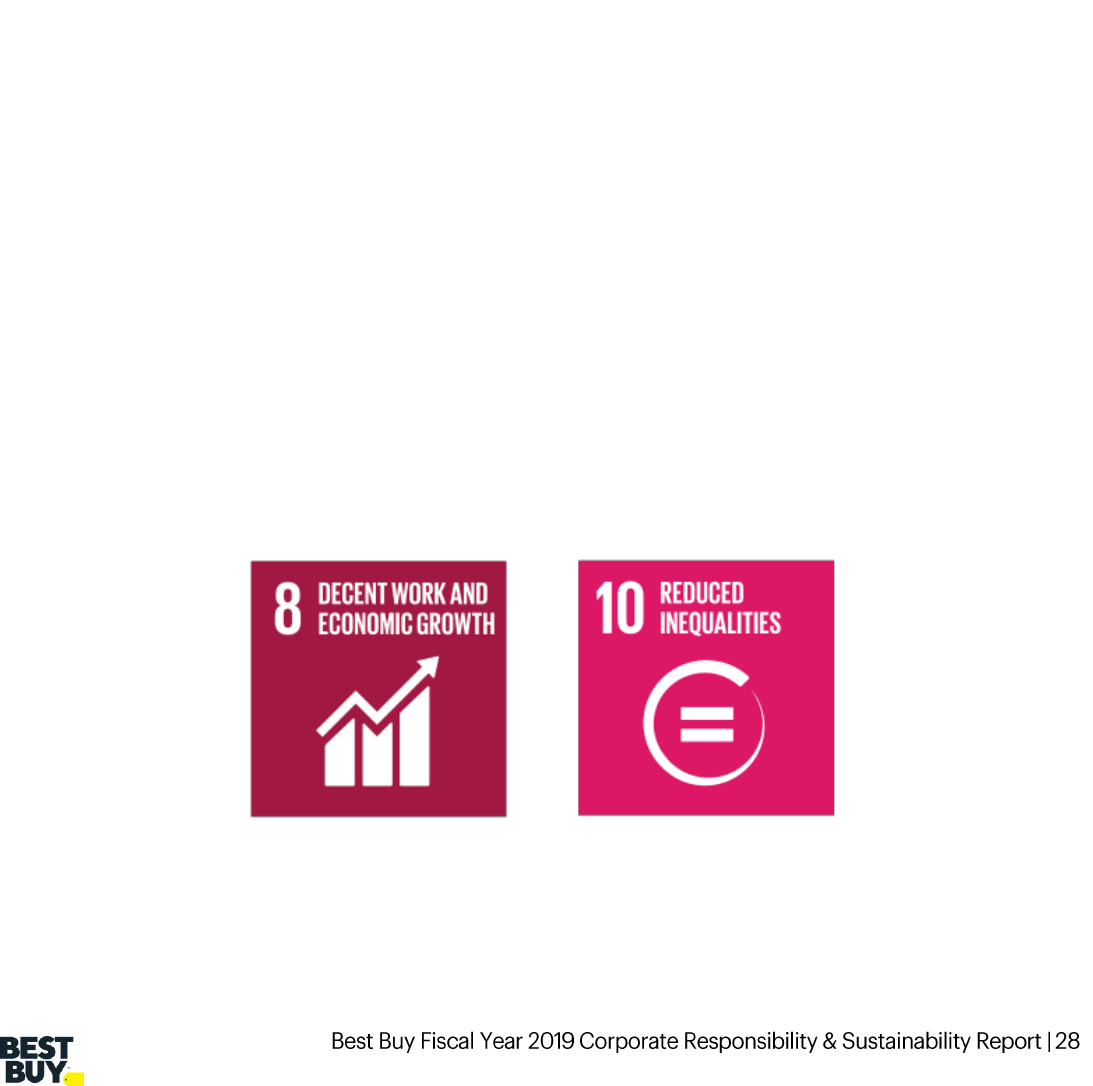
PEOPLE
Best Buy aims to treat people with respect — whether they
are our employees, customers or workers in factories that
produce our Exclusive Brands products.
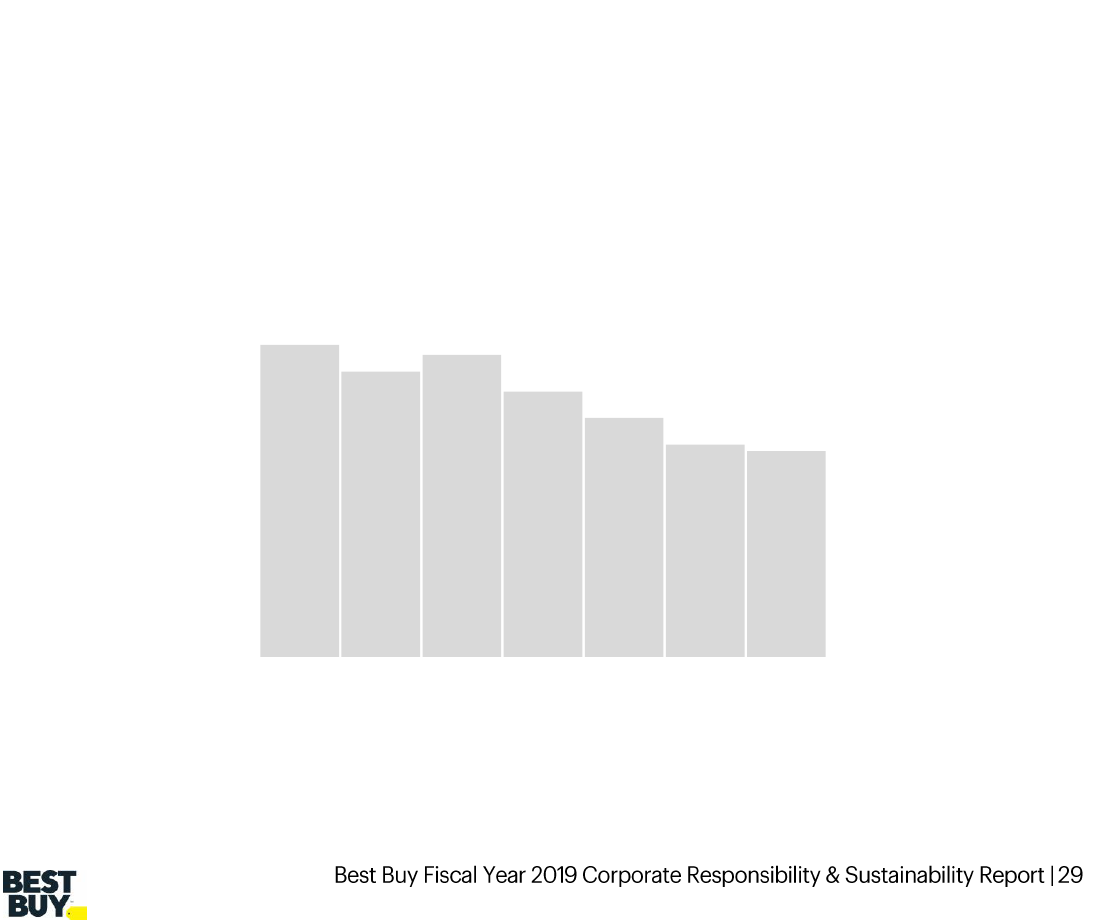
Employee engagement.
Maintaining a highly engaged workforce.
Each year, we invite all employees from across the organization to share their feedback on their employee
experience at Best Buy. We use a formal survey called eVoice to establish a baseline of employee
engagement and identify areas to improve the employee experience. The survey provides insight not only
into employee engagement, but also 11 other dimensions of the workplace environment.
We know that a higher level of employee engagement correlates to better customer experiences, stronger
financial performance and higher levels of retention, which is why we strive for a highly engaged
workforce.
We continue to experience a world-class level of employee engagement, with an overall engagement
score of 86 for FY19.
Recognition is an important component leading to an engaged workforce. We recently rolled out a new
recognition program called True Blue, which recognizes employees who put their heart and soul into their
work every day.
Turnover number improves.
As a measure of a highly engaged workforce, we are pleased to report a lower turnover rate for the fourth
year in a row. We have reduced our turnover from 40 percent in FY16 to 31 percent in FY19.
47%
43%
46%
40%
36%
32%
31%
FY13 FY14 FY15 FY16 FY17 FY18 FY19
Employee Turnover
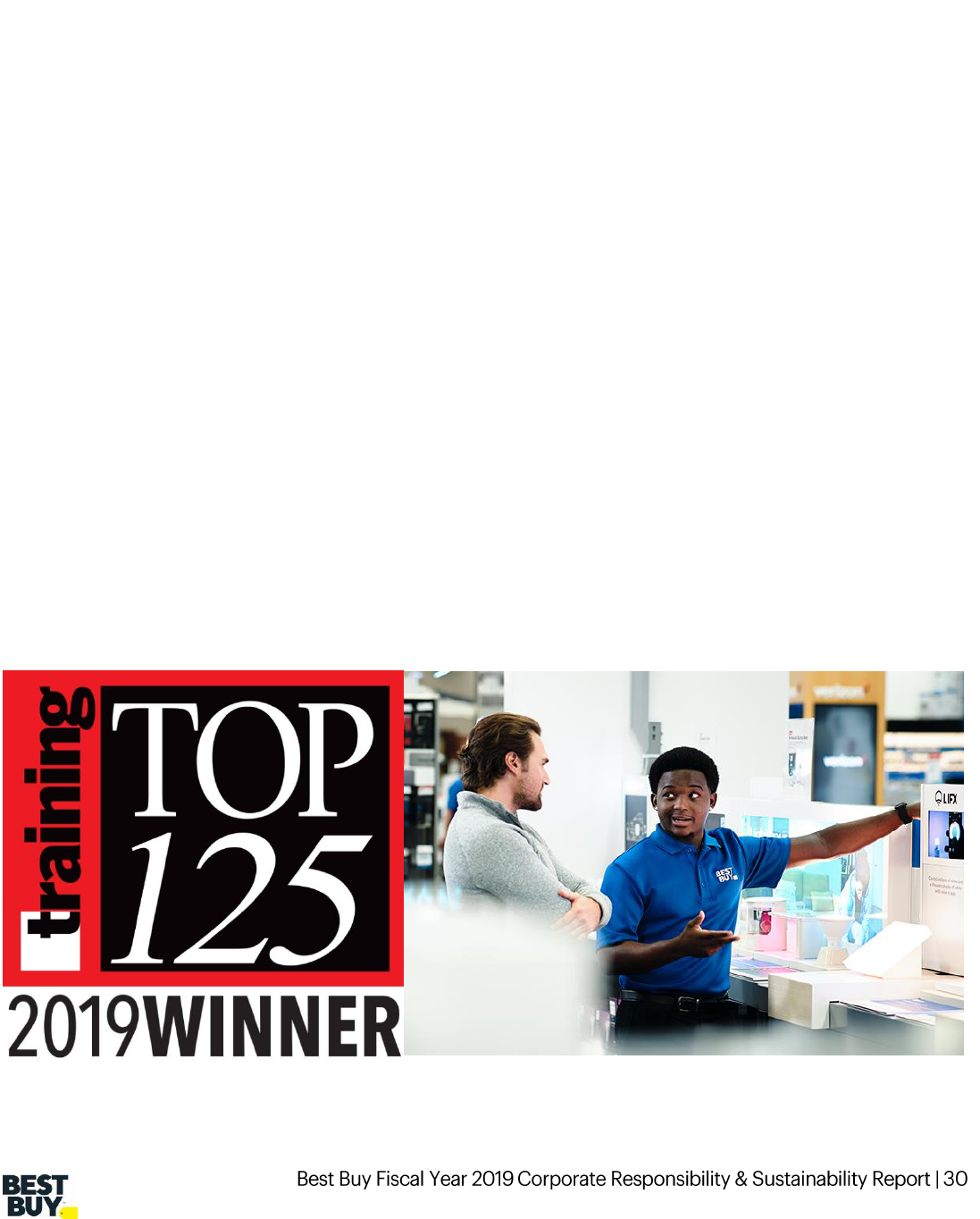
Training & development.
Continued excellence in training programs.
In the U.S., we deliver product and service training to our employees through a digital platform called The
Learning Network. The site provides training content in the form of eLearnings, videos, virtual
environments and documents. In addition, our employees use The Learning Network to register for
instructor-led training. Instructors deliver skills and training in physical and virtual classrooms.
Our employees completed more than 20 million training courses in FY19. That demonstrates our
commitment to a highly trained workforce, which creates exceptional customer experiences. Not only do
our store employees learn via online trainings, but they receive daily mentoring and coaching from store
managers.
Our employees can also participate in formal development programs including:
• Careers in Motion – We launched a self-driven solution that allows employees to learn about
different roles and departments around the company, in addition to expectations and skills needed
for each role;
• Blueprint – We created a development program for corporate and field employees who desire to
move into leadership positions in the future; and
• Harvard ManageMentor® Spark – We offer an online learning solution that enables employees to
build and develop skills.
In FY19, Training Magazine ranked Best Buy No. 3 in the world for employee training, learning and
development.
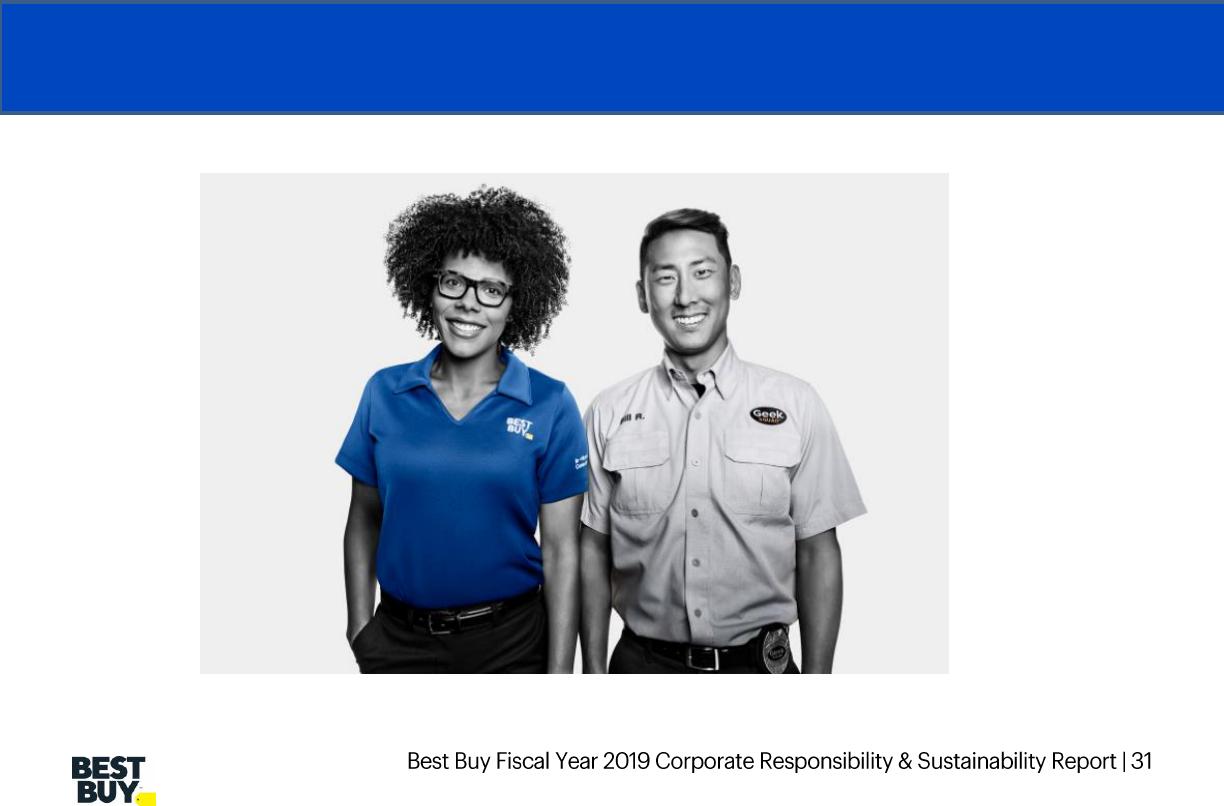
Diversity & Inclusion.
The vision of Diversity & Inclusion at Best Buy:
Best Buy’s culture is inclusive. We reflect our customer base and the population of the communities we
serve. At Best Buy, we include people from all backgrounds and identities, and we maintain open
communication about our goals, opportunities and challenges.
We believe an inclusive environment allows our employees to bring their best selves forward in service of
our customers. Our guiding behaviors: Be Human, Make it Real, and Think About Tomorrow, set the tone
for our culture and guide us in defining inclusive leadership:
• Vulnerability – Willingness to show weaknesses today in order to be stronger tomorrow;
• Empathy – Being purposeful about understanding the unique experience of everyone;
• Courage – Empowering everyone to speak up and take action for what is right; and
• Grace – Creating an environment where people can take calculated risks and learn from mistakes.
Inclusive Leadership is embedded within how we lead at Best Buy.
We believe when we show up this way, employees will feel they truly belong, allowing
them to fully invest in our mission at Best Buy.

We have made progress toward building a more diverse and inclusive environment. Our FY19
accomplishments include:
• Introducing our first organization-wide Diversity & Inclusion strategy;
• Creating an Executive Diversity & Inclusion Council to accelerate the execution of the Diversity &
Inclusion strategy;
• Creating opportunities for authentic and vulnerable dialogue, along with building skills around
conscious inclusion;
• Expanding our Diversity and Inclusion Steering Committees to include retail, services and supply
chain employees in the field, as well as all teams at Corporate;
• Launching external diversity and inclusion marketing campaigns during Black History Month,
Women’s History Month and Pride Month;
• Establishing a marketing review council led by marketing and Employee Resource Group
leadership;
• Partnering with Cristo Rey High School in Minneapolis to host a corporate work-study program for
students that gives them workforce experience. This program traditionally supports students of
color;
• Achieving a perfect rating of 100 on the Human Rights Campaign Corporate Equality Index, earning
the designation as a “Best Place to Work for LGBTQ Equality” for the 14th year;
• The Board of Directors electing Corie Barry as the company’s first female CEO; and
• Increasing our Board of Directors gender ratio to greater than 50 percent.
Additionally, Best Buy promotes participation in our Employee Resource Groups (ERGs) and Diversity &
Inclusion Steering Committees (DISCs), which are groups of employees who share a dimension of
diversity, such as age, race, ethnicity, gender, disability, military status, sexual orientation or gender
identity, or an interest in the development and growth of the various aspects of diversity.
ERGs and DISCs are inclusive and open to all employees. They support organizational goals such as
recruitment, retention, engagement and inclusion.
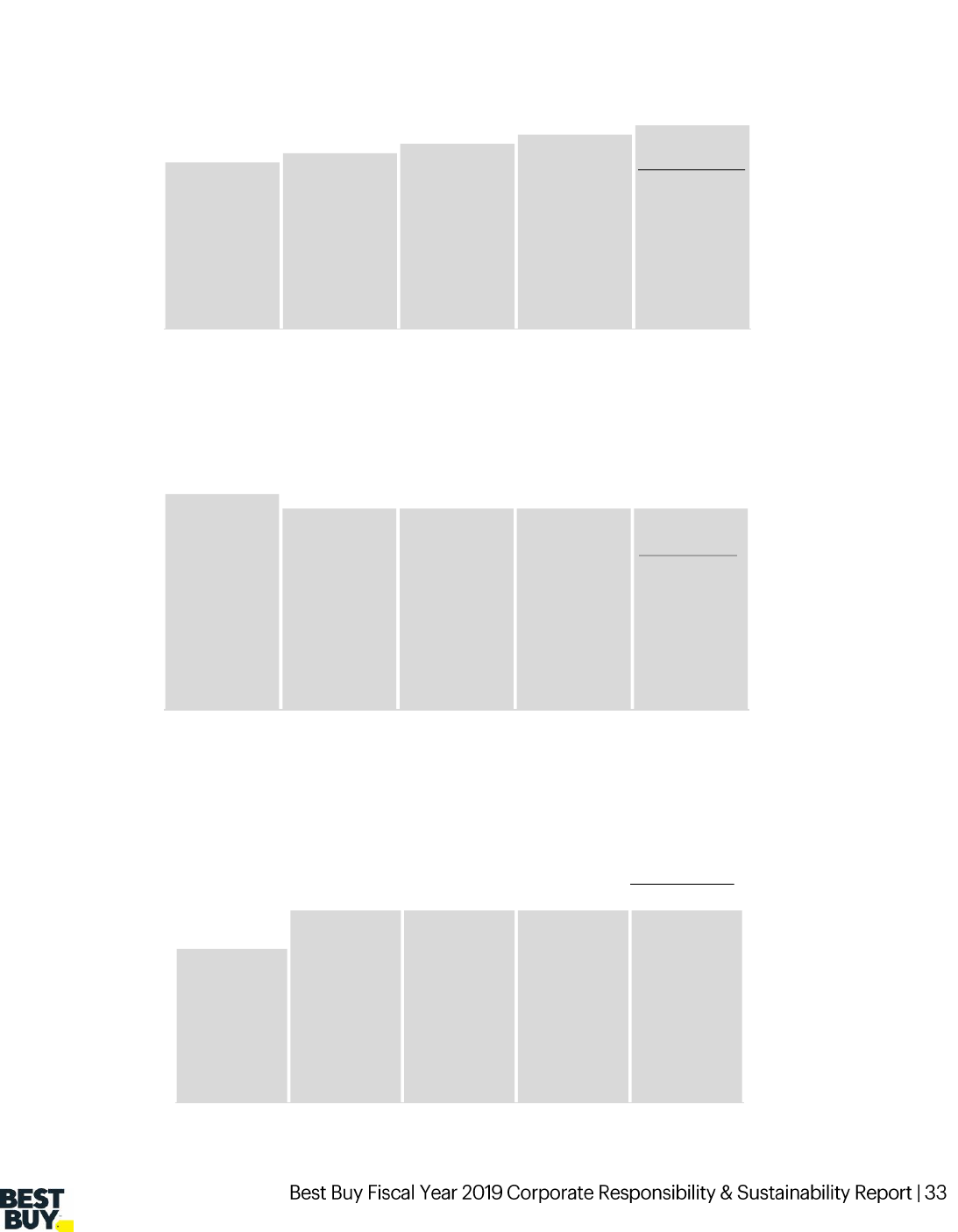
Employee diversity.
18%
19%
20%
21%
22%
U.S. Pop., 18.1%
FY15 FY16 FY17 FY18 FY19
Hispanic Employees (U.S.)
Percentage of U.S. Best Buy Employees
15%
14% 14% 14% 14%
U.S. Pop., 13.4%
FY15 FY16 FY17 FY18 FY19
African-American Employees (U.S.)
Percentage of U.S. Best Buy Employees
4%
5% 5% 5% 5%
U.S. Pop., 5.8%
FY15 FY16 FY17 FY18 FY19
Asian-American Employees (U.S.)
Percentage of U.S. Best Buy Employees
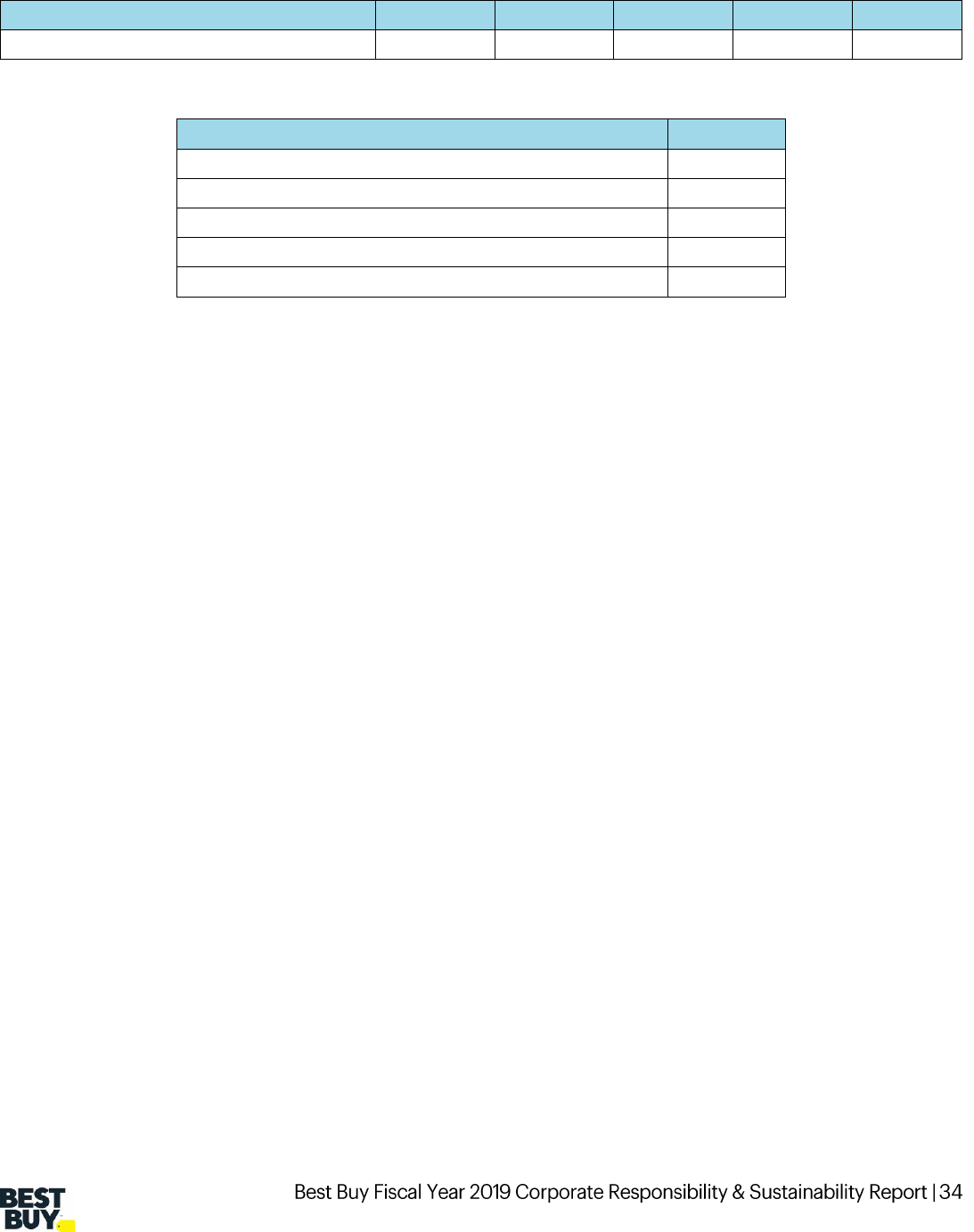
Employee diversity.
Gender Diversity
FY15
FY16
FY17
FY18
FY19
Female Employees (Enterprise)
28%
26%
27%
26%
26%
Best Buy does not discriminate based on age, sex, race, color, ethnicity, citizenship, national origin, sexual
orientation, gender identity, creed, religious preference or belief, disability, marital/family status or any
other characteristic protected by law. Other characteristics may be recognized and protected under
specific national, provincial, state or local laws, regulations or ordinances. Best Buy is dedicated to ensuring
this policy is followed during hiring, selection for training, promotion, transfer, layoff, termination, leaves of
absence, rates of pay or any other term or condition of employment. When needed, Best Buy will provide
reasonable accommodations for disabled employees or those with specific religious requirements. Acting
in accordance with these guidelines shows respect, humility and integrity while helping to create a positive
work environment for everyone.
Supplier diversity.
Our commitment to diversity and inclusion extends to the suppliers we partner with. Supplier diversity is
both an expectation of our stakeholders and good for our business. Our Supplier Diversity program within
our Goods Not For Resale (GNFR) business promotes strength in our supply chain, economic enablement
in our communities and is a reflection of the markets and customers we serve.
In FY19, our accomplishement included:
• Continued utilization of our current diverse suppliers and increasing our supply base of diverse
suppliers in our bidding process;
• Increased year-over-year spend with certified diverse suppliers in GNFR by more than 5 percent;
• Continued hosting of annual local diverse supplier events to connect with our local diverse
communities; and
• Further building a supplier network that mirrors the diversity of our customers by implementing an
online supplier portal, giving suppliers the opportunity to register their capabilities and
certifications.
Board of Directors Diversity (as of 6/11/19)
Members
Total Number of Directors
13
Hispanic Board Directors
0
African-American Board Directors
3
Asian-American Board Directors
1
Female Board Directors
7

Human rights.
Doing business the right way means we understand how our operations, our products and services, and
even our business relationships could affect employees, our customers and people in the communities
where we operate. We are committed to addressing any adverse impacts we might encounter. To that end,
we have taken steps to align with the United Nations Guiding Principles on Business and Human Rights
(UNGP), which is widely accepted as the global standard for how businesses should respect human rights.
In FY16, in partnership with Business for Social Responsibility (BSR), we completed a Human Rights Impact
Assessment to identify actual and potential risks, and to better understand which rights are most salient for
our business. The results of the assessment concluded that Best Buy operates in a relatively low-risk
industry regarding human rights and that we have effective management systems in place. We still
recognize that there are always opportunities to strengthen practices, and we are actively working to make
improvements on the findings that were identified.
Our Human Rights Policy is the basis of our management system and focuses on the following
stakeholders:
• Respecting the rights of workers by improving labor conditions and environmental practices at
facilities that manufacture private-label products or recycle electronics for Best Buy;
• Respecting the rights of Best Buy employees and striving for a diverse, inclusive and respectful
workplace free of harassment and discrimination;
• Respecting the rights of our customers, including their right to privacy; and
• Seeking to advance the right to education in the communities where we operate by sharing our
knowledge of technology with underserved teens.
Best Buy’s commitment to human rights was deepened even further when we were the first Minnesota-
based company to publicly commit to align with the recently released UN Standards of Conduct for
Business: Tackling Discrimination against Lesbian, Gay, Bi, Trans and Intersex People (UN LGBTI Standards).
In FY19, our accomplishments included:
• Launching a gap analysis between the UN’s LGBTI Standards and Best Buy’s practices;
• Maintaining a Privacy Task Force supporting an Internet of Things project team; and
• Initiating an expansion of our responsible sourcing program into our Goods Not for Resale sourcing
department.

Product safety.
As a responsible retailer, it is essential the products we sell are safe for customers. To stay apprised of
regulatory issues and trends that impact our product safety program, we hold memberships in the Retail
Industry Leaders Association (RILA) Product Committee, the Consumer Technology Association (CTA)
Product Safety Working Group and the International Consumer Product Health and Safety Organization
(ICPHSO). We also actively participate in Underwriters Laboratories (UL) standards and technical panels for
standards relating to consumer products to provide our voice in protecting our customers.
For our direct import and private-label products, we focus our product safety in four areas:
• General product safety compliance with various voluntary and mandatory standards;
• Hazardous substances (such as ROHS, TSCA and others) through our Chemicals Management
Program based on the IECQC 080000 standards;
• Energy efficiency programs; and
• Radio-frequency interference compliances (FCC rules for radio noise and communications).
We have committed to the Consumer Product Safety Commission to work on providing consumers with
more knowledge about placing TVs in safe locations within a residence. One step we’ve taken is including
CTA-based television safety instructions directly on top of the TV, within Insignia TV packaging (not just in
the manual), to increase the likelihood of consumer readership.
We use social media to track customer complaints and immediately share product recall information via
our @BestBuySupport Twitter handle (in addition to our traditional safety recall communications
measures). We assess our product categories for safety improvements on an ongoing basis, and we are
pleased to report that in FY19 there were no safety recalls on our private-label products.

Data privacy.
We are committed to protecting the privacy of our customers’ information by using a variety of information
security measures to protect their transactions and valuable data. Whether customers are shopping online,
on our app, in their home or in our stores, we use security best practices to work to protect the
confidentiality of personal information under our control, and we appropriately limit access to it. Our digital
properties use encryption technology to protect customers’ personal information including names,
addresses and credit card numbers.
Industry partnership.
Best Buy is a corporate member of the International Association of Privacy Professionals, the world’s largest
privacy community. Best Buy is also a corporate member of the Association of Corporate Counsel (ACC), a
global association of more than 40,000 in-house attorneys, and an active participant in ACC’s Information
Technology, Privacy and eCommerce Committee. In addition, we participate in the RILA Privacy Leaders
Council. These memberships help us understand industry shifts, benchmark our peers to help maintain
appropriate privacy and security standards, and provide input as a retail industry on privacy legislation or
other regulatory requirements that will impact our business. As of 2018, Best Buy joined the Future of
Privacy Forum (FPF) Advisory Board. The mission of FPF is to advance principled data practices in support
of emerging technologies by bringing together industry, academics, consumer advocates, and other
thought leaders to develop privacy protections, ethical norms and workable business practices.
Policy and process.
Our employees, including Blue Shirts and Geek Squad Agents, as well as third-parties who provide services
on Best Buy’s behalf, are required by policy and process, as well as by contract, if applicable, to treat
customer information with care. We have administrative, technical and physical safeguards that reflect this
obligation. We regularly work to review and enhance Standard Operating Procedures (SOP), policies and
standards. Additionally, we have expanded our information security and privacy processes in reviewing
third-party vendors in order to reduce the occurrence and degree of third-party data privacy incidents.
Best Buy processes are designed to preclude unnecessary access to confidential information. Our Geek
Squad Agents are trained to never access data on a customer's device except in limited circumstances,
and only to the extent necessary to perform the service, such as when a customer asks us to recover data.
When information is still on a device that a customer trades in or gives to Best Buy for recycling, the device
is protected until it is sent to the appropriate location for data wipe or disposal.
In FY19, Best Buy reported one incident regarding a breach of customer privacy, due to a cyberattack on
one of Best Buy’s third party vendors. Best Buy worked with the vendor to investigate and appropriately
remediate the issues, and Best Buy provided credit monitoring services to the affected customers.
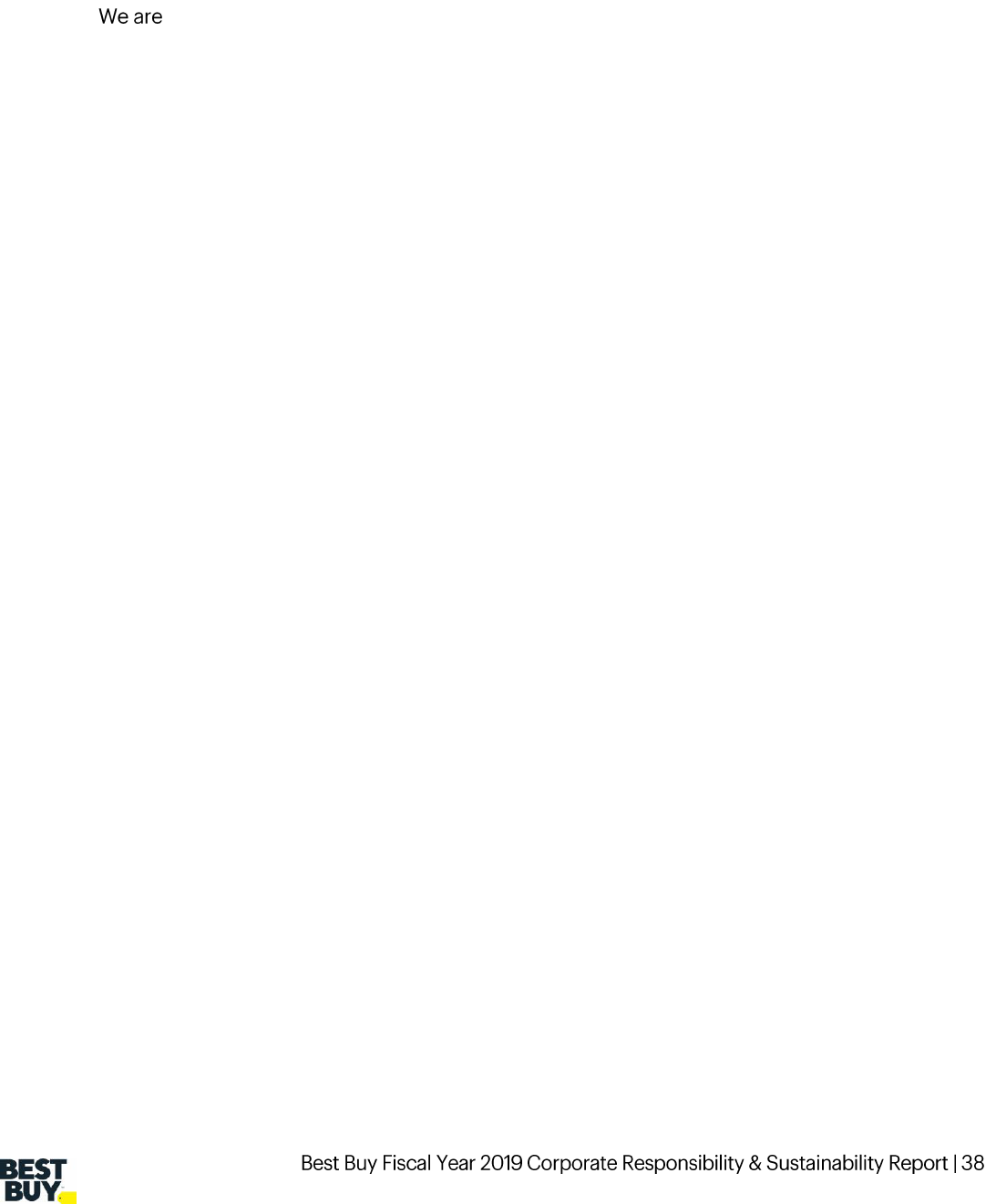
Internet of Things (IoT).
As smart home growth continues to expand in the products and services that we offer to new and existing
customers, we strive to address privacy concerns directly and give consumers control over their personal
data. We are achieving this through partnering with industry work groups to help explore standards in the
IoT space. working to establish a customer baseline of expectations in the area of security and
privacy with respect to IoT devices. Numerous public and private entities are developing testable standards
in this space that we believe could be adapted for scalable deployment. This will enable us to make
credible assortment decisions and to enable manfacturers, retailers, and service providers to make
consistent representations to customers regarding the security and privacy attributes of the IoT devices
they offer.
Health Insurance Portability and Accountability Act (HIPAA).
As Best Buy looks toward the health and wellness needs of consumers, we seek to expand what we sell and
evolve how we sell. With a focus on consumers taking charge of their health and those they care for, Best
Buy’s Assured Living provides a non-intrusive, sensor-based notification service that allows an aging parent
or loved one the freedom to live independently in their home. By enabling aging customers to stay at home
longer and thrive in their independence, we recognize partnerships with health care providers may allow
us to provide that experience for our customers and peace of mind for their loved ones. This means Best
Buy is exploring what it means to be HIPAA compliant on a large scale. HIPAA provides us guidance for
appropriately handling protected health information and helps us to prevent wrongful access to and
disclosure of that information. Best Buy takes the privacy, confidentiality and security of Protected Health
Information (PHI) seriously. We require all persons who access, use, or disclose protected health
information to be properly trained about HIPAA in order to comply with all state and federal laws for
safeguarding individually identifiable health information.
Training and awareness.
Best Buy has a privacy, security, and confidentiality training and awareness program called Valuable
Information Protection (VIP). VIP serves to shape employees’ perceptions about information protection to
help create a responsible, compliance-minded workforce that is knowledgeable about privacy and
information security policies, SOPs and best practices to keep Best Buy’s information safe as well as that of
our customers. The VIP program uses a variety of training tools and communication approaches to create
effective and engaging privacy and security awareness learning opportunities, with an emphasis on
making security and privacy training simple to understand and relevant to employees’ job functions.
Customers are able to read about our privacy practices and learn how they can control and protect their
personal information online.
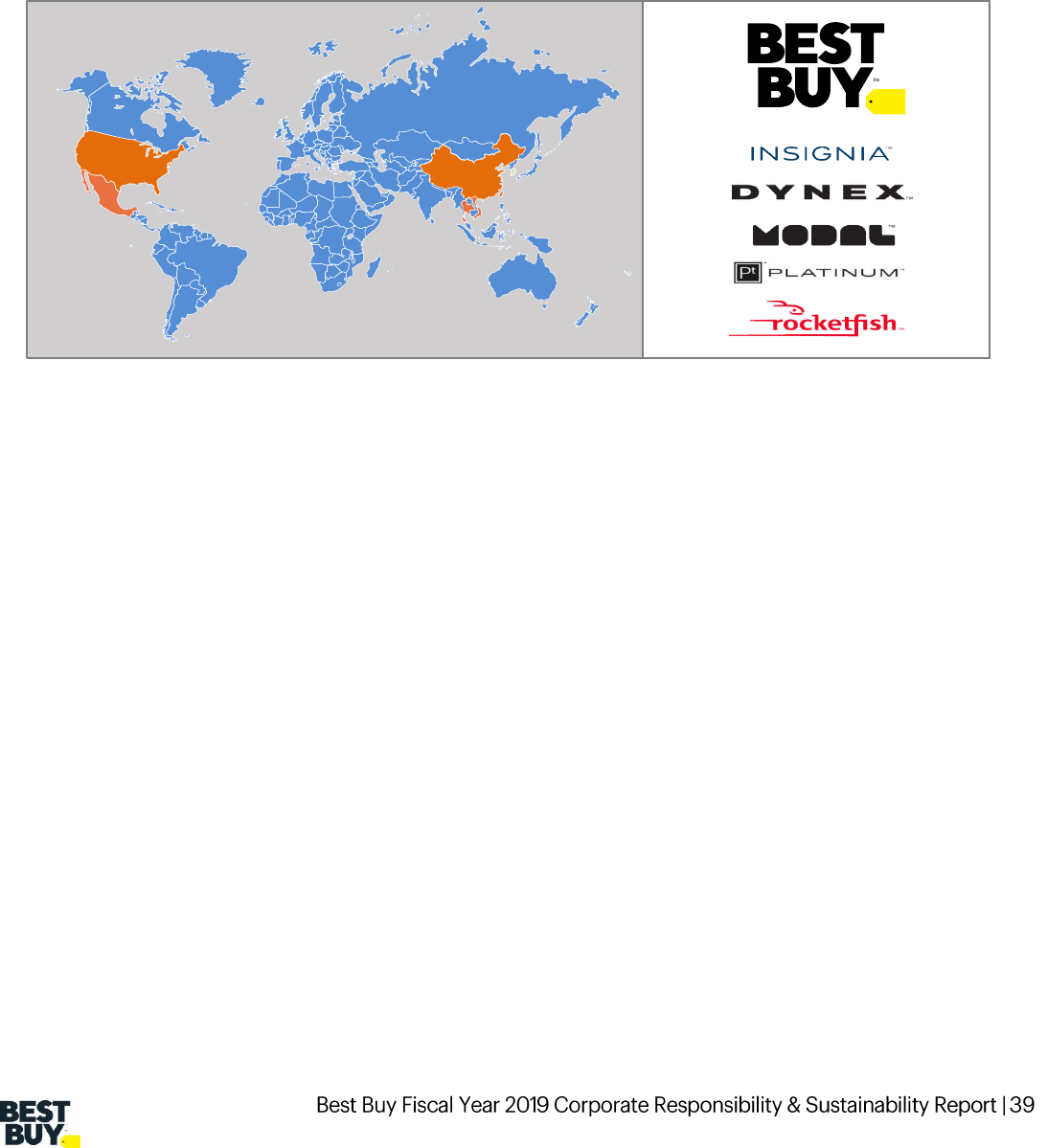
Supply Chain Sustainability Program.
Best Buy partners with approximately 170 factories, mainly in China, to produce our private-label (or
Exclusive Brands) products. We work with these suppliers on the design, production and testing of these
products, and we also partner with them to ensure they meet our expectations for safe workplaces where
workers are treated fairly and safely.
Through our Supply Chain Sustainability (SCS) program, we seek to mitigate risk, enhance the partnership
with our suppliers by helping build their capacity for responsible business practices, and create value for all
stakeholders. We hold a Full membership (the highest membership level) in the Responsible Business
Alliance (RBA). Further, we hold a leadership role in RBA by participating on its Board of Directors, which
allows us to partner with many of the brands we sell, including Apple, Intel, Microsoft and Samsung.
Collectively, we embrace a common supplier code of conduct and audit methodology that creates
business value by improving working and environmental conditions in the supply chain.
The supplier code of conduct, which is updated every three years by RBA, takes into account multiple
stakeholder perspectives. The full document is publicly available for current and potential suppliers via our
partner portal: Partners.BestBuy.com. In addition, RBA enables us to partner with our peers and vendor
partners on key labor issues through the Responsible Labor Initiative and Conflict Minerals through the
Responsible Minerals Initiative.
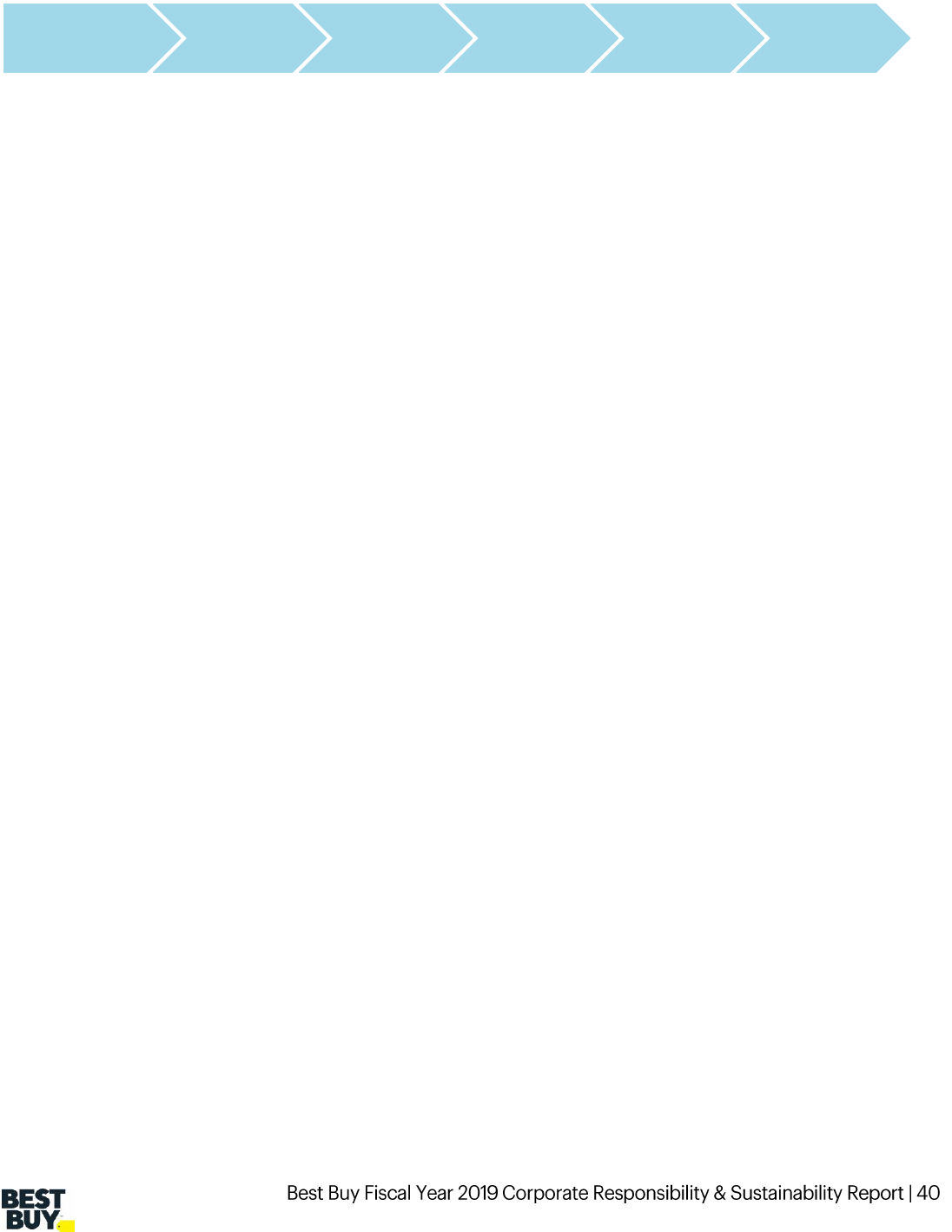
Part 1 – Code introduction and adoption.
Before working with new private-label suppliers, we provide an in-depth training on our code and program.
We also conduct a third-party audit of their facilities, which includes environmental and human rights
screening criteria. We screened our new factories using environmental and human rights criteria and
provided these suppliers with on-site training focused on the RBA code (version 6.0). When conducting
pre-contract screenings, we identify non-conformance and require the supplier to take corrective action. If
there is a priority non-conformance, it must be addressed immediately. Suppliers that are unwilling or
unable to address priority violations are rejected.
Beyond our suppliers, we train relevant internal functions on our code and critical risks such as human
trafficking and forced labor.
Part 2 – Self-reporting.
Existing suppliers assess their performance against the RBA code by completing an annual self-assessment
questionnaire (SAQ) and submitting quarterly key performance indicator (KPI) reports. The SAQs help us
better understand our suppliers’ policies and management systems, while KPI reports provide insight into
their sustainability practices and performance. In FY19, we achieved a 92 percent completion rate for SAQs
and an 90 percent completion rate for KPIs. Any supplier that does not provide either an SAQ or KPI report
is automatically considered a high-risk supplier and will be audited.
Part 3 – Risk assessment.
We evaluate our suppliers’ ability to meet the RBA code, which guides how we monitor their performance
and build their capacity. Our evaluation, using a recently optimized risk assessment tool, takes into
consideration several dimensions of business and social risk, specifically priority non-conformances such
as forced labor, as well as the factories’ willingness to be transparent. Based on the results of our
assessments, suppliers are classified by risk level. We focus our audits and capacity-building on those
suppliers identified as medium or high risk. Within the scope of the risk assessment, we include Tier 2
suppliers, in which we designate their use. By focusing our efforts, we believe we can more effectively
improve environmental practices, better protect worker rights and build a more reliable supply chain.
Part 4 – Monitoring.
For suppliers identified as high risk, a third party conducts an audit, and for medium-risk suppliers, Best Buy
conducts an audit to identify any gaps between the suppliers’ performance and the RBA code. We not only
assess their social and environmental performance, referred to as “practices compliance,” we also review
the management system they have in place to drive RBA code compliance, which is known as
“management compliance.”
Code Introduction
& Adoption
Self-
Reporting
Risk
Assessment
Monitoring
Capacity
Building
Reporting
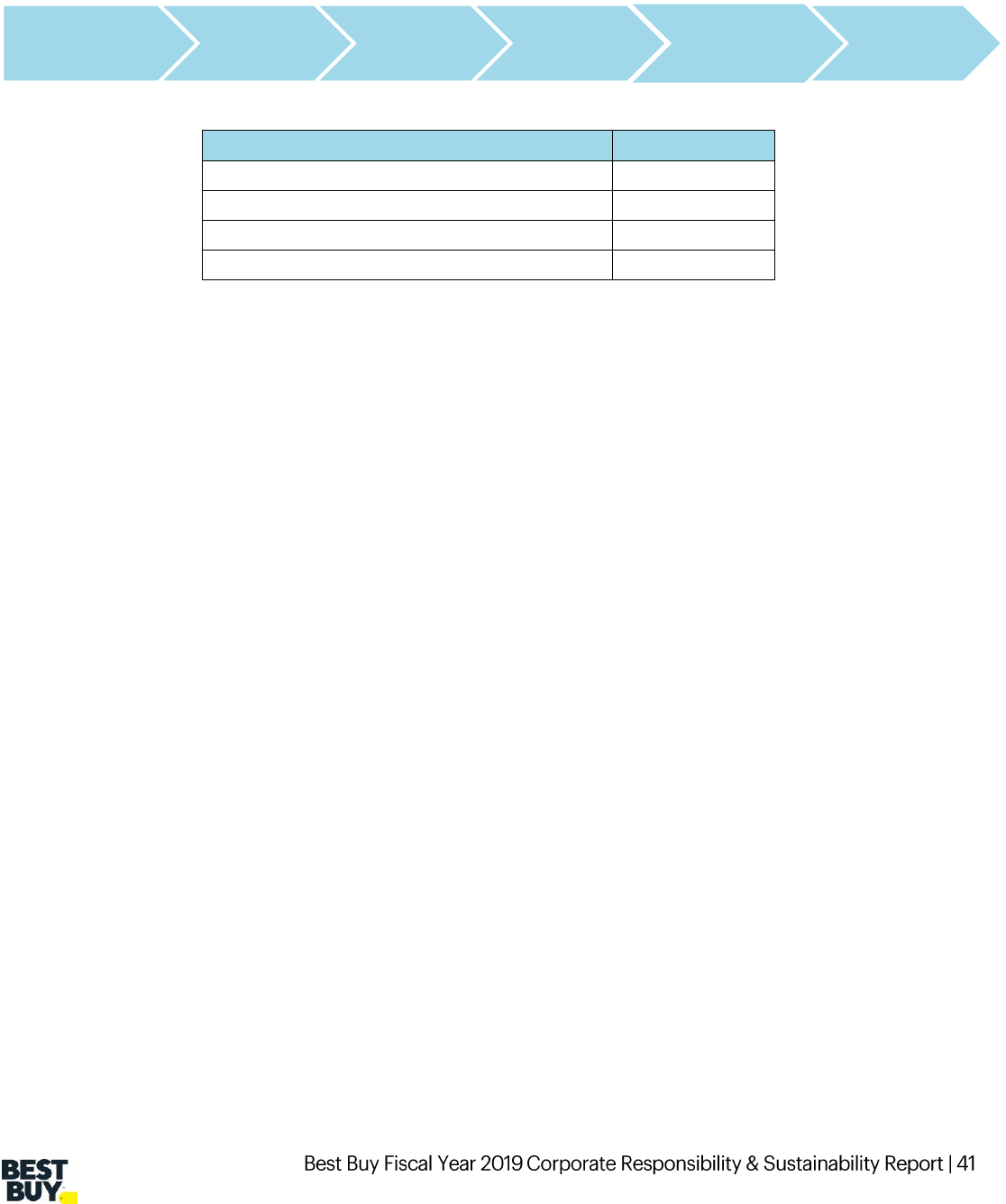
Audit steps.
Our audits are conducted by audit firms qualified by RBA. The steps to our audits include:
FY19 Audits
Amount
Factory Count (non-U.S.)
169
Number of Third Party-led Audits
105
Number of Best Buy-led Audits
39
Total Number of Audits
144
When non-conformance is discovered, we classify it into the following categories:
• Priority Non-conformance is the highest-severity audit finding requiring escalation by the auditor
and immediate attention by the vendor. Priority Non-conformance consists of findings that
represent: 1) a serious non-conformance of the RBA code or applicable legal requirements; 2) an
immediate threat to life or health; or 3) risk of serious and immediate harm to the community or
environment. The identification of any Priority Non-conformance automatically results in a failed
audit. Vendors must take immediate action to remedy all Priority Non-conformances through the
Priority Non-conformance Remediation Process. If the factory is unable or unwilling to close the
Priority Non-conformance, we will terminate the relationship.
• High Risk Major Non-conformance is a significant failure in the management system that affects
the ability of the system to produce the desired results and/or satisfy legally mandated
requirements. The identification of High Risk Major Non-Conformances will result in a High Risk
Warning. Two High Risk Warnings for the same non-conformance finding within a single year is
considered the equivalent of a Priority Non-conformance.
• Major Non-conformance is a significant failure in the management system that affects the ability of
the system to produce the desired results.
• Minor Non-conformance is an isolated or random incident which, by itself, does not indicate an
inherent problem with the management system.
For all types of non-conformance, we conduct follow-up audits to determine if violations — whether
priority, high risk major, major or minor — are resolved. All instances of non-conformance require a
corrective action plan, which we approve and monitor.
Opening
meeting
Factory
inspection
Document
review
Worker
interview
Management
interview
Closing
meeting
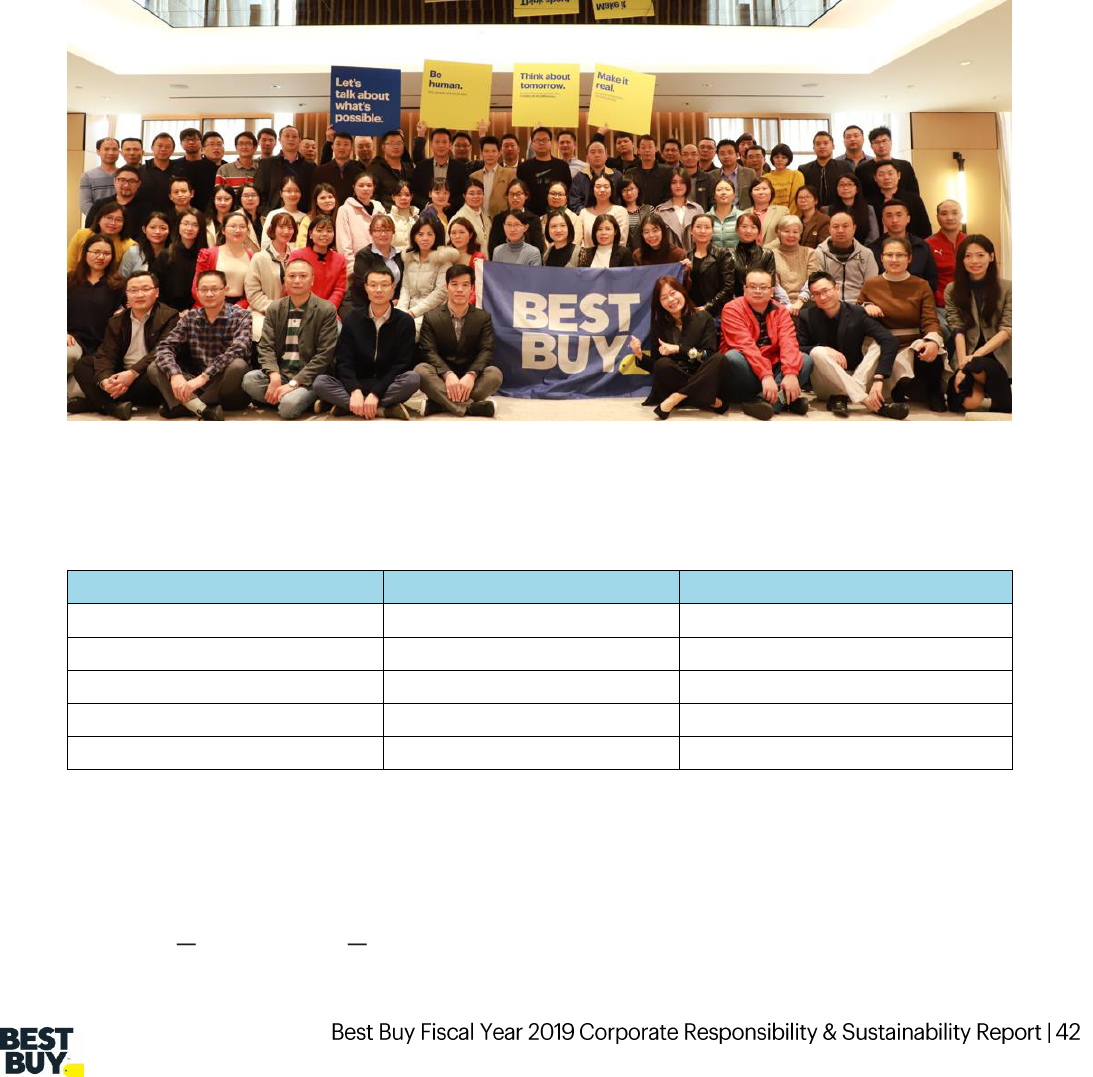
Part 5 – Capacity building.
We build our suppliers’ knowledge so they can close any gap between their performance and the RBA
code. We conduct annual trainings on the RBA code to ensure our suppliers have the tools to meet the
code, fully understand our expectations and move beyond compliance. We held a two-day RBA training for
our suppliers in FY19. Our suppliers rate their satisfaction of our training to help us continuously improve.
The satisfaction rate for our FY19 training was 4.88 out of 5.
Also in FY19, we launched a new online training tool for our vendors – the Exclusive Brands Supplier Online
Learning Academy. The tool allows the factories to take training courses at a time that is convenient to
them. Additionally, we can monitor the types and number of courses taken by vendors and administer tests
to demonstrate knowledge gained, increasing efficiency for both Best Buy and our suppliers.
Part 6 – Reporting.
Each year we publicly disclose our suppliers’ rates of compliance against the RBA code. The below chart
aggregates the performance of all suppliers across numerous checkpoints within the categories listed.
FY19 Audit Category
Practices Compliance
Management Compliance
Labor
73%
80%
Health and Safety
66%
91%
Environment
91%
93%
Ethics
100%
90%
Management System
100%
84%
In FY19, we did not find child labor, forced labor or freedom of association violations in the factories we
audited. If such a violation were to be found, it would be considered a priority violation — the highest
severity audit finding — and would require escalation by the auditor and immediate attention by the
vendor/factory. Best Buy suppliers are given remediation guidelines to ensure immediate corrective
actions are taken and sustained to ensure the protection of workers and a continued business
relationship with Best Buy.
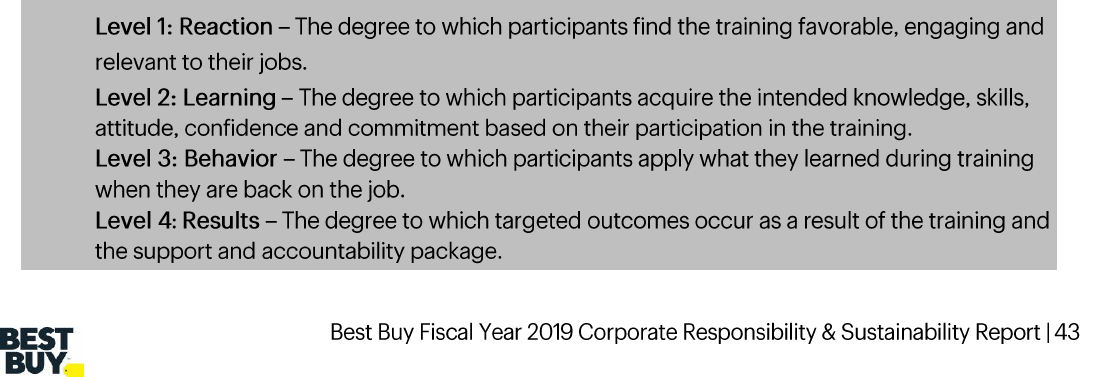
Addressing key issues: chemicals.
Chemicals have become a topic of concern in many industry supply chains, including electronics. We are
working with several multi-stakeholder organizations on this issue. In FY18, we released a Chemicals
Management Statement (Corporate.BestBuy.com/Sustainability), which includes a Restricted Substance
List for our products and for the use of chemicals in the manufacturing process.
To pilot our Chemicals Management Program, in FY18, we administered a survey and training to 22 private-
label suppliers in various product categories. As a result, we moved forward with launching the program
with all nine of our TV suppliers. In FY19, we expanded this program to all other private label product
categories and continue to provide support to our suppliers on their chemicals management.
Looking for opportunities to enhance worker morale and factory conditions.
Factories in China face a difficult labor market and often struggle to retain employees. This can have a
detrimental effect on the quality of products produced at a factory and the ability for a factory to be a
reliable supplier to Best Buy. In the past few years, leading brands have addressed these challenges by
conducting worker surveys to drive improvements in factory conditions. Worker surveys not only allow
companies to assess labor conditions at a factory, but also gain invaluable insights that can help factory
management better engage workers and strengthen overall business performance through higher
retention rates. Through a worker survey program, we are seeking to gain a deeper partnership with key
factories and to drive increased efficiency. At the same time, we are seeking to empower our suppliers,
increasing their ownership of sustainable business practices.
In FY16, Best Buy piloted a worker survey program with three factories. In FY17, we partnered with ELEVATE,
a supply chain consultant, to implement the program with six factories. The program included three
phases: baseline survey, training and improvement plan, and impact measurement.
Worker empowerment program.
Based on the results of the worker survey program, in FY19, we launched a new worker empowerment
program, moving beyond auditing to engage more deeply with workers. The program, in collaboration
with Verite, was designed to help our vendors improve their management practices and workers’ well-
being. We provided a series of training courses and worker engagement activities to build positive
relationships between management and workers as well as improve the efficiency of production. We chose
two strategic factories, engaging 45 supervisors and more than 200 workers.
•
•
•
•
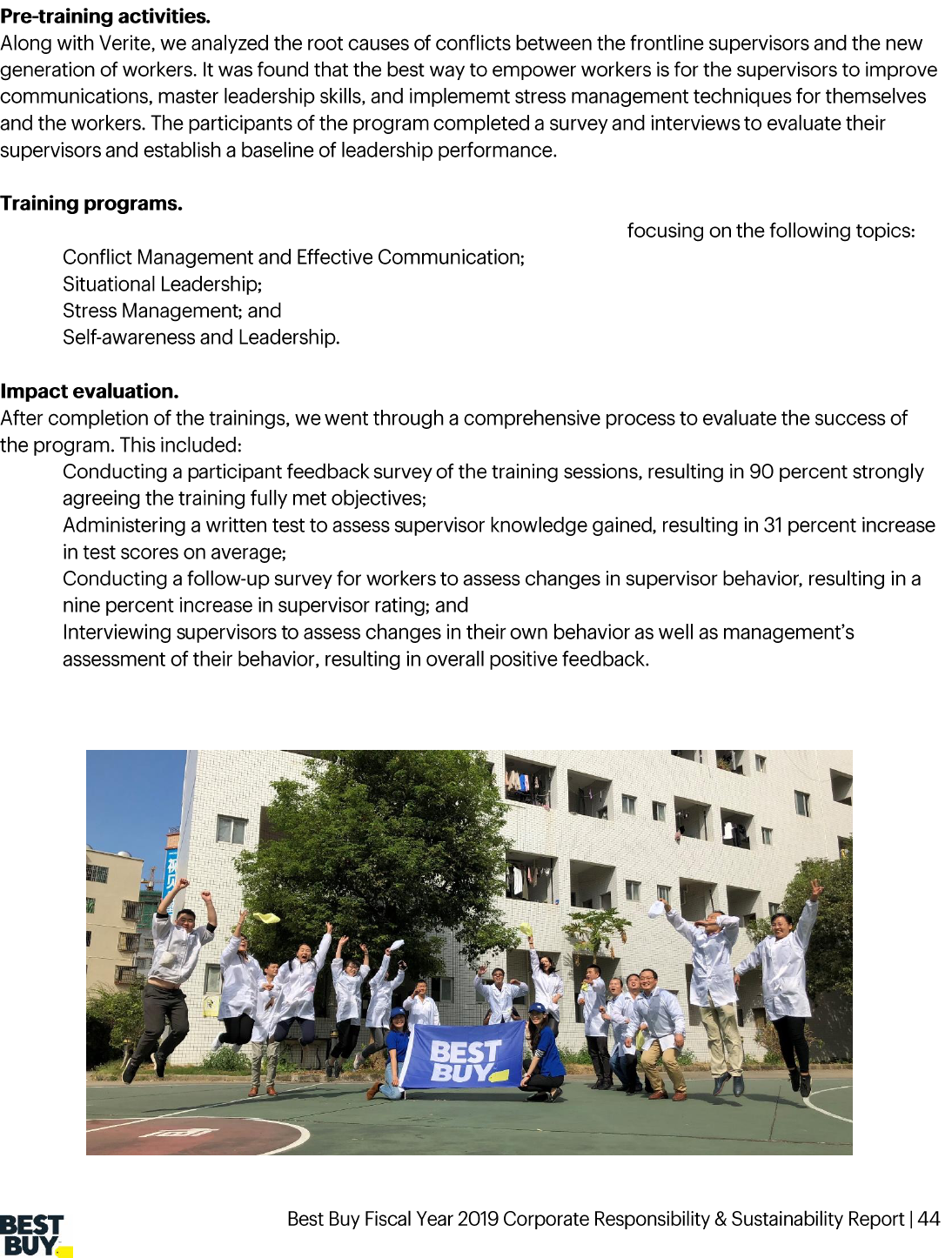
Using real-life scenarios, we conducted four in-person training sessions
•
•
•
•
•
•
•
•
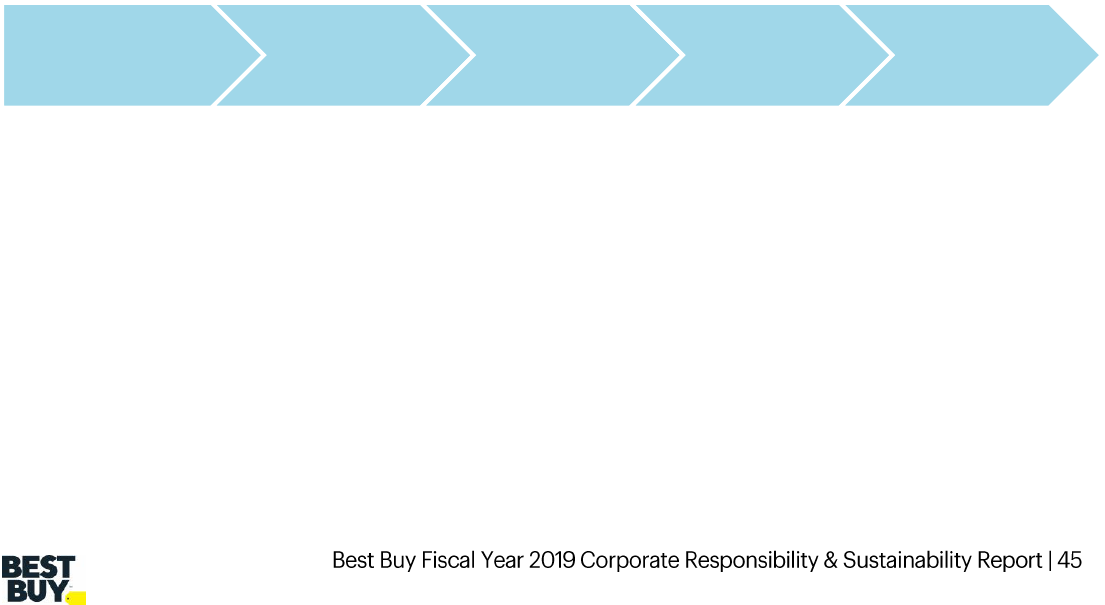
Conflict minerals.
The Democratic Republic of the Congo (DRC) and its neighboring countries have reserves of tin, tantalum,
tungsten and gold (known as 3TG), all of which are commonly used in the manufacturing of many
consumer products. Occasionally, these minerals are illegally sourced and traded in the eastern DRC and
surrounding areas by armed groups who are responsible for human rights violations. As such, these
minerals are known as “conflict minerals.”
In 2010, the United States passed into law Section 1502 of the Dodd-Frank Wall Street Reform and
Consumer Protection Act, which requires companies to disclose whether the 3TG used in their products
originated from the DRC or covered countries, as defined by the law.
Historically, we have had very limited engagement with parties beyond the direct suppliers (i.e., those
suppliers with which we have a contractual agreement) in our private-label supply chain. Consequently, it is
a significant challenge to identify, with certainty, the smelters, refiners and recyclers and the source of the
materials they process. One way we address this challenge is by participating in and, in some cases,
leading collaborative industry efforts that seek to gather accurate data about the sources of 3TG, and
encouraging smelters to be validated as conflict-free through third-party audits to ensure a supply chain in
which human rights abuses do not exist.
Due diligence.
To determine the source and chain of custody of 3TG used in our private-label products, we conducted
due diligence on our supply chain. Our due diligence process is based on the five-step Organisation for
Economic Cooperation and Development Due Diligence Guidance for Responsible Supply Chains of
Minerals from Conflict-Affected and High-Risk Areas (OECD Guidance), an internationally recognized due
diligence framework.
Performance of our due diligence measures.
We are working with consumer electronics and retail industry peers to maximize the efficiency and
effectiveness of our efforts to identify relevant smelters and refiners, and encourage their participation in
the Responsible Mining Initiative’s (RMI) Responsible Minerals Assurance Process (RMAP), or an equivalent
program, including the London Bullion Market Association’s (LBMA) Good Delivery program and the
Responsible Jewellery Council’s (RJC) Chain of Custody program.
We have a Conflict Minerals Policy that establishes our Exclusive Brands’ commitment regarding the
sourcing of 3TG. Such commitments include aligning with the OECD Guidance, supporting industry efforts
and seeking to avoid sourcing 3TG that directly or indirectly benefit non-state armed groups. The policy
also establishes expectations for our private-label suppliers, including their application of relevant aspects
of the OECD Guidance, supporting our efforts to identify smelters and refiners by completing an annual
Establish
Management
System
Identify and
Assess Risks
Respond to
Risks
Audit
Supply
Chain
Report
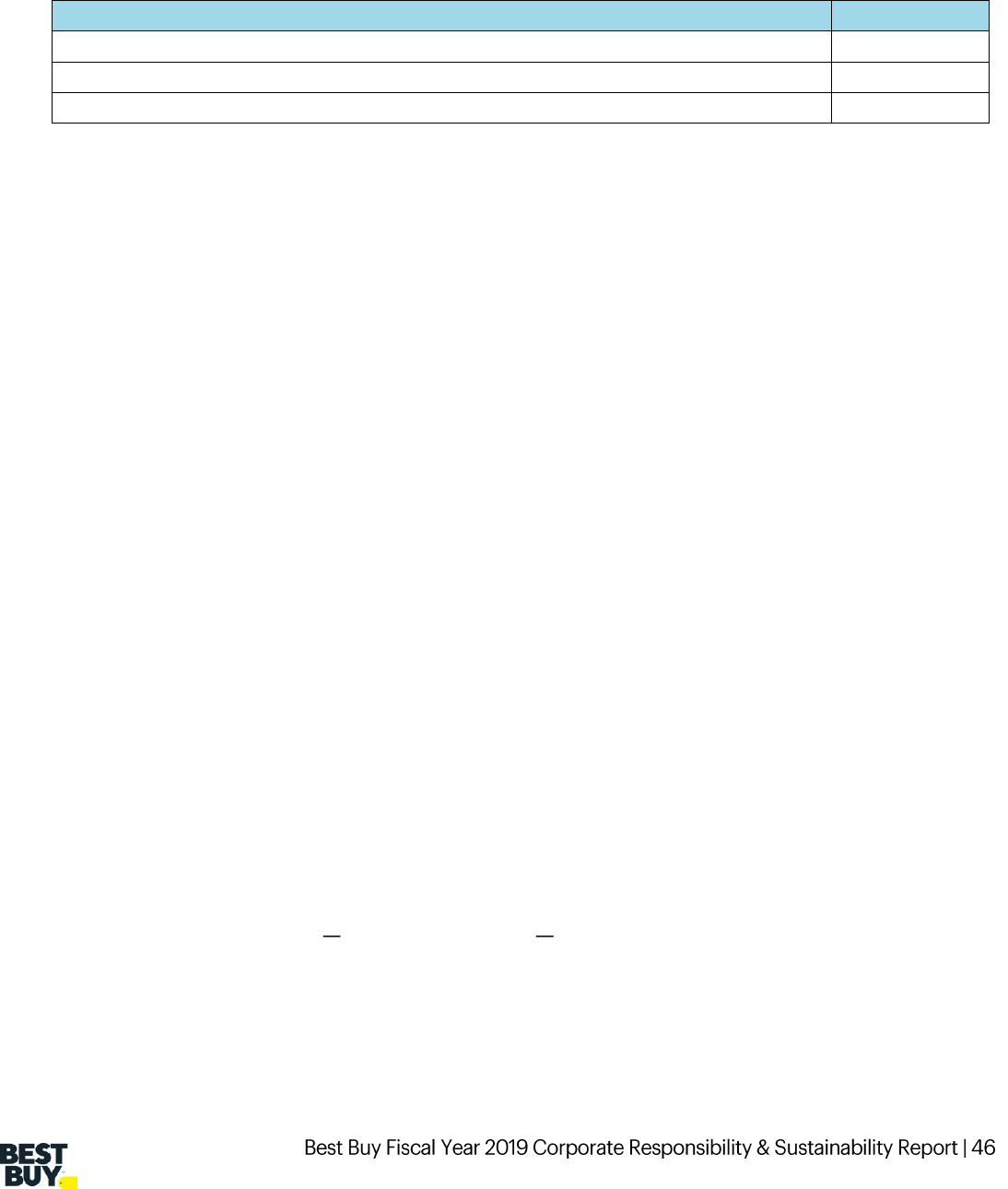
Conflict Minerals Reporting Template, and specifically requires our suppliers to utilize smelters and refiners
who have successfully completed a third-party audit of their due diligence practices. Our policy can be
found at Corporate.BestBuy.com/Sustainability.
FY19 Conflict Mineral Program Key Performance Indicator
Percentage
Exclusive Brands factories that attended training
90%
3TG products that have had their supply chains surveyed
100%
Exclusive Brands factories that returned a CMRT
100%
Given our position in the supply chain, we relied heavily on our direct suppliers to provide information
about the smelters that processed the 3TG used in our products.
Because we do not have a direct relationship with any smelters in our supply chain, we do not conduct
audits. Instead, we support the development and implementation of an effective smelter audit program
through our membership in the RMI, which administers them.
The RMI coordinates independent, third-party audits to validate that smelters source conflict-free materials.
We support many RMI activities, including serving as the Chair of the RMI Steering Committee and as the
Chair of the Smelter Engagement Team (SET) and Co-Chair of the China SET, which conducts coordinated
outreach to known smelters to encourage them to be audited.
To date, more than 98 percent of the processing facilities reported by our suppliers have been found
conformant to the RMI, LBMA or RJC standard via an independent, third-party audit or have committed to
go through an audit. Nevertheless, based on our due diligence process and the subsequent information we
gathered, we are unable to determine the origin of all the 3TG used in our products and whether armed
DRC groups directly or indirectly benefitted. This is primarily because of the lack of transparency among
smelters who have not yet been audited. While there have been improvements in the systems of
transparency and control for the sourcing of 3TG necessary to the functionality and/or production of our
Exclusive Brands products, these results are not unexpected, especially given our downstream position as
a retailer and manufacturer of Exclusive Brands products.
Of the smelters and refiners provided by our suppliers, we identified 40 instances for which we had reason
to believe that at least a portion of the 3TG they processed may have originated in the DRC or a
neighboring country and may not have been from recycled or scrap sources. All 40 of these processing
facilities have been found conformant through RMAP or another third-party audit scheme. Furthermore, we
have not identified a supplier, smelter or refiner that we have reason to believe may be sourcing from the
DRC or a neighboring country and directly or indirectly benefitting armed groups.
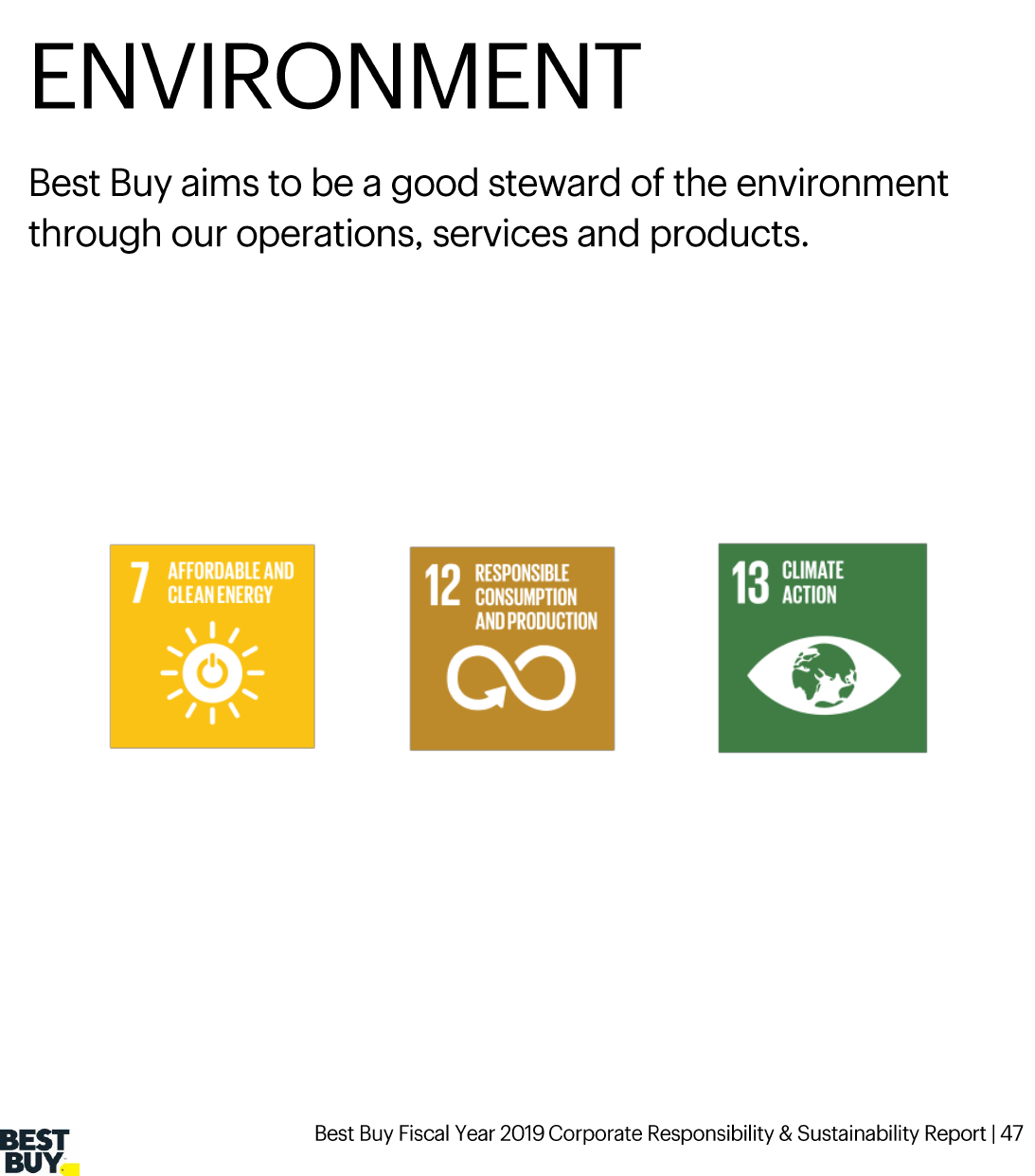

Managing environmental impacts.
Best Buy works hard to be a good steward of the environment. We focus on reducing our environmental
impacts, and we aim to help our customers live more sustainably.
The backbone of our environmental programs is our ISO 14001-certified Environmental Management
System (EMS) and covers all U.S. operations. Our EMS helps us systematically manage progress toward our
environmental goals and commitments and ensure that we are in compliance with all applicable laws and
regulations. In June 2012, we were the first U.S. large-format retailer to earn this certification, and in June
2018 we earned certification to the newest standard, ISO 14001:2015.
As part of our Environmental Statement (Corporate.BestBuy.com/Sustainability), Best Buy is committed
to protecting the environment, conserving natural resources and preventing pollution by systematically
managing and continually improving our environmental performance. We positively impact the world
through these actions:
• Addressing climate change by reducing carbon emissions and sourcing renewable energy;
• Helping customers live more sustainably by providing an assortment of sustainable products and
information to make informed decisions;
• Extending the life of technology, giving products a second life and recycling responsibly; and
• Complying with all applicable environmental legal requirements.
We are pleased to report there were no significant fines or non-monetary sanctions implemented against
Best Buy for environmental non-compliance in FY19.
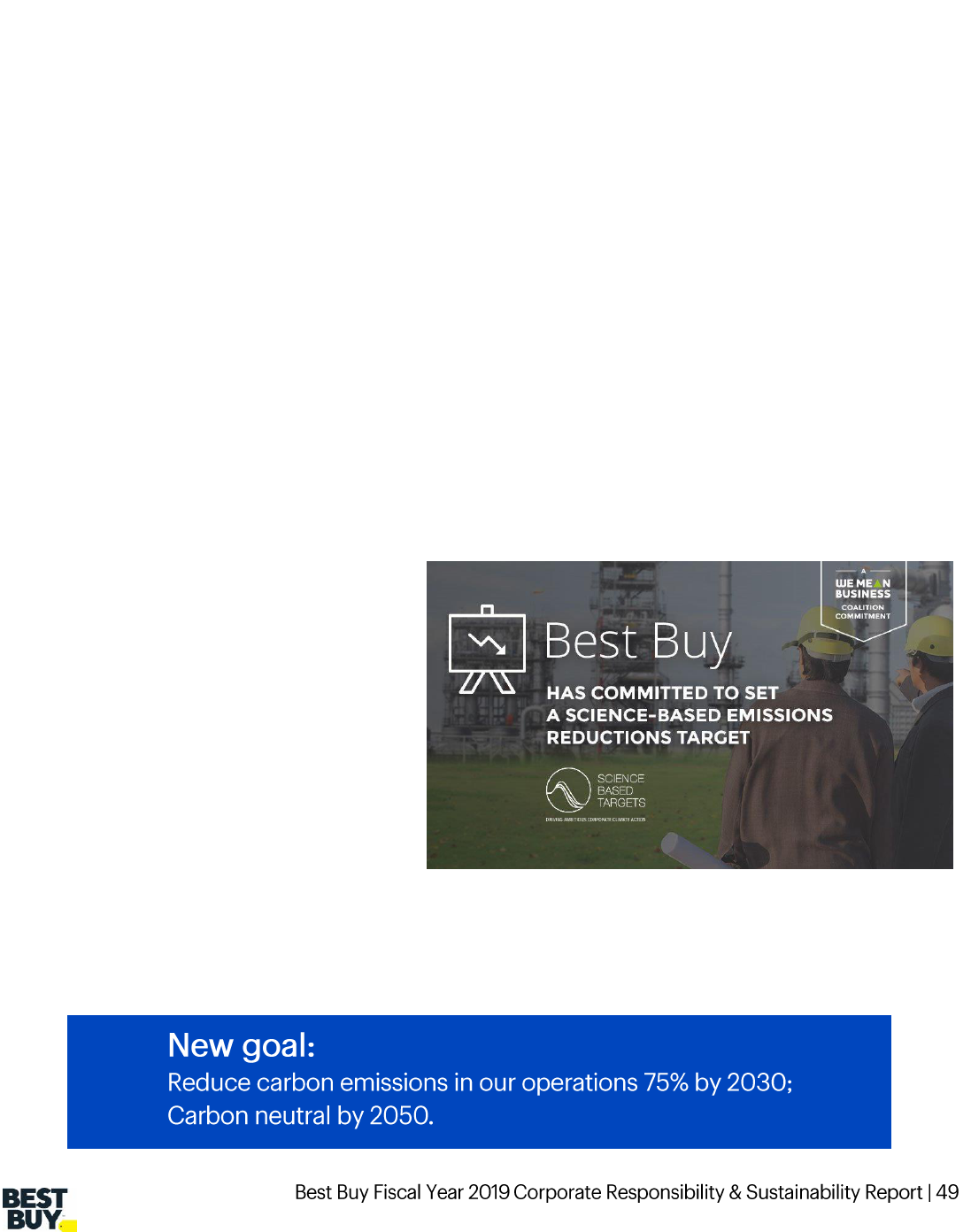
Addressing climate change in our operations.
While the issue of climate change is worldwide, the impact is felt by people in the communities where we
live and work in the form of severe weather, rising temperatures, flooding and water shortages.
In December 2019, Best Buy attended in the United Nations Climate Change Conference (COP24) in
Katowice, Poland as part of Climate Generation’s Window into COP24 program. Climate Generation: A Will
Steger Legacy is an organization dedicated to climate education, youth leadership and citizen engagement
for innovative climate change solutions. Its Window in COP program has brought educators, students,
elected officials and community members from Minnesota to COP negotiations. We attended as a member
of the business community expressing support for collective action against climate change.
We are committed to addressing climate change by finding cost-effective solutions to save energy and
directly reduce carbon emissions through operational improvements and sourcing renewable energy.
Carbon reduction is not only the right thing for the planet, but it makes good business sense, driving
efficiencies and cost savings.
Setting a Science-based goal.
Carbon reduction has been a priority for Best Buy for more than a decade. In FY18, we announced a goal to
reduce carbon emissions by 60 percent by 2020 (over a 2009 baseline) and reach carbon neutrality in our
operations by 2050. After achieving a 51-
percent reduction, we had the ambition and
responsibility to do more, so we re-set our
carbon goal to be aligned with Science Based
Target Inititative (SBTi). Carbon targets are
considered “Science-based” if they are in line
with the reduction required to keep the
global temperature increase below 2°C as
outlined in the Fifth Assessment Report of the
Intergovernmental Panel on Climate Change
(IPCC).
Our new goal is to reduce carbon emissions in our operations by 75 percent by 2030 (over a 2009
baseline), which puts on the trajectory to achieve our goal to be carbon neutral by 2050. The second part
of our science-based goal includes the use of sold product (scope 3 emissions), discussed on page 52.
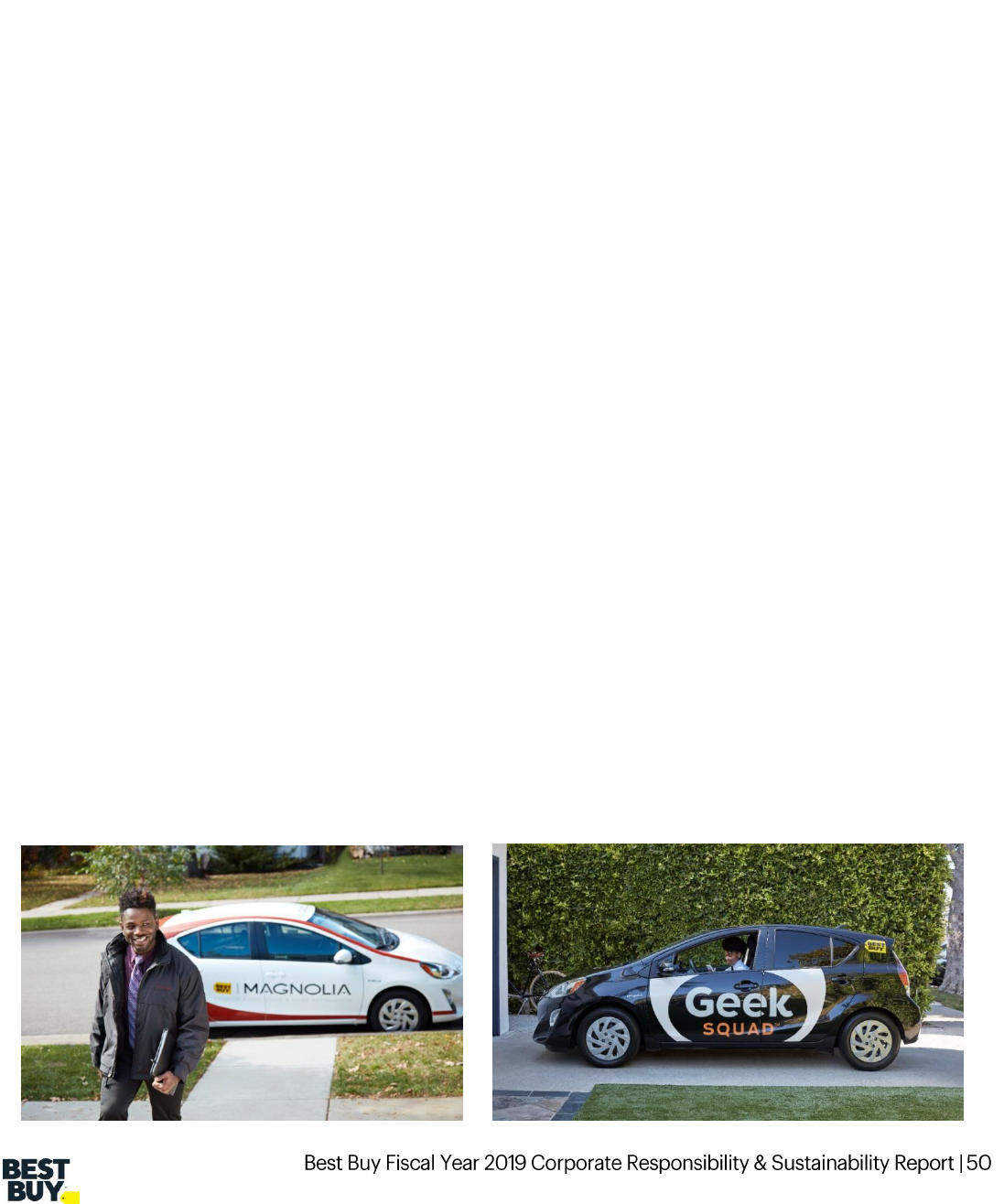
Energy-efficient operations.
We will continue to embrace technology and process improvements to drive energy-efficient operations.
The energy management system we have been using in our stores since 2012 has been a substantial factor
in our past carbon reduction. It allows us to automate the lighting, heating and air conditioning, thereby
optimizing store energy usage. In FY19, we made several changes to our stores and distribution centers
including:
• Installing overhead LED lighting in more than 500 stores;
• Replacing many HVAC systems with more efficient equipment; and
• Retrofitting parking lot and other outdoor lighting with energy-efficient fixtures.
We also closely manage the carbon emissions of our fleet of more than 5,000 Geek Squad vehicles. We
aim to use smaller vehicles as often as possible and map the most efficient routes to our destinations. In
FY17, we introduced a new Geekmobile fleet composed of more than 1,200 Toyota Prius c hybrids. Geek
Squad selected the Toyota Prius c because of its innovative engineering, low cost to maintain and
environmental advantages. We currently operate more than 1,400 hybrid vehicles in our fleet.
We are also part of the Department of Energy’s National Clean Fleets Partnership. This public-private
partnership provides fleets with resources, expertise and support to incorporate fuel-saving measures into
operations.
In addition to our customer-facing vehicles, we closely manage our fleet of inventory distribution trucks.
We continue to reduce “empty miles” (miles driven with no products in the truck) by backhauling e-waste
to the distribution centers, where it is collected by our recycling partners.
We require our dedicated fleet transportation partners to follow these requirements:
• Be certified through the EPA’s SmartWay program;
• Follow the Coalition for Responsible Transportation’s standards for trucks and engines; and
• Adhere to our “no idling” policy.
A challenge we face as we become a more services-based company, is more customer visits, increasing
the miles driven by our fleet of vehicles.
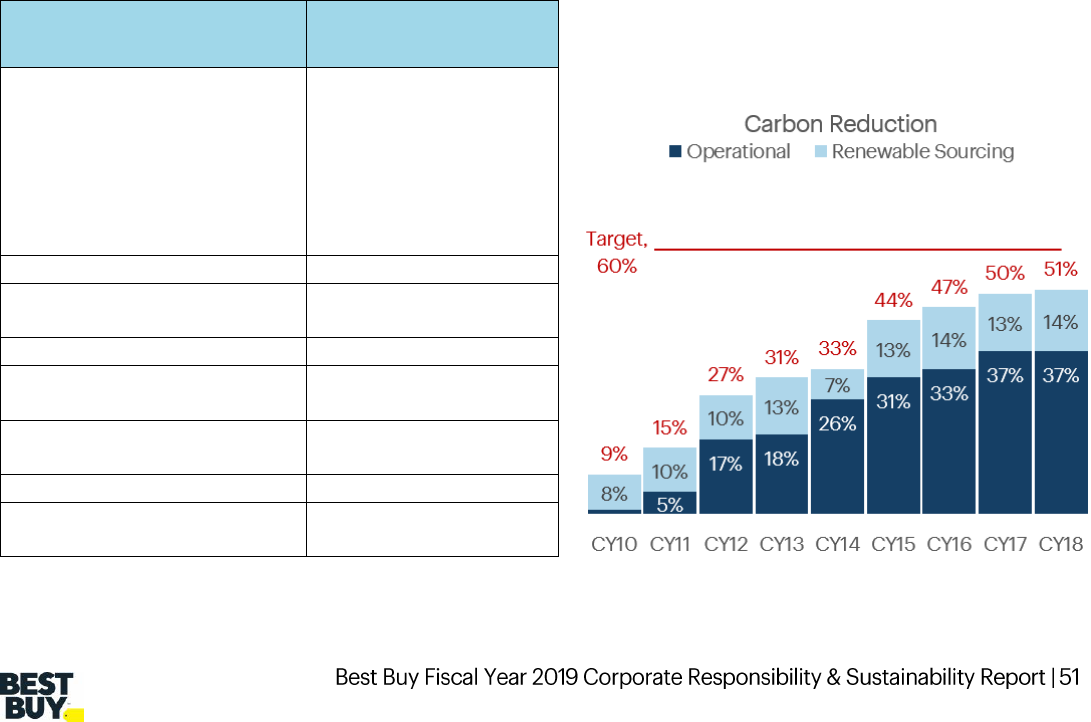
Renewable energy.
We are placing increased focus on securing offsite renewable energy sources and purchasing Renewable
Energy Credits (RECs). Our offset target is equal to 20 percent of our 2009 baseline carbon emissions. In
calendar year 2018, we offset approximately 35 percent of our U.S. electricity through RECs. Historically,
our primary renewable sourcing method has been RECs. As we look forward, we continue to investigate
and perhaps deploy onsite and offsite renewables and to opt in to green tariffs from our utility partners.
Carbon reporting.
Since 2008, we have disclosed carbon emissions data to CDP (formerly known as the Carbon Disclosure
Project). In FY19, we were recognized as a global leader in addressing climate change by earning a spot on
the CDP Climate A List for the third time. This puts Best Buy among the top 5 percent of all companies
participating in CDP’s climate change program. We are one of only two U.S. big-box retailers named to this
year’s A List of 126 companies.
The methodologies used to report our energy consumption include:
• The Greenhouse Gas Protocol: A Corporate Accounting and Reporting Standard (Revised Edition);
• U.S. EPA Climate Leaders: Direct Emissions from Stationary Combustion;
• U.S. EPA Climate Leaders: Direct HFC and PFC Emissions from Use of Refrigeration and Air
Conditioning Equipment; and
• The Climate Registry: General Reporting Protocol.
Key Performance
Indicator
DATA
Energy consumption within the
organization
Fuel consumption:
3,153,733,200,000,000
joules
Electricity consumption:
1,000,159 MWh
Total scope 1 and 2:
1,876,196 MWh
Energy intensity
.043 MWh/Sq Ft
Reduction of energy
consumption
76,141 MWh or 4.2%
increase YOY
Direct GHG emissions (Scope 1)
237,327 MT CO
2
e
Energy indirect GHG emissions
(Scope 2)
263,426 MT CO
2
e
Other indirect GHG emissions
(Scope 3)*
22,821,458 MT CO
2
e
GHG emissions intensity**
.015 MT CO
2
e/Sq Ft
Reduction of GHG emissions
17,153 MT CO
2
e, or 2.7%
increase YOY
*We now are reporting the emissions for the lifetime of the product when the product was purchased. Previous calculations
were one year of emissions only.
**Number does not include RECs.
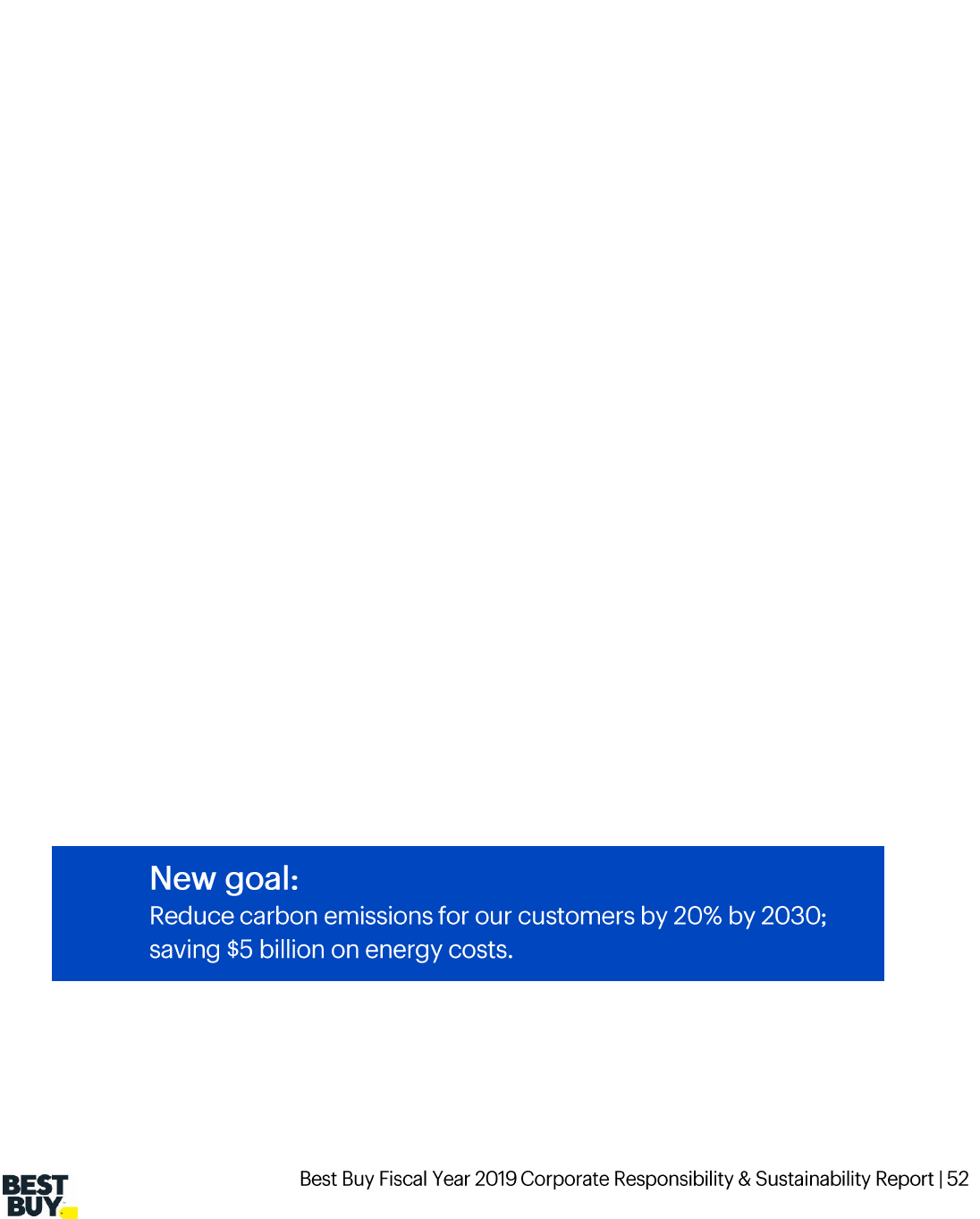
Helping our customers live sustainably.
Carbon emissions from the use of products that Best Buy sells is significantly greater than the carbon
emmitted in our operations. In fact, in 2017, emissions from customer product use was significantly greater
than that of our operational carbon use. Best Buy has been committed to providing customers with a wide
assortment of sustainable products for years. However, with the ability to make such an impact, we set a
new goal to help our customers reduce their emissions by 20 percent by 2030 (over a 2017 baseline),
saving them $5 billion in energy costs. This scope 3 emissions target is part of our SBTi carbon goals.
Promoting eco-labels.
Best Buy offers a large selection of ENERGY STAR
®
certified products to help our customers save money,
reduce energy use and protect the environment by meeting strict energy guidelines set by the U.S.
Environmental Protection Agency (EPA) and the U.S. Department of Energy. Our U.S. customers purchased
nearly 19 million ENERGY STAR certified products in FY19 and realized utility bill savings of more than $88
million
1
. This energy savings equates to more than 1 billion pounds of CO
2
emissions avoidance
2
, or the
equivalent of removing approximately 100,000 cars from the road for a year
3
. Learn more about U.S.
ENERGY STAR certified products at BestBuy.com/ENERGYSTAR.
In FY19, the EPA named Best Buy an ENERGY STAR Retail Partner of the Year for the sixth consecutive year.
This award is based on our outstanding marketing and customer education of the benefits of ENERGY
STAR certified products. Over the past 10 years, we trained more than 155,000 Blue Shirts on the benefits
of ENERGY STAR certified products. We also educated customers about ENERGY STAR in stores and
online. The ENERGY STAR logo is featured on all applicable fact tags in stores and our Best Buy ENERGY
STAR video plays on in-store televisions throughout the year.
In addition to ENERGY STAR, which focuses on the customer-use phase, we identify, mark and promote
EPEAT
®
products for our business customers. These products are rated on more than 50 environmental-
performance criteria regarding design, production, energy use, product longevity and recyclability — with
ongoing, independent verification of manufacturer claims. Materials used in TVs, computers and printers
contain reduced amounts of hazardous materials, such as mercury and lead.
1. Savings based on Best Buy's FY19 sales and the difference in U.S. EPA’s ENERGY STAR Program data regarding annual unit energy consumption between non-
ENERGY STAR certified products and ENERGY STAR certified products. Electricity rate is $0.130/kWh.
2. Savings based on Best Buy's FY19 sales and the difference in U.S. EPA's ENERGY STAR Program data regarding annual unit energy consumption between non-
ENERGY STAR certified products and ENERGY STAR certified products. Emissions factors are 1.56 pounds CO
2
/kWh.
3. Savings based on Best Buy's FY19 sales and the difference in U.S. EPA's ENERGY STAR Program data regarding annual unit energy consumption between non-
ENERGY STAR certified products and ENERGY STAR certified products. Emissions factors are 1.56 pounds CO2/kWh and 10,383 pounds CO2/car/year.
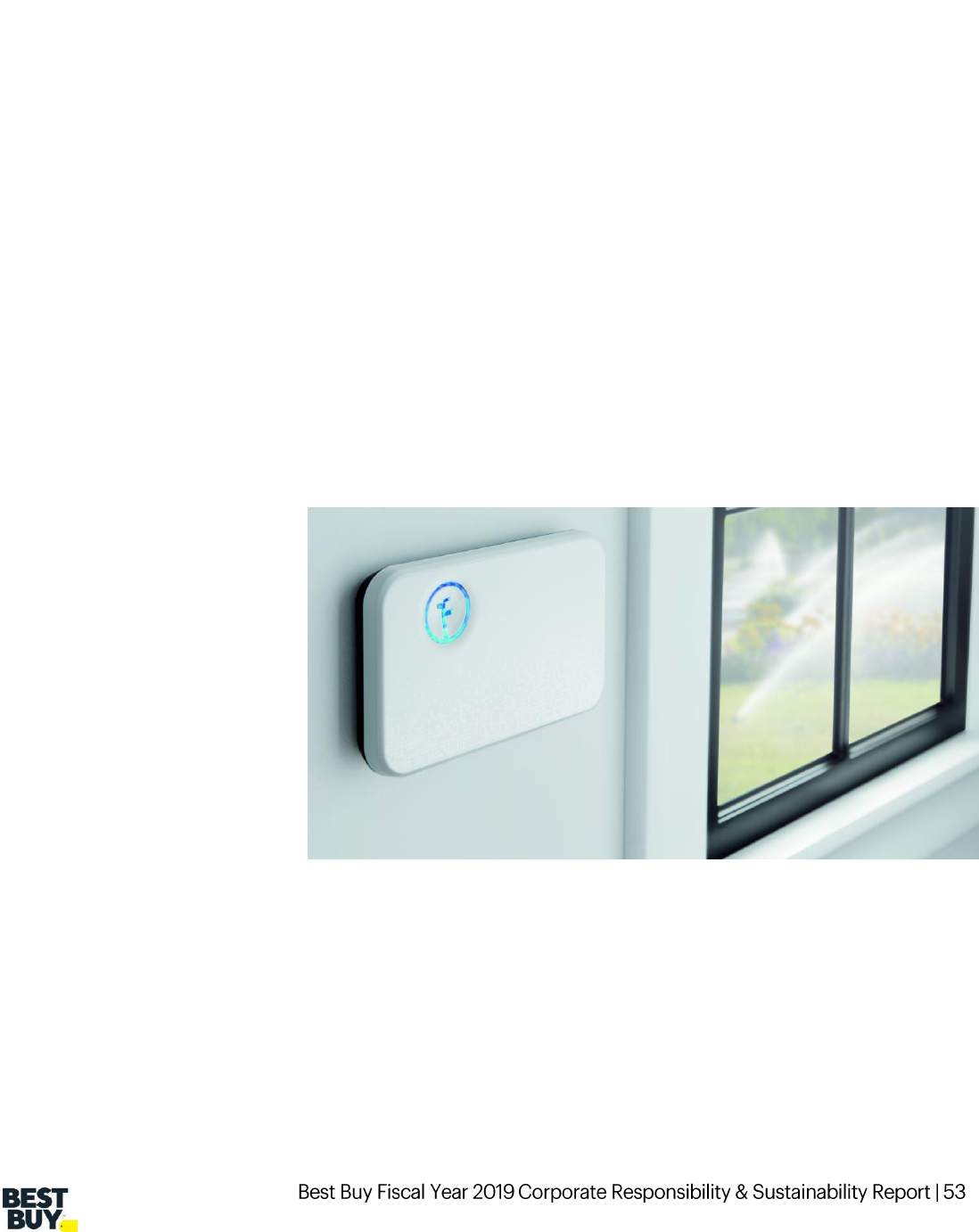
Sustainable tech.
A growing category for Best Buy, called smart home, features smart or connected devices that automate
functions in a home. These products not only make our customers’ lives easier and provide peace of mind,
but many also deliver environmental benefits, making a smart home a more sustainable home. Examples
include:
Smart thermostats.
Smart thermostats save money and energy while improving the comfort of customers’ homes. These
devices are “smart” because they can observe patterns and make adjustments, such as turning off when
the house is empty and dynamically building a profile based on actual household schedule, not pre-
programmed inputs. This optimized performance not only reduces utility bills, it extends the lifespan of the
home’s heating and cooling equipment. The Nest thermostat, for example, can save 12 percent on heating
and 15 percent on cooling.
Smart lighting.
LED light bulbs are more energy efficient, contain fewer hazardous chemicals and last longer than a
traditional bulb. Smart lighting systems provide even more power reduction options such as remote
access and geo-fencing technology.
Smart irrigation.
Select Best Buy stores carry a
Wi-Fi enabled irrigation control
that utilizes real-time weather
data and analytics to use less
water while maintaining a
healthy yard. The system can
conserve 15 to 40 percent of
water usage. That’s thousands
of gallons of water per year, per
household, which is especially
relevant in parts of the U.S.
where water scarcity is an issue.
Energy tracking and control.
Another energy-saving product that can be found at Best Buy stores is a home energy meter and smart
plug, which helps customers monitor electricity consumption real-time from a smartphone. These
products can help identify the products in a home that are using an excessive amount of energy and
operate the electronics remotely, saving energy.
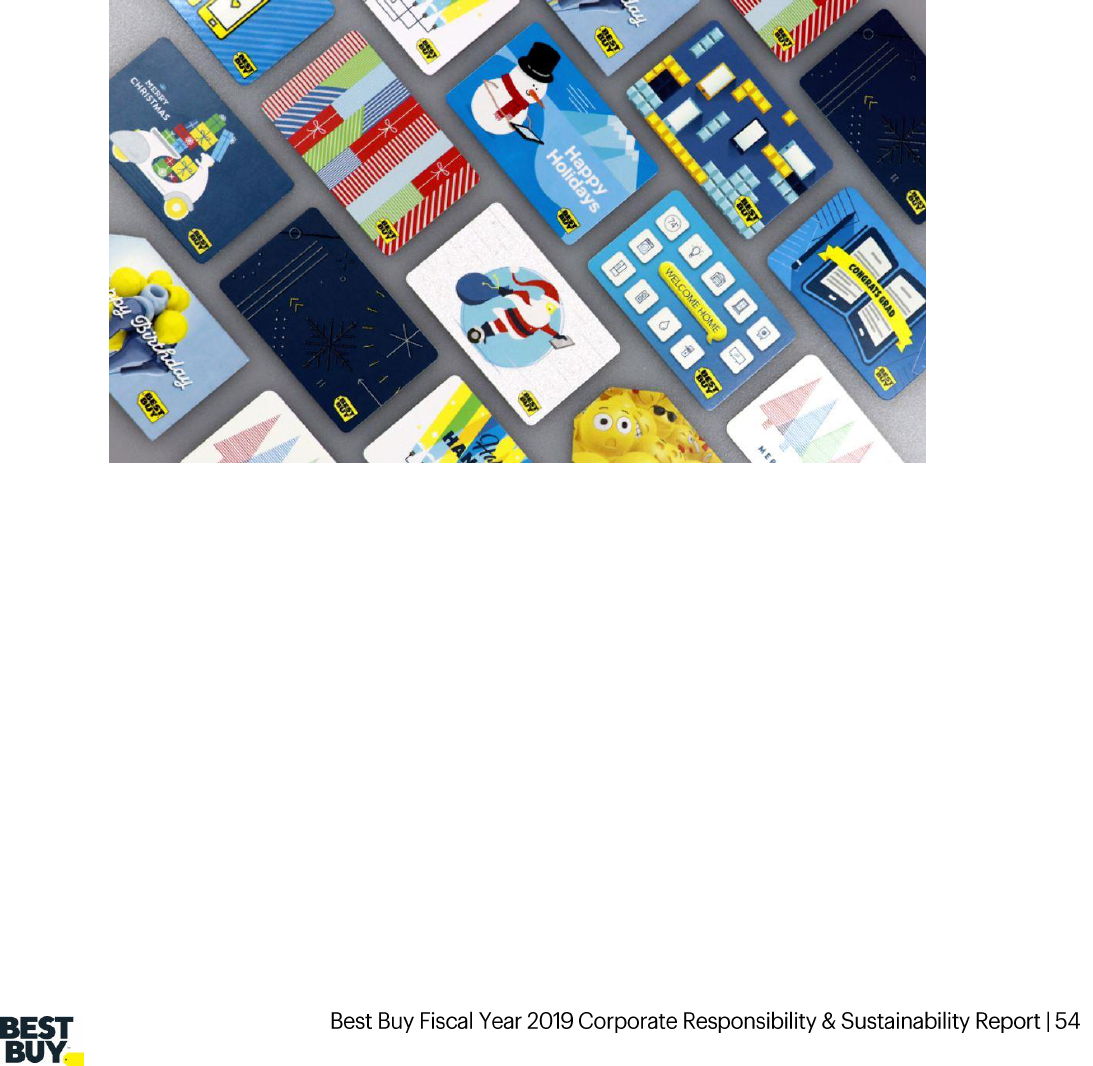
Paper gift cards.
Paper gift cards have come a long way since we started the transition from plastic six years ago. We
partnered with paper mills to innovate on design, materials and production. Now we have a sturdy card
made of FSC-certified paper and water-soluble ink that can go right into a curbside recycling bin. This year,
seven of our eight holiday-themed gift cards were made of paper. And we’re not stopping there. We are
aiming for 100 percent of our in-store gift cards to be made of paper by next year, and we’re also reducing
the size of the packaging the cards come in. With the transition to paper gift cards, To date, we estimate a
savings of 60 tons of plastic from going into landfills. And proving that sustainability is good for business,
our new gift cards are actually less expensive to produce than plastic.

Chemicals in products.
Over the past several years, there has been heightened awareness about potentially hazardous chemicals
in products. We are actively working to protect our consumers and employees through providing safer
alternatives or by eliminating potentially harmful chemicals.
In FY18, we released a Chemicals Management Statement, located at
Corporate.BestBuy.com/Sustainability, which outlines how we seek to reduce the use of chemicals,
phase out chemicals of concern and improve the general management of chemicals.
Our efforts focus on where we can make the greatest impact:
• Within our corporate, retail, service and distribution operations, we actively look for
opportunities to reduce the use of chemicals. Whenever possible, we work to transition to safer
alternatives, with a preference for EPA Safer Choice chemicals.
• For our private-label and direct import products, we outline supplier requirements regarding the
use of chemicals in products as well as those used in the manufacturing process. Best Buy
maintains a detailed Restricted Substance List (RSL), which specifies chemicals restricted based
upon regulations or known hazards, and chemicals suppliers are required to report usage to us.
o Each of our product specification documents include chemical requirements, and
increasingly rigorous assurances and testing of products are required based upon the
level of risk. Further, we partner with suppliers to identify opportunities to transition to
preferred chemicals.
o As part of our regular audit program, we monitor factories to assure adherence to our
RSL as well as our Supplier Code of Conduct, which specifies safe chemical procedures,
and we require improvements when we find gaps. Best Buy provides training to help
factories improve their chemical management processes, including the understanding of
risks and the importance of taking proper precautions.
o We also ensure 100 percent of our suppliers are audited to the International
Electrotechnical Commission Quality Assessment (IECQ) 080000, which is the standard
for assessing hazardous substances in electronics.
• We provide our vendor partners easy access to our chemical management documents and tools
via our partner portal, Partners.BestBuy.com. We recognize the interdependence of the
electronics supply chain and, by sharing these resources, we hope to support greater awareness
and alignment within the industry on voluntary actions to manage chemicals.
• Through our recycling program, we partner with the most qualified electronics and appliance
recyclers and hold them to the highest industry standards to ensure products and components
are reused, recycled, or disposed of properly at end of life and that chemical risks are managed
properly. Our recycling standards are publicly available on our corporate website.
Collaboration among stakeholders is critical to improving the complex issue of managing chemicals in the
electronics industry. To this end, we will continue to participate in chemical management work groups with
organizations such as the Responsible Business Alliance and the Green Chemistry and Commerce Council.
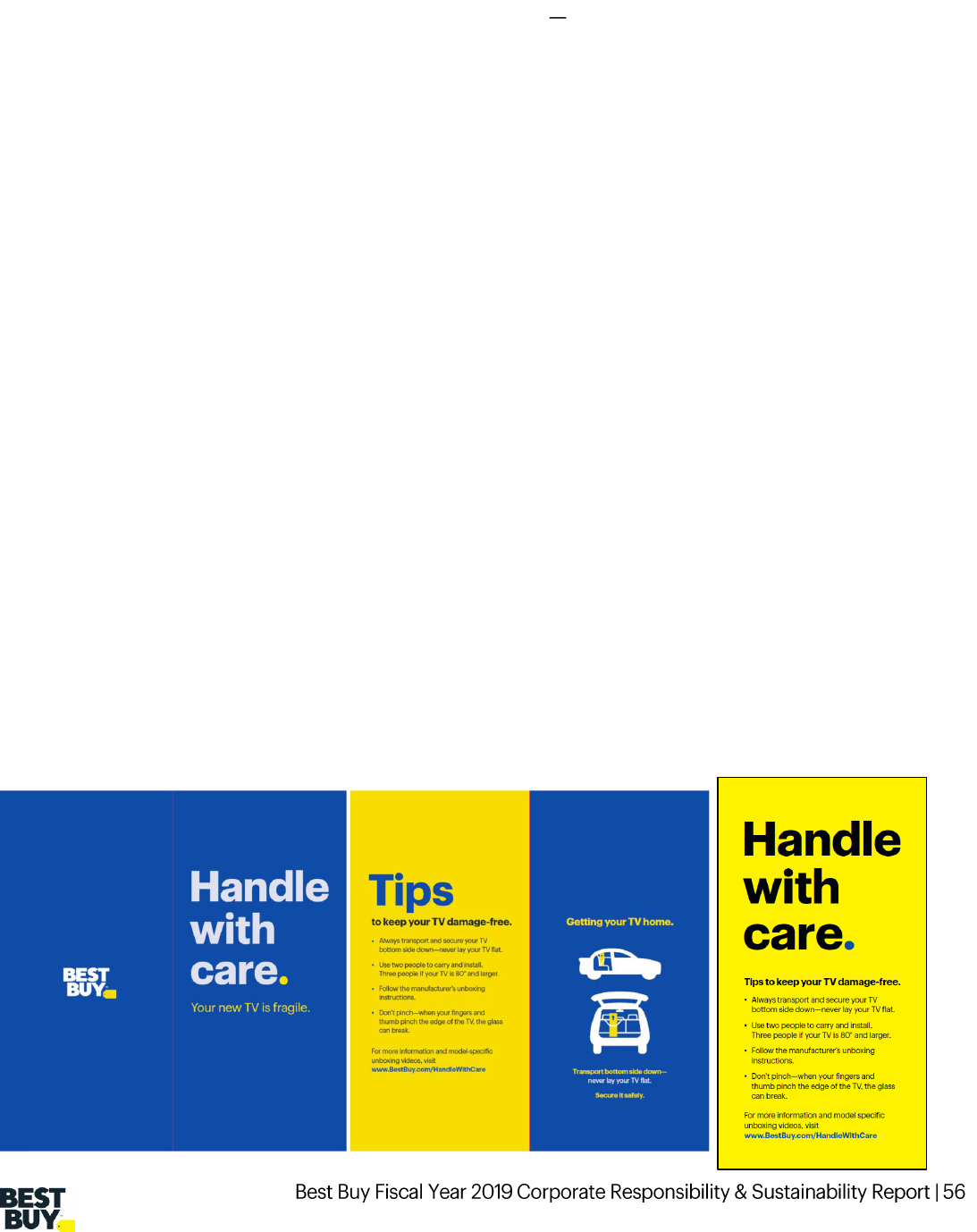
Circular economy – reduce, repair, reuse, recycle
At Best Buy, we aspire to drive forward the circular economy in which we keep resources (or products) in
use for as long as possible, extract the maximum value from the products while in use, then recover and
regenerate products and materials at the end of life.
Damage reduction.
Reducing damage that occurs before it gets to our customers is the first step for us in this cycle. We have
been working on initiatives to reduce damage for more than a decade, keeping products in the “use” phase
longer.
FY19 accomplishments include:
• Training employees and customers extensively on correct product handling to avoid damage;
• Rolling out anti-slip boards to assist in the safe installation of flat-screen TVs in stores without
causing damage;
• Placing additional safe-handling tips on all TVs 46” and larger to help employees educate
customers;
• Providing a dedicated website for customers detailing safe unboxing instructions
(BestBuy.com/HandleWithCare);
• Creating several new customer-facing videos with step-by-step instructions on correct unboxing to
avoid damage (with nearly 2 million views of current unboxing videos); and
• Adding more re-usable packing tools for large items such as flat-screen TVs and appliances in stores
– greatly reducing the risk of damage, resulting in waste.
We have taken a leadership role within the consumer electronics industry in creating standardized on- and
in-box instructions for correctly unboxing and handling TVs. We worked with our internal and external
partners to design these TV package labels, which have been implemented across brands to drive
consistent safe handling practices across all brands and visible to employees and customers.
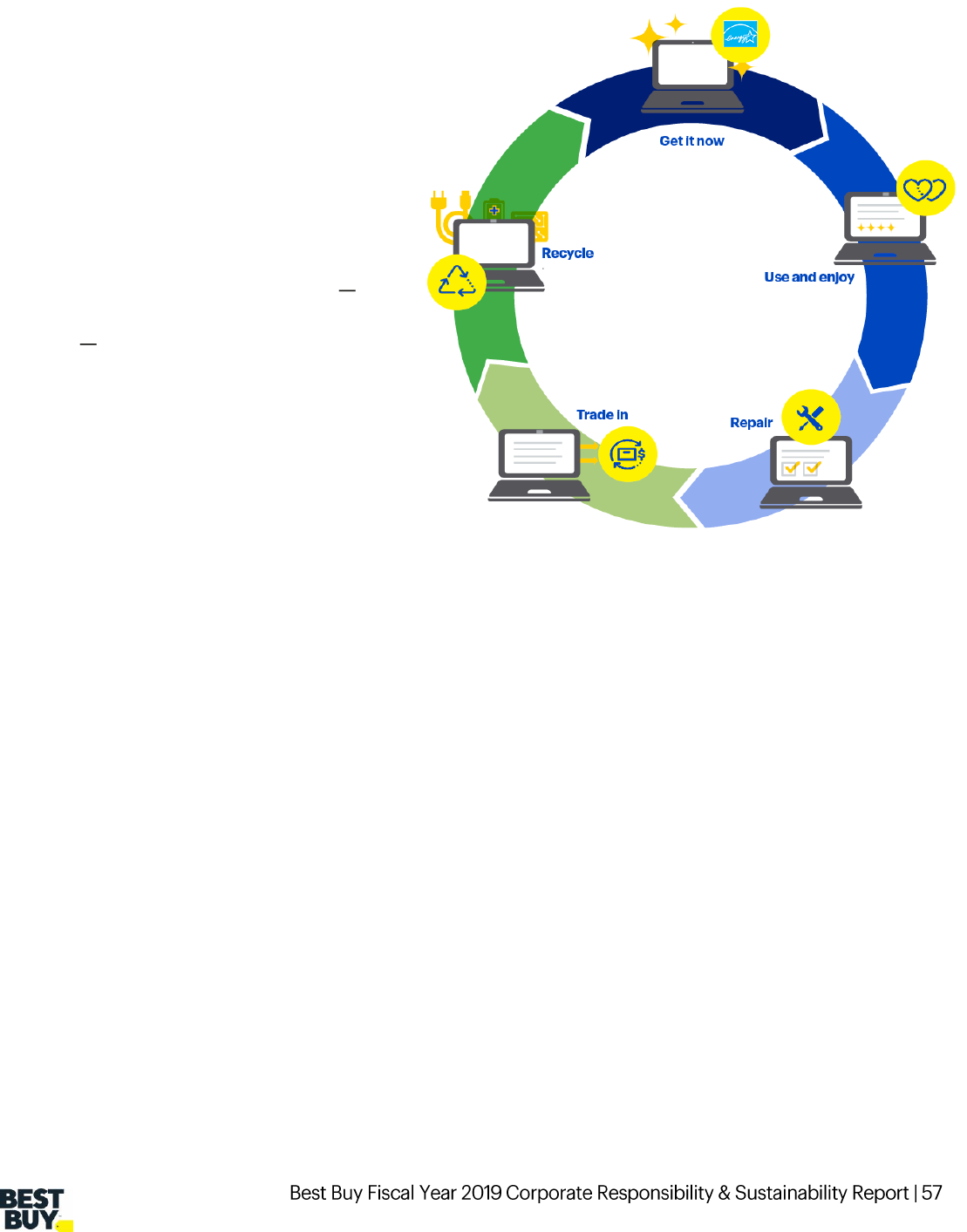
Repair.
We want to help customers extend the life of
their products, and we do this using the skills
of our more than 20,000 Geek Squad
Agents and repair partners. In FY19, Best Buy
repaired nearly 5 million devices, keeping
electronics in the “use” phase.
Every large-format Best Buy store houses a
Geek Squad Precinct, where products
from computers to mobile phones to digital
cameras are repaired. Our repair
technicians fix larger items like TVs and
appliances in customers’ homes. We also
operate repair facilities within our
distribution centers including Geek Squad
City, a facility near Louisville, Kentucky, that
encompasses nearly 4 acres and houses the
largest concentration of Agents anywhere.
Trade-In.
The Best Buy Trade-In Program is the core of our “reuse” phase of the product life cycle. In nearly all of our
stores, we offer customers a convenient way to get value for products that are still in good, working
condition. These products are typically re-sold in secondary markets, bringing a useful second life for
products that might otherwise sit idle in someone’s home, get recycled or end up in a landfill. Not only
does the Best Buy Trade-In Program enable customers to upgrade sooner, it gives an opportunity to those
who might not be able to afford brand-new technology.
Many companies offer phone trade-in options, but Best Buy goes beyond phones and includes laptops,
tablets, cameras, smart watches and video game consoles. We are constantly evaluating categories where
we can offer consumers value for electronics they no longer use.
In FY19, we helped customers trade in nearly 1 million devices.
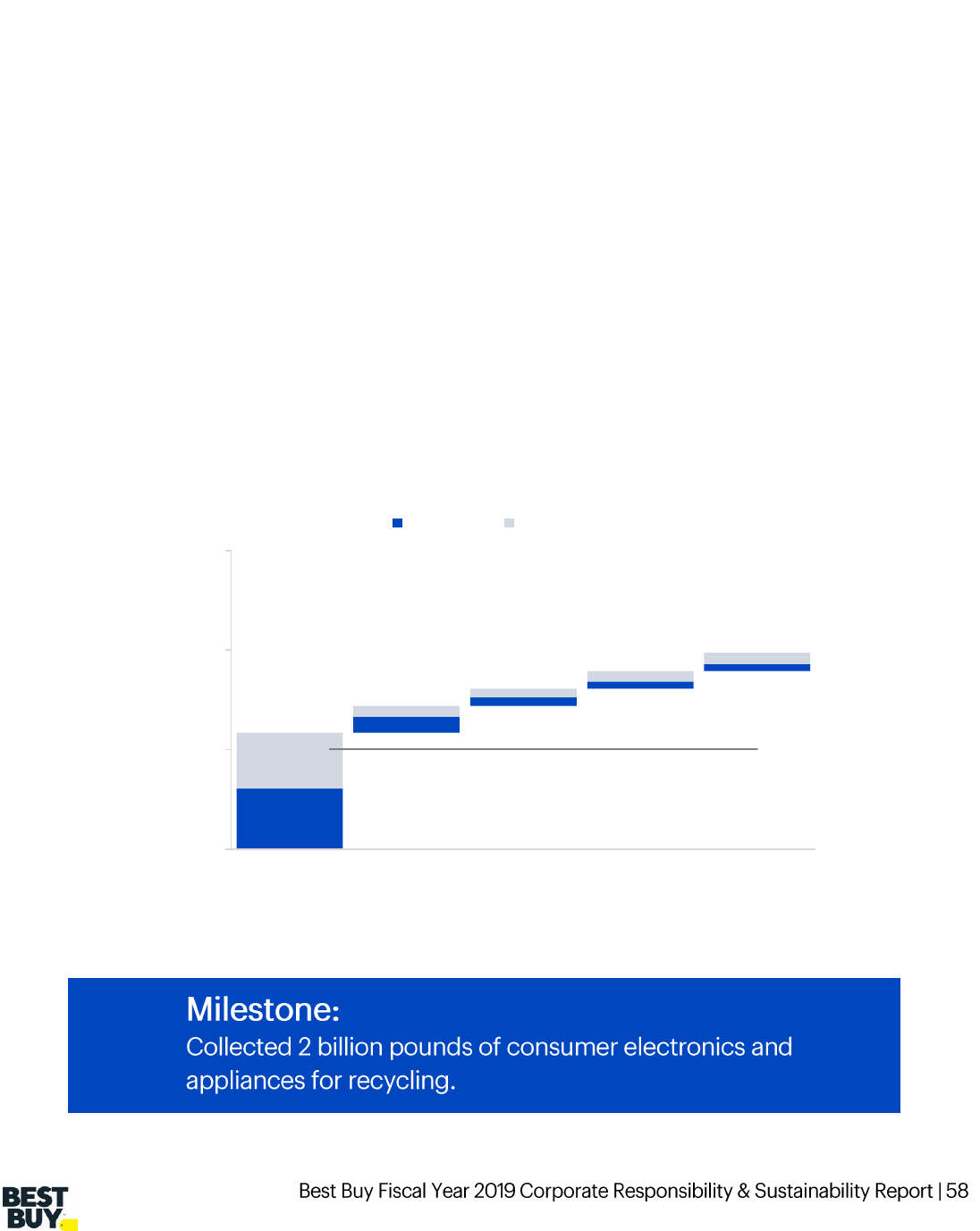
Electronics and appliance recycling: 2 billion pounds collected.
To address the global issue of electronic waste, we established our recycling program in 2009. We
continue to operate the most comprehensive consumer electronics takeback program in the U.S. And,
with 70 percent of the U.S. population living within 15 minutes of a Best Buy store, we are also the most
convenient place for recycling.
We are thrilled to have met a historic milestone of collecting 2 billion pounds of e-waste and appliances
for recycling as of June 2019. Our recycling program started as sporadic take back events in the parking
lots of our stores. With the clear customer need, we transformed the events into a sophisticated reverse
logistical program, with nearly 1,000 stores taking customers’ electronics every day our stores are open.
We are keeping electronics out of landfills, which benefits the environment and human health.
In FY19, the EPA awarded Best Buy a Sustainable Materials Management (SMM) Electronics Award for the
fifth straight year. The award commends superior corporate efforts to divert electronics from landfills by
working with third-party certified recyclers, as well as being transparent about recycling data and
performance.
FY15 Goal
0.0
1.0
2.0
3.0
FY2010-2015 FY2016 FY2017 FY2018 FY2019
Electronics Recycling
(billions of lbs by fiscal year)
Electronics Appliances
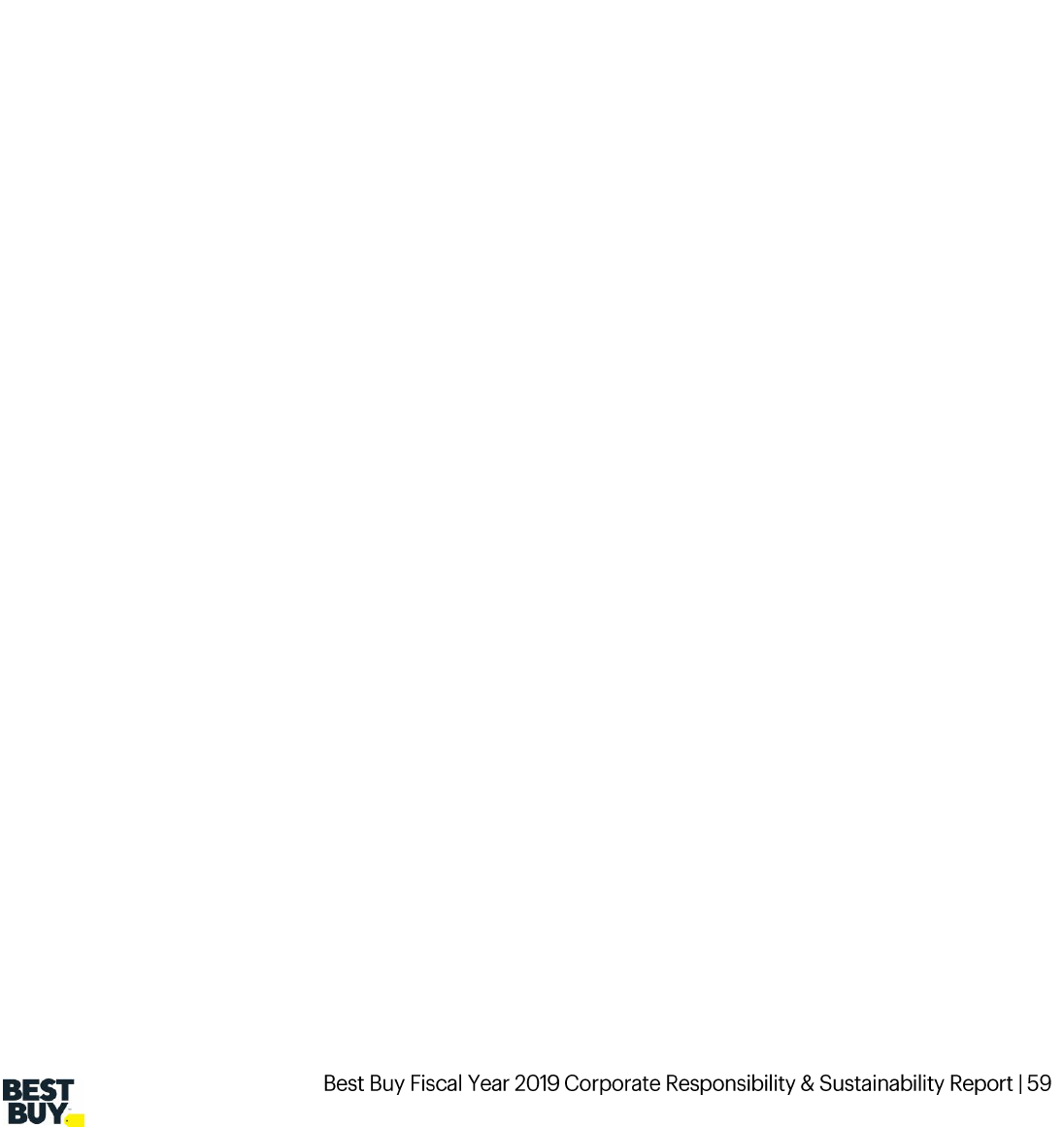
Our recycling standards.
We promote environmental stewardship by requiring all of our recycling service providers to adhere to
Best Buy standards and contractual obligations. Recyclers must pass a thorough environmental, safety and
downstream audit process before contracting with Best Buy, and they are subject to recurring onsite,
desktop and downstream assessments. In addition to our own standards, we require all electronics
recycling partners to maintain ISO 14001 certification, an OHSAS 18001 safety certification or industry
equivalent and be certified to eStewards
®
or R2
®
industry certifications.
We are working collaboratively with the industry to minimize the impacts of e-waste through our
participation in the following working groups:
• Responsible Business Alliance – E-Waste Taskforce; and
• R2 Technical Advisory Committee.
Customer data privacy and recycling.
Another priority for Best Buy, when recycling electronics, is ensuring that any customer data left stored on
such products is handled appropriately. To ensure that our customers’ data is protected, we have strict
data privacy protection requirements for our employees and our partners. We only work with pre-qualified
companies in our secondary markets, and we regularly audit our recycling partners to ensure compliance
with our data privacy standards. Visit BestBuy.com/Recycling for more information about how to recycle
electronics at Best Buy stores. (See page 37 for further discussion on customer data privacy.)
Sustainable packaging.
Best Buy aims to continuously improve the packaging of our private-label products. We are committed to
providing quality packaging with more sustainable attributes.
Our recent efforts include:
• Insignia paperboard packages contain at least 30 percent recycled material (when not corrugate or
cardboard); and
• Insignia packages use water-based coatings, which ensure the packages can be easily handled by a
recycling facility.
I want to be recycled.
Best Buy continues to partner with Keep America Beautiful and the Ad Council to encourage consumers to
recycle their shipping boxes in partnership with the “I Want To Be Recycled” campaign. Best Buy uses
these boxes when shipping from eight distribution centers and more than 1,000 store locations.
Already, our efforts to make boxes more appropriately sized have reduced material waste. We also ensure
that the cardboard we use is FSC-certified, meaning it comes from responsibly managed forests.

Protecting natural resources.
Waste diversion.
As part of our commitment to lessening our environmental impacts, we are seeking to achieve an 85
percent diversion rate for all U.S. operations by the end of FY20. We call it the Drive to 85.
Cardboard comprises 80% of the waste in our operations, so we focus our efforts in minimizing that
stream. We are executing a 3-year roadmap to replace or install new cardboard balers and compactors in
the majority of our stores. The new baler equipment has a smaller footprint and is flush against the wall,
which will allow us to install them in our stores that have limited warehouse space. We are installing 110
balers and 93 compactors, increasing stores’ ability to recycle.
In our distribution centers, we have seen a steady waste diversion rate above 80 percent. We attribute this
success to a lower employee turnover rate, dedicated labor and the installation of additional equipment,
such as polystyrene densifiers, which break apart and melt polystyrene into condensed cubes, taking up
less room on trucks. All of our distribution centers will have densifiers by FY20.
We have continued to face several challenges in FY19 that have affected our waste diversion rate,
including:
• Fewer material recovery facilities;
• Regulations limiting waste sent to China; and
• Lower value of cardboard and other commodities.
Looking forward, we are exploring new ways to manage our waste, including:
• Zero waste facilities; and
• New technologies and equipment to reduce hauls, driving down cost and building efficiencies.
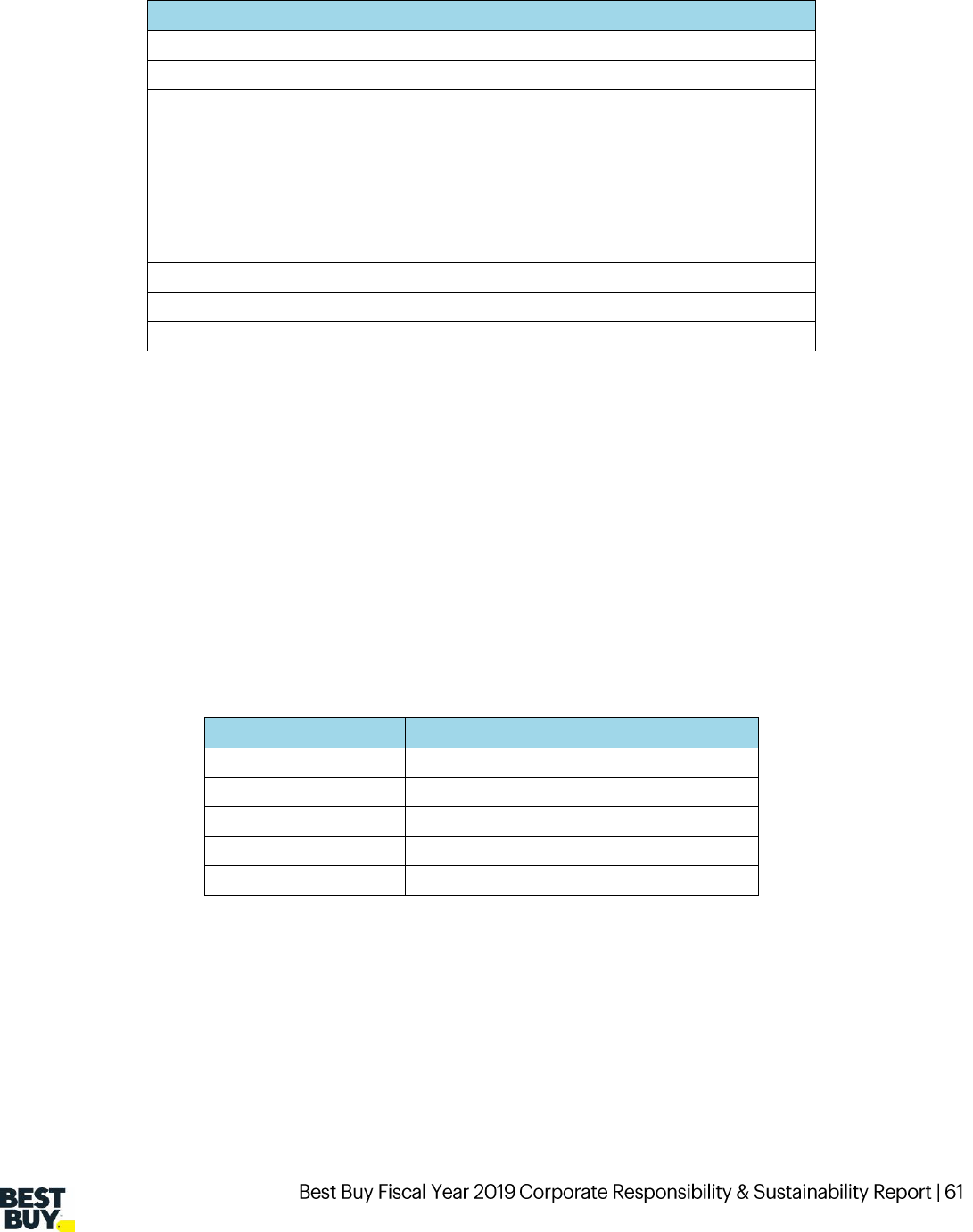
Waste Figures (FY19)
Waste Type
Pounds
Hazardous waste volume
47,879 lbs.
Universal waste (lamps, batteries) volume
176,323 lbs.
Non-hazardous waste recycled
-Paper/cardboard/pallets
-Plastic
-Metal
-Single stream
-Other
99M lbs.
5.4M lbs.
927K lbs.
9.1M lbs.
500K lbs.
Non-hazardous waste landfilled
61.5M lbs.
Non-hazardous waste composted
45K lbs.
Non-hazardous waste diversion rate
65%
In its disposal of hazardous materials, Best Buy utilizes authorized methods, including recycling,
incineration and use of authorized landfills. Best Buy’s service providers determine which disposal method
to use by referring to hazardous waste management methods conversion tables. The conversion tables
outline approved disposal methods by specific hazardous waste code.
Water reduction.
In calendar year 2018, we used about 1.2 million cubic meters of water in our U.S. operations. As with other
environmental resources, we seek to minimize our impact through building design, operational monitoring
and usage reduction programs.
Calendar Year
Water Use
2014
1.5 million cubic meters
2015
1.4 million cubic meters
2016
1.4 million cubic meters
2017
1.2 million cubic meters
2018
1.2 million cubic meters
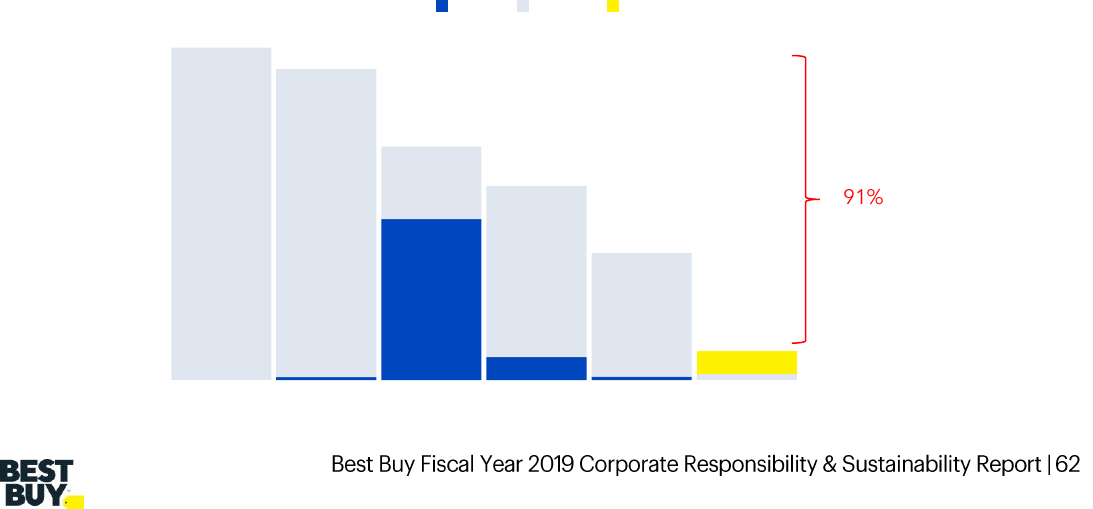
Single use bags.
For retailers, single use bags are a complex operational issue. We are working toward solutions to reduce
single use bags in our stores, taking into account environmental impacts, cost and customer experience. In
2016, we reduced the number of plastic bag sizes from seven to two (three during the holiday season),
which has reduced the demand for bags. From FY18 to FY19 alone, our plastic bag usage decreased 5
percent. Additionally, the plastic bags we use contain 5-10 percent recycled content. In FY20, we will
continue to actively explore opportunities to further reduce the environmental impact of bags we use.
Paper procurement.
As part of our environmental stewardship, we are committed to the protection and efficient use of the
world’s resources, including the forests used for the paper we procure.
As part of our procurement requirements, we:
• Require 100 percent of paper procured to be certified to an internationally-recognized forestry
standard;
• Acquire chain of custody statements for all insert paper; and
• Maintain at least 30 percent recycled content in our office paper.
Since FY14, we have reduced our insert paper volume by 91 percent due to our transition to digital
marketing. Our full Paper Procurement Corporate Statement can be found at
Corporate.BestBuy.com/Sustainability.
31
4
64
59
14
33
24
4
FY14 FY15 FY16 FY17 FY18 FY19
Insert Paper Volume
(Short Tons by Fiscal Year, Thousands)
FSC PEFC SFI
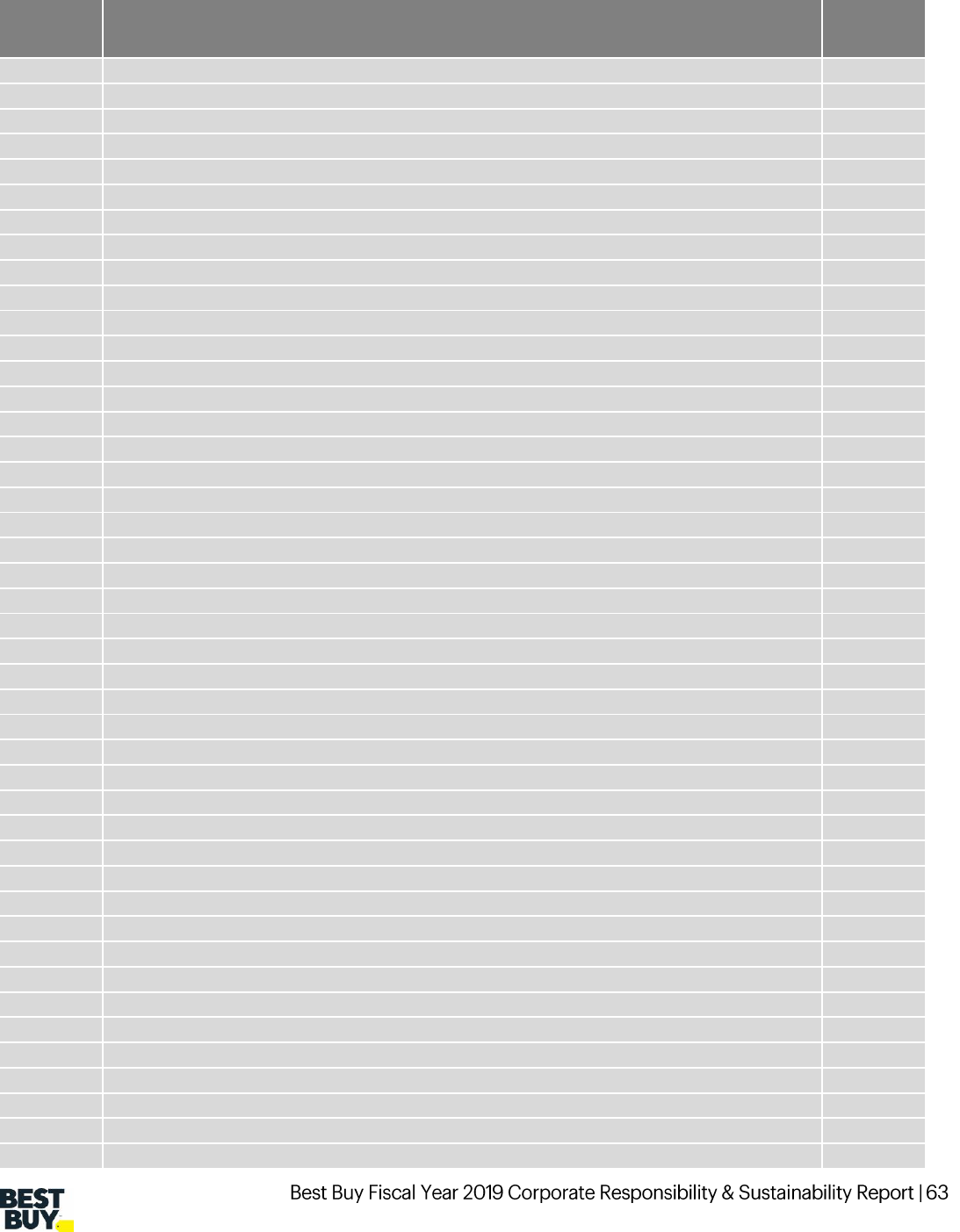
GRI Content Index
GRI
Number
Disclosure Title
Page
102-1
Name of the organization
1
102-2
Activities, brands, products and services
3
102-3
Location of headquarters
3
102-4
Location of operations
3
102-5
Ownership and legal form
See 10-K
102-6
Markets served
See 10-K
102-7
Scale of the operation
See 10-K
102-8
Information on employees and other workers
3
102-9
Supply chain
6
102-10
Significant changes to the organization and its supply chain
n/a
102-11
Precautionary Principle or approach
n/a
102-12
External initiatives
5
102-13
Membership of associations
11
102-14
Statement from senior decision-maker
2
102-15
Key impacts, risks and opportunities
6
102-16
Values, principles, standards and norms of behavior
14
102-17
Mechanisms for advice and concerns about ethics
14
102-18
Governance structure
13
102-19
Delegating authority
13
102-20
Executive-level responsibility for economic, environmental and social topics
13
102-21
Consulting stakeholders on economic, environmental and social topics
10
102-40
List of stakeholder groups
10
102-41
Collective bargaining agreements
n/a
102-42
Identifying and selecting stakeholders
10
102-43
Approach to stakeholder engagement
10
102-44
Key topics and concerns raised
8
102-45
Entities included in the consolidated financial statements
See 10-K
102-46
Defining report content and boundaries
12
102-47
List of material topics
8
102-48
Restatements of information
n/a
102-49
Changes in reporting
n/a
102-50
Reporting period
12
102-51
Date of most recent report
12
102-52
Reporting cycle
12
102-53
Contact point for questions regarding the report
12
102-54
Claims of reporting in accordance with the GRI Standards
12
102-55
GRI content index
63-64
102-56
External assurance
12
201-2
Financial implications and other risks and opportunities due to climate change
49
205-2
Communication and training about anti-corruption policies and procedures
14
302-1
Energy consumption within the organization
51
302-3
Energy intensity
51
302-4
Reduction of energy consumption
51
302-5
Reductions in energy requirements of products and services
52
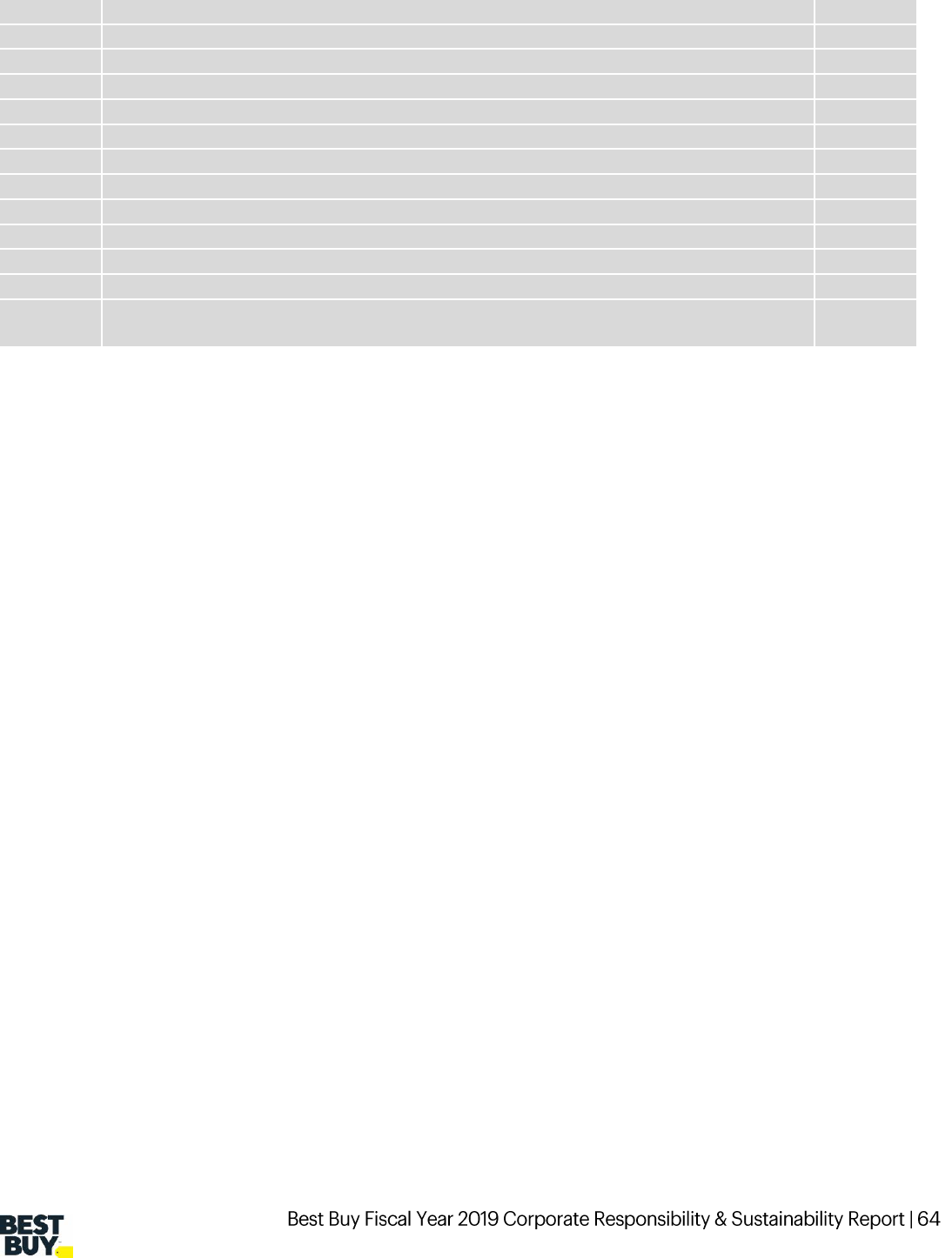
303-1
Water withdrawal
61
305-2
Indirect (Scope 2) GHG emissions
51
305-3
Other indirect (Scope 3) GHG emissions
51
305-4
GHG emissions intensity
51
305-5
Reduction of GHG emissions
51
306-2
Waste by type and disposal method
61
307-1
Non-compliance with environmental laws and regulations
48
401-1
Employee turnover
29
405-1
Diversity of governance bodies and employees
31-34
412-1
Operations that have been subject to human rights reviews or impact assessments
35
415-1
Political contributions
15-16
416-1
Assessment of the health and safety impacts of product and service categories
36
418-1
Substantiated complaints concerning breaches of customer privacy and losses of
customer data
37-38
